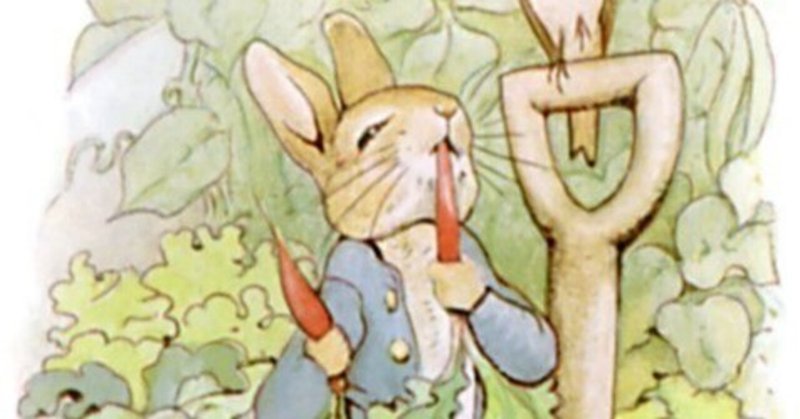
Peter Rabbit作品集
はじめに
2022年に出版120周年を迎えたピーターラビット。1893年にBeatrix PotterがPotter自身が教わった3歳年上の家庭教師Annie Carter Mooreの息子(5歳のNoel Moore)が入院しているのを知り、励ますために、4匹のウサギが登場するストリーの絵手紙を送っている。後に、Annieから、この手紙で絵本が作れるのではないかと言われ、絵と話を膨らまして絵本を制作したが、出版社がつかず、1901年に250部を自費出版した。手のひらサイズの本で、42枚の白黒のイラストが使われた。その後、多くの出版社に断れた後に、Frederick Warne &Coが1902年に初版を出した。出版社の要求に従い絵の数は減らし、すべての絵に色をつけたが、それでも、30枚近くの絵が使われている。他方で、サイズについては、出版社から印税が少なくなると言われても子供に馴染む手帳ほどの大きさにこだわった。出版は大成功で、1903年には人形やボードゲーム(すごろくのようなもの)が誕生するほどの人気となった。
英文テキストと絵は、The Project Gutenberg eBook of The Tale of Peter Rabbit, by Beatrix Potterから、ライセンス条件に沿って引用してる。ちなみに、絵の著作権は、日本では2004年5月21日に満了している。邦訳は、青空文庫の「あなうさピーターのおはなし(大久保ゆう訳)」。
Beatrix Potter(ビアトリクス・ポター)
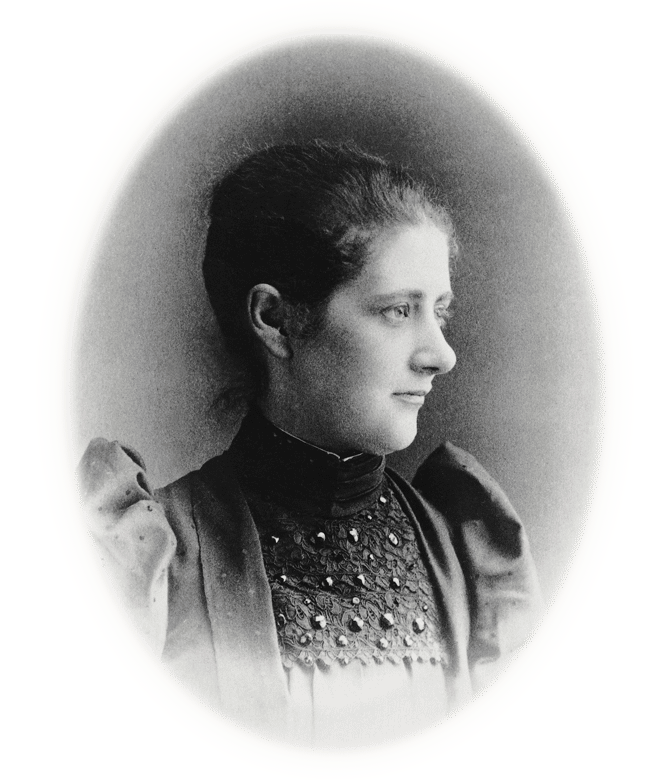
1866年に、Kensington(Greater London)にて上位中産階級に生まれた。当時の裕福な家庭では、多くの使用人を抱え、それを執事が取り仕切り、乳母(家庭教師)が教育を含めて子どもの面倒を見ました。悪い人間に接しないようにとの考えがあった。6歳下の弟とともに、三回の子ども部屋で過ごし、親と接する時間もほとんどなかった。弟は、6歳で学校の寄宿舎へ入りましたが、Beatrixは学校に通うことなく孤独な生活を送っていた。
スケッチが好きで、9歳の時の最初のスケッチブックには、すでにウサギが描かれてた。14歳のころからは暗号で秘密の日記をつけていた。両親も絵を描くことが好きだったそうで、子どもたちに絵画のすばらしさを語り励ました。Beatrixのために、絵の教師を雇っていた。当時の金持ちの娘の教養として「絵が上手に描ける」は重要な習い事の一つだった。16歳の時に初めて展覧会に連れていかれて、強い感動を受けたと日記に記されてる。
17歳直前に、Annie Carterが家庭教師となる。Annieは、独語、ラテン語、算術、油彩画などを教える。Annieは3歳しか違わなかったため、良い信頼関係を築いていく。Annieは、2年後に結娘で家庭教師を止めることとなる。家庭教師から教わる時間から解放され、自宅から徒歩で行けるサウス・ケンジンク"トン博物館(現在のロイヤル・アルバータ博物館)や公園にスケッチに出かける。緻密な観察を行った作品が多数ある。
1888年、ペットショップにてウサギを購入。Benjamin Bouncerと名づける。このウサギをモデルとして多数の素描を描き、その中の6枚はHildesheimer & Faulkner社が買い取り、クリスマス、新年祝いカードとして使われた。
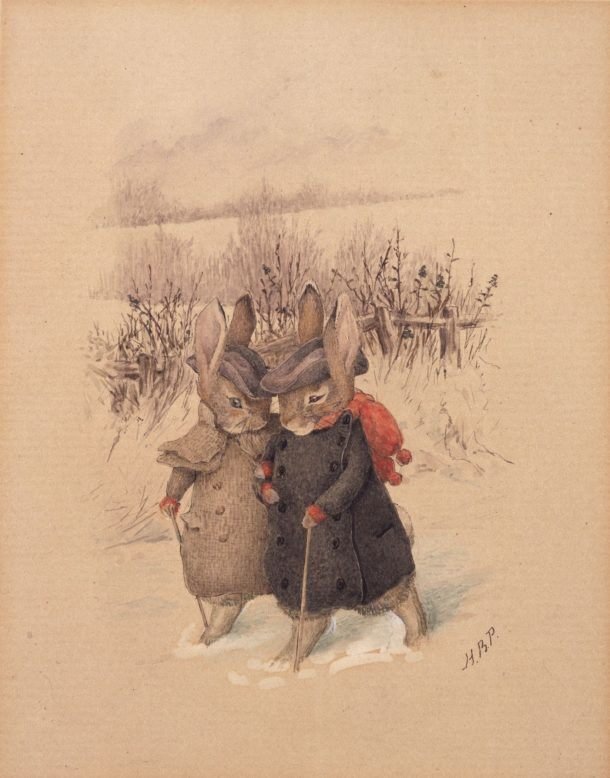
1893年の夏、Annieの息子のNoelが病気と聞き、当時、27歳だったBeatrixはペットショップでウサギを購入しピーターラビットと名づけ、これを主人公とした絵手紙を送ることにする。1890年、Annieは、この絵手紙をもとに子供向けの本をつくることを提案する。これが後のピーターラビットの物語へと繋がる。
ロンドンでは不自由な生活を送っていたBeatrixではあったが、上流の中流階級の家族は夏には様々な田舎に、使用人も連れて旅行に行っていた。湖水地方はBeatrixのお気に入りの場所となり、何度も訪問している。本の出版収入で、1905年に湖水地方に自分の家を購入することとなった。
また、この年、編集者のNorman Warne(Warneさん兄弟の3番目)がBeatrixに求婚した。しかし、両親が結婚に反対したために、婚約を秘密にせざるを得ませんでした。ところが、Normanはその一か月後に病死した。
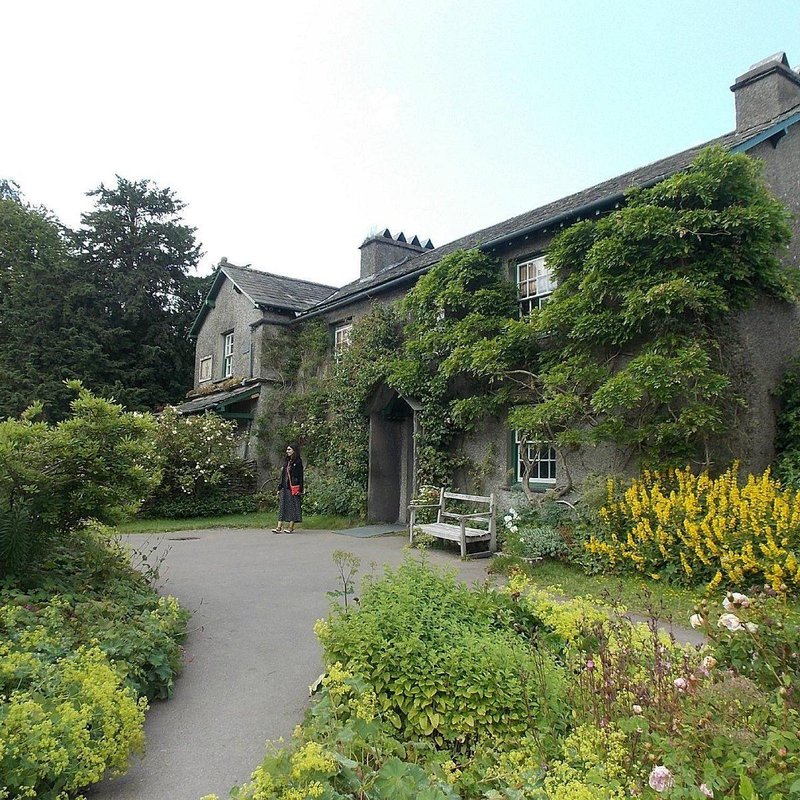
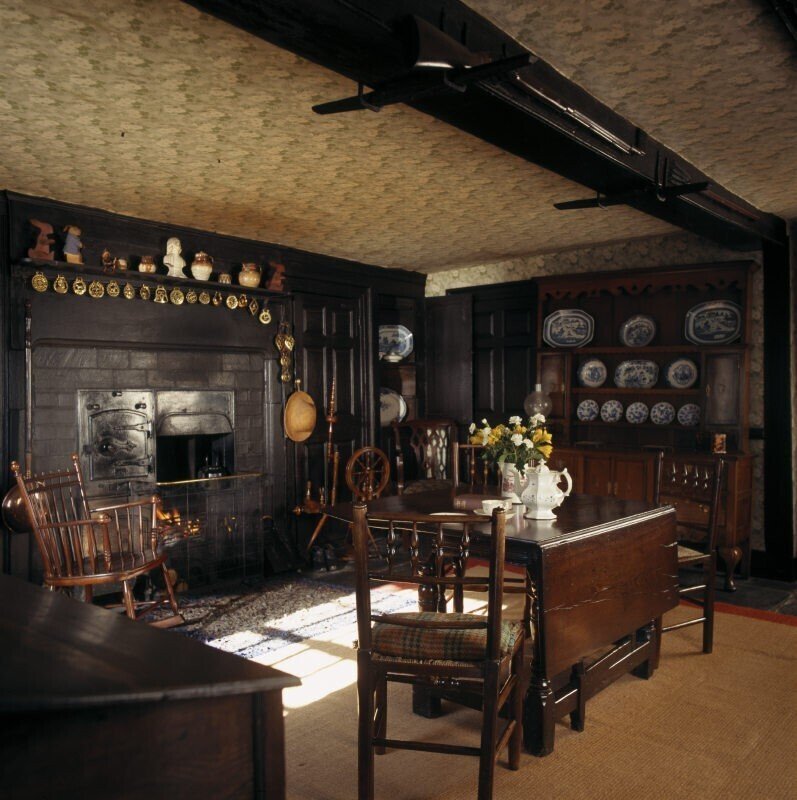
失意の中でBeatrixは、絵本の印税と母方の伯母からの遣産で湖水地方のニア・ソ―リー村にある、HillTop農場を購入する。そこで農場生活の魅力に惹かれていく。
毎年のように出版する新作がみなベストセラーとなり、その印税で近隣の土地家屋を購入していく。その際、相談していた6歳年下の弁護士William Heelisと気があい、有情から受情へと変わる。Williamからの求婚を喜こんで承諾するが、また、親が猛反対する。しかし、弟のバートラムの応援によりついに親の許しを得て、1913年、47歳にして結婚し、湖水地方に居を構える。
農業に一層の力を注ぎ、土地の購入を続け、湖水地方の大地主となる。慈善事業にも積極的に 「ピーターラビット基金」を設けて資金集めを付い、小児病院にベッドを寄付するICAA(International Children's Aid Association)の活動を助ける。また、人種、国籍、宗教の差別なく心身ともに健全かつ社会に貢献する女性の育成を目的とする「ガールガイド」の活動に関わる。
1943年12月22月死去。散骨されたが場所は秘密にされた。土地建物は、すべて「ナショナルトラスト」に遺贈された。4300エーカー(17平方キロ=東京ドーム5200個分、皇居7つ分)。16の農湯コラージ,ハウス20戸。当時、個人としては最大の寄贈であった。
ポターの作品
Beatrixは、子どもの頃、不思議の国のアリスやUnlcle Remus(リーマスおじさん:アフリカ系アメリカ人にまつわる民話の語り手であり主人公であるフィクションの名前)の本を熱心に読んでいた。父は、 Caldecottの"A Frog he would a-wooing go(恋を探しに出かけたカエル)"のデッサンをプレゼントしている。Beatrixの作品はCaldecottの影響も受けているということになる。
"The Tale of Peter Rabbit"の成功により、続編が、毎年のようにでている。いずれも、動物を擬人化したストリーだが、話の内容に人間臭さを感じさせるところがあり、語りはクールであり、決してハッピーエンドではない。階級社会や風習に対する風刺や揶揄もこめられているが、かといって、教訓を垂れて締めくくるものでもない。
村岡花子は、ピーターラビットの話は、「子どもに媚びず突き放して書いてあるところに感銘を受けた」と書いている。「動物を生物学的に正しく、そして物事を客観的に書いてあって、それを子どもがそれほど好きなのが、はじめ、わからないきがありました・・・じっくり読んでいくうちに・・・その中にユーモアや皮肉もたっぷり含まれていて、それがきびきびした散文でっ書かれている・・自然にくすくす笑えてしまうようなところがある。」「これはイギリス人でなければ生まれないような本・・・日本人だともっと情緒的になってしまう・・そういうところがまったくなく、幼児の文学を成り立たせることができることに、本当に驚いた」と評している。
『ピーターラビットのおはなし』(The Tale of Peter Rabbit, オリジナルの私費出版は1901、商業出版は1902)
『りすのナトキンのおはなし』(The Tale of Squirrel Nutkin, 1903)
『グロースターの仕たて屋』(The Tailor of Gloucester, 1903)
『ベンジャミンバニーのおはなし』(The Tale of Benjamin Bunny, 1904)
『2ひきのわるいねずみのおはなし』(The Tale of Two Bad Mice, 1904)
『ティギーおばさんのおはなし』(The Tale of Mrs. Tiggy-Winkle, 1905)
『パイがふたつあったおはなし』(The Tale of the Pie and the Patty-Pan, 1905)
『ジェレミー・フィッシャーどんのおはなし』(The Tale of Mr. Jeremy Fisher, 1906)
『こわいわるいうさぎのおはなし』(The Story of A Fierce Bad Rabbit, 1906)
『モペットちゃんのおはなし』(The Story of Miss Moppet, 1906)
『こねこのトムのおはなし』(The Tale of Tom Kitten, 1907)
『あひるのジマイマのおはなし』(The Tale of Jemima Puddle-Duck, 1908)
『ひげのサムエルのおはなし』(The Tale of Samuel Whiskers, 1908)
『フロプシーのこどもたち』(The Tale of the Flopsy Bunnies, 1909)
『「ジンジャーとピクルズや」のおはなし』(The Tale of Ginger and Pickles, 1909)
『のねずみチュウチュウおくさんのおはなし』(The Tale of Mrs. Tittlemouse, 1910)
『カルアシ・チミーのおはなし』(The Tale of Timmy Tiptoes, 1911)
『キツネどんのおはなし』(The Tale of Mr. Tod, 1912)
『こぶたのピグリン・ブランドのおはなし』(The Tale of Pigling Bland, 1913)
『アプリイ・ダプリイのわらべうた』(Appley Dapply's Nursery Rhymes, 1917)
『まちねずみジョニーのおはなし』(The Tale of Johnny Town-Mouse, 1918)
『セシリ・パセリのわらべうた』(Cecily Parsley's Nursery Rhymes, 1922)
『こぶたのロビンソンのおはなし』(The Tale of Little Pig Robinson, 1930)
背景となる歴史・世相は、1901年にヴィクトリア女王が死去し、産業革命にり繁栄をとげたパックス・ブリタニカの時代が終焉を迎えようとする時代となる。中流階級が育ちBeatrixはその上位の階級に所属していた。日本との関係においては、1902年には、ロシアの南下政策に対抗するために日英同盟が締結されている。このころ、急速に興隆したドイツとの対立が激化し、1914年には第一次戦争が勃発する(~1918年)。また、アイルランドの独立の機運がたかまり1920年にアイルランドの自治が認められる(アイルランド統治法)。
『ピーターラビットのおはなし』(The Tale of Peter Rabbit)(1901,1902)
"The TALE OF PETER RABBIT"『あなうさピーターのはなし』
By BEATRIX POTTER (訳:大久保ゆう)
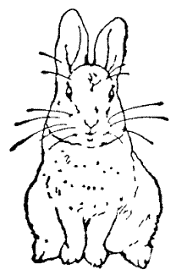
FRECERICK WARNE, First Published 1902
ーーーーーーーーーーーーーーーーーー
【1ページ】
Once upon a time there were four little Rabbits, and their names were— Flopsy,
Mopsy,
Cotton-tail,
and Peter.
むかしむかし あるところに 4ひきの こうさぎが おりました。 なまえは それぞれ
フロプシー、
モプシー、
カトンテル、
ピーターです。
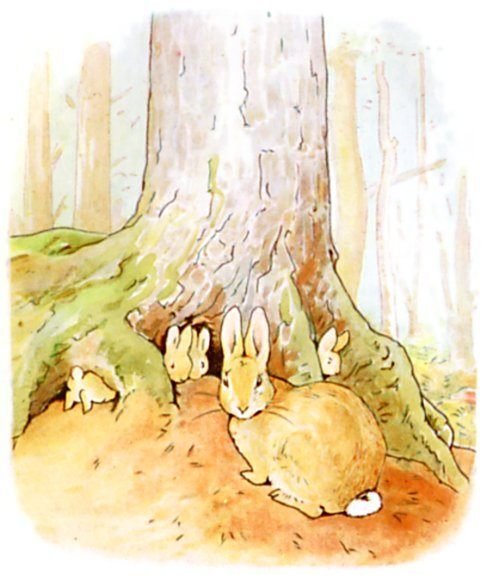
They lived with their Mother in a sand-bank, underneath the root of a very big fir-tree.
4ひきは おかあさんと いっしょに とってもおおきな モミのきの したにある あなのなかに すんでいました。
【2ページ】
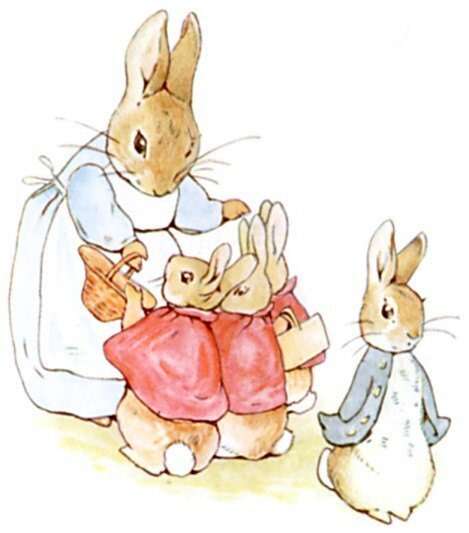
'Now my dears,' said old Mrs. Rabbit one morning, 'you may go into the fields or down the lane, but don't go into Mr. McGregor's garden: your Father had an accident there; he was put in a pie by Mrs. McGregor.'
あるひの あさ、 あなうさママが いいました。
「さあ おまえたち、 のはらのなかや こみちのさきで あそんでらっしゃい。 でも、 マグレガーおじさんの おにわには いっちゃダメよ。 むかし おとうさんが そこで ひょんなことから マグレガーおばさんに つかまって パイに されたんだから。」
【3ページ】

'Now run along, and don't get into mischief. I am going out.'
「いってらっしゃい、 きを つけるのよ。 おかあさん、 るすに してるから。」
【4ページ】
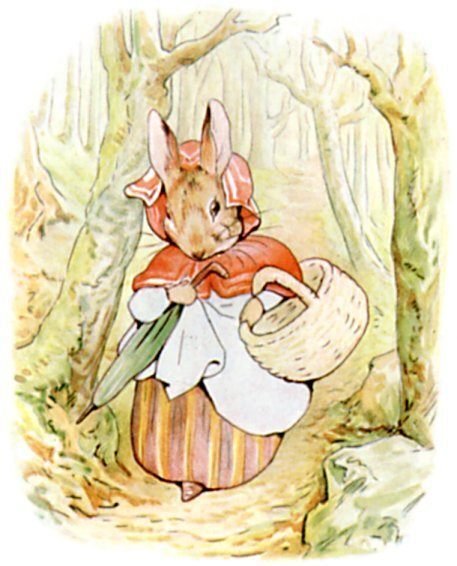
Then old Mrs. Rabbit took a basket and her umbrella, and went through the wood to the baker's. She bought a loaf of brown bread and five currant buns.
それから あなうさママは かごと かさを てにもって、 もりの むこうの パンやさんへ むかいました。 かったのは 1きんの くろパンと ぶどうパンを 5つです。
【5ページ】

Flopsy, Mopsy, and Cotton-tail, who were good little bunnies, went down the lane to gather blackberries:
フロプシーと モプシーと カトンテルは とっても いいこでしたので、 こみちを くだって クロイチゴつみに でかけました。
【6ページ】
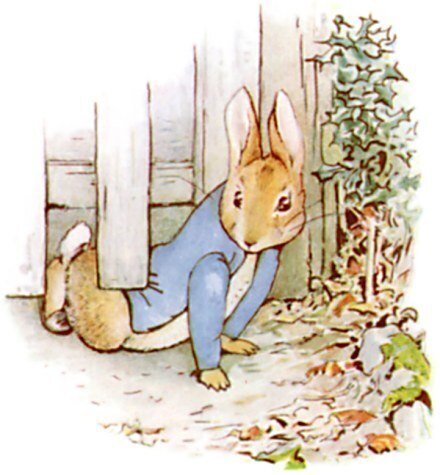
But Peter, who was very naughty, ran straight away to Mr. McGregor's garden, and squeezed under the gate!
けれども ピーターは ひどく やんちゃでしたので、 そのまま マグレガーおじさんの おにわに いちもくさん、 いりぐちの さくの したを むりくり くぐりぬけたのです!
【7ページ】

First he ate some lettuces and some French beans; and then he ate some radishes;
すぐさま レタスと インゲンを かじって おまけに ハツカダイコンまで。
【8ページ】
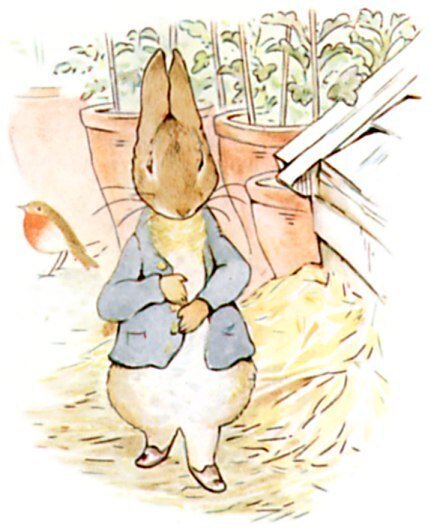
And then, feeling rather sick, he went to look for some parsley.
すると どうも きぶんが わるくなったので おくすりの パセリを さがすことに しました。
【9ページ】
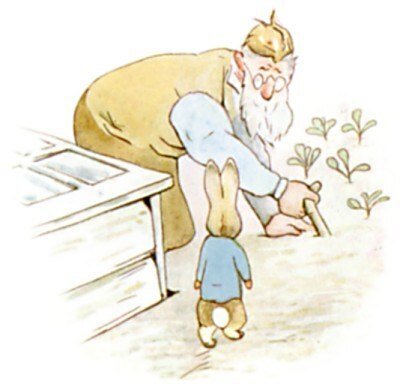
But round the end of a cucumber frame, whom should he meet but Mr. McGregor!
ところが キュウリの なえばこを まわったところで でくわしたのが、 なんと マグレガーおじさん!
【10ページ】
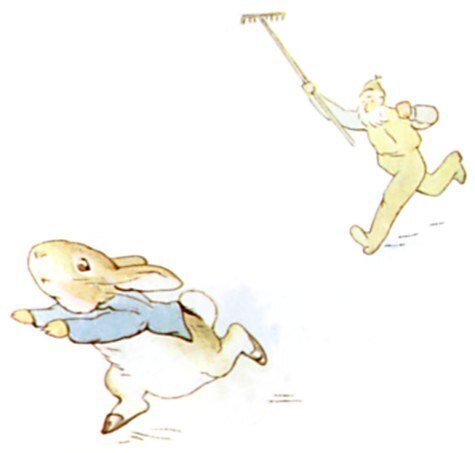
Mr. McGregor was on his hands and knees planting out young cabbages, but he jumped up and ran after Peter, waving a rake and calling out, 'Stop thief!'
マグレガーおじさんは よつんばいで キャベツのなえを うえていたのですが、 とびあがって ピーターを おいかけます。 くわを ふりふり さけぶのです。 「まてえ、 ぬすっと!」
【11ページ】
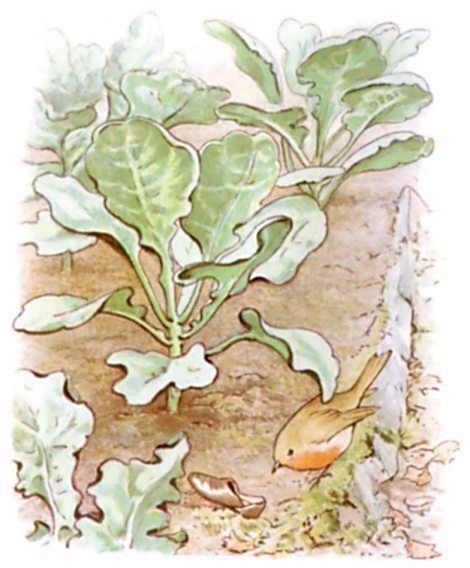
Peter was most dreadfully frightened; he rushed all over the garden, for he had forgotten the way back to the gate.
He lost one of his shoes among the cabbages, and the other shoe amongst the potatoes.
ピーターは もう びっくりして ふるえあがって にわじゅうを かけまわりました。 それというのも いりぐちが どこにあったのか わからなくなったのです。
しかも キャベツばたけで くつを かたっぽ、 ジャガイモばたけで もうかたっぽを なくしてしまいました。
【12ページ】
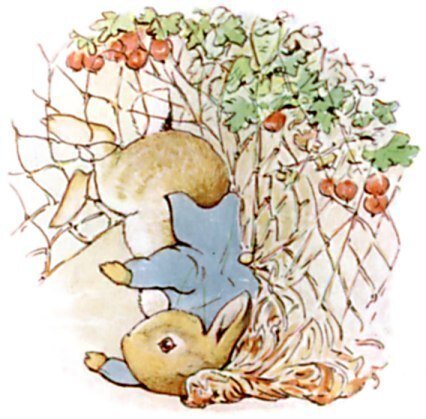
After losing them, he ran on four legs and went faster, so that I think he might have got away altogether if he had not unfortunately run into a gooseberry net, and got caught by the large buttons on his jacket. It was a blue jacket with brass buttons, quite new.
くつも ないので よつあしで はしると ぐんぐん はやくなって、 うまくいけば にげられたと おもうのですが、 うんわるく スグリの あみに つっこんでしまい、 うわぎの おおきな ボタンが ひっかかってしまったのです。 ちなみに あおの うわぎで しんちゅうの ボタンつき おろしたての ものでした。
【13ページ】
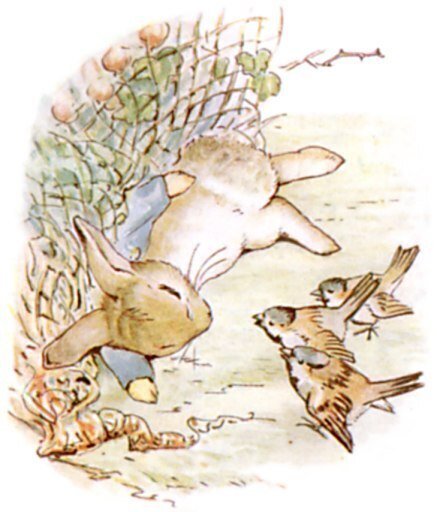
Peter gave himself up for lost, and shed big tears; but his sobs were overheard by some friendly sparrows, who flew to him in great excitement, and implored him to exert himself.
ぼくは もう しぬんだな、 ピーターは おおつぶの なみだを ながしました。 でも そのなきごえが たまたま やさしい すずめたちにも きこえて、 そして あわてて そばに とんできて あきらめないでと いうのです。
【14ページ】
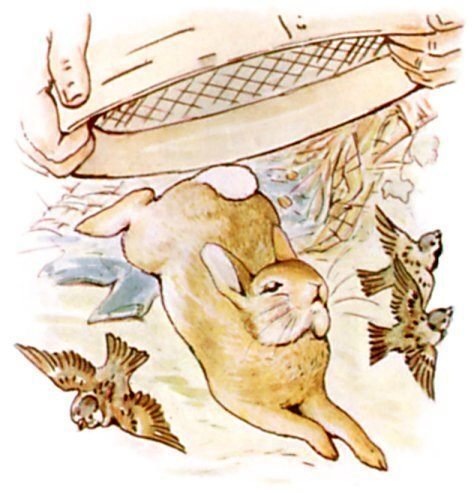
Mr. McGregor came up with a sieve, which he intended to pop upon the top of Peter; but Peter wriggled out just in time, leaving his jacket behind him.
マグレガーおじさんが やってきて もってきた ふるいを ピーターの うえから ぱっと かぶせようと しましたが、 ピーターは すんでのところで うわぎを ぬぎぬぎ あとに のこして にげだしました。
【15ページ】
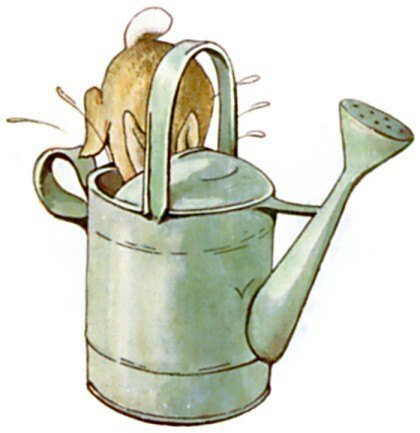
And rushed into the tool-shed, and jumped into a can. It would have been a beautiful thing to hide in, if it had not had so much water in it.
そして ものおきごやに かけこんで じょうろのなかに とびこみました。 とってもいい かくればだと おもったのに みずが たくさん はいっているなんて。
【16ページ】
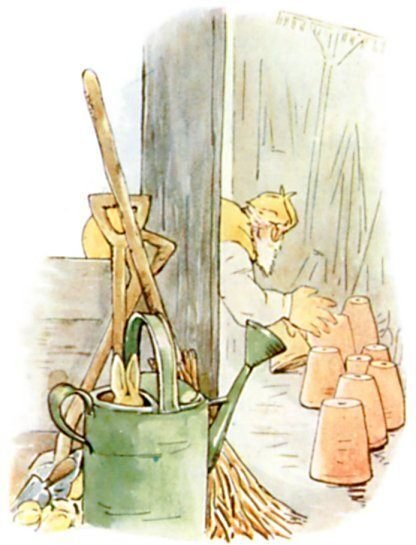
Mr. McGregor was quite sure that Peter was somewhere in the tool-shed, perhaps hidden underneath a flower-pot. He began to turn them over carefully, looking under each.
Presently Peter sneezed—'Kertyschoo!' Mr. McGregor was after him in no time.
マグレガーおじさんには まるわかりでした。 ピーターは ぜったい ものおきごやの どこかに いる。 もしかすると うえきばちの なかかもしれない。 やがて そろりと もちあげて ひとつずつ なかを みるのです。
まさに そのとき ピーターが くしゃみを ――「はっくしゅん!」 マグレガーおじさんが たちまち ちかづきます。
【17ページ】

And tried to put his foot upon Peter, who jumped out of a window, upsetting three plants. The window was too small for Mr. McGregor, and he was tired of running after Peter. He went back to his work.
あしで ふみつけられそうに なりましたが、 ピーターは まどの そとへと とびだして ついでに うえきを 3つ たおしました。 まどが ちいさすぎたので、 マグレガーおじさんも ピーターを おいかけるのを あきらめて のらしごとへ もどることに しました。
【18ページ】

Peter sat down to rest; he was out of breath and trembling with fright, and he had not the least idea which way to go. Also he was very damp with sitting in that can.
After a time he began to wander about, going lippity—lippity—not very fast, and looking all round.
ピーターは ほっとして こしを おちつけます。 いきも きれぎれ、 こころも ぶるぶる、 どっちへいったら いいのか ちっとも わかりません。 しかも じょうろのなかに いたので もう ずぶぬれです。
しばらくして うろちょろ しはじめましたが、 とぼとぼ ―― とぼとぼ ―― ゆっくりと あるいて きょろきょろ。
【19ページ】

He found a door in a wall; but it was locked, and there was no room for a fat little rabbit to squeeze underneath.
An old mouse was running in and out over the stone doorstep, carrying peas and beans to her family in the wood. Peter asked her the way to the gate, but she had such a large pea in her mouth that she could not answer. She only shook her head at him. Peter began to cry.
かべに ドアを みつけましたが、 かぎが しまっていて したを くぐりぬけようにも ぷっくりした こうさぎの とおる すきまは ありません。
おかあさんねずみが いしの とぐちを はいったり でたりして きのなかで まっている かぞくに おまめを はこんでいます。 ピーターは そのねずみに いりぐちへの いきかたを ききましたが、 くちに おおきな おまめを くわえていましたので ねずみは なにも へんじが できません。 ただ くびを ふるだけなので、 ピーターは なみだが でてきました。
【20ページ】
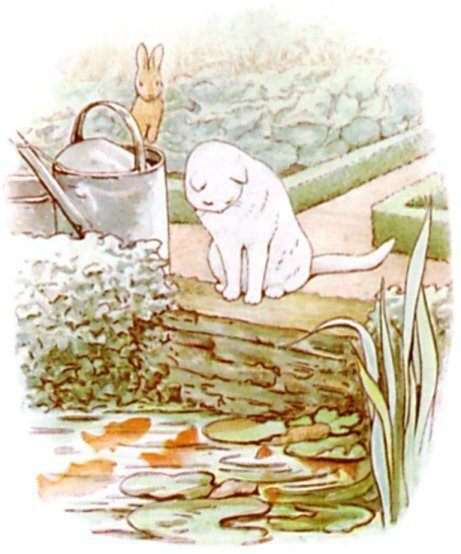
Then he tried to find his way straight across the garden, but he became more and more puzzled. Presently, he came to a pond where Mr. McGregor filled his water-cans. A white cat was staring at some gold-fish, she sat very, very still, but now and then the tip of her tail twitched as if it were alive. Peter thought it best to go away without speaking to her; he had heard about cats from his cousin, little Benjamin Bunny.
それから おにわを つっきって かえりみちを さがそうと しましたが、 よけいに まよってしまいました。 やがて マグレガーおじさんが みずくみをする ためいけのところへ たどりつきます。 しろい ねこが きんぎょを じっと にらんでいて ぴくりとも うごきませんが ときたま しっぽの さきが いきものみたいに くねくねと していました。 ピーターは そっとしておくのが いちばんだと おもいました。 いとこの ばにばにベンジャミンくんから ねこのことは それなりに きいていたのです。
【21ページ】

He went back towards the tool-shed, but suddenly, quite close to him, he heard the noise of a hoe—scr-r-ritch, scratch, scratch, scritch. Peter scuttered underneath the bushes. But presently, as nothing happened, he came out, and climbed upon a wheelbarrow and peeped over. The first thing he saw was Mr. McGregor hoeing onions. His back was turned towards Peter, and beyond him was the gate!
ものおきごやに もどろうとすると いきなり すぐそばから くわの おとが きこえてきました。 さっくり、 さくさく、 さっくり。 ピーターは しげみのしたを あたふたと はしりまわります。 けれども なんということも ないので すぐに でていって ておしぐるまの うえへ のぼり ようすを うかがってみました。 まず みえたのが タマネギばたけを たがやす マグレガーおじさん、 ピーターには せなかを むけていて なんと そのむこうに いりぐちが あるのです!
【22ページ】
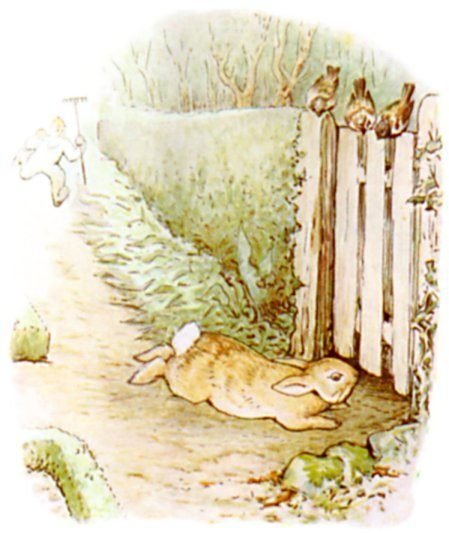
Peter got down very quietly off the wheelbarrow; and started running as fast as he could go, along a straight walk behind some black-currant bushes.
Mr. McGregor caught sight of him at the corner, but Peter did not care. He slipped underneath the gate, and was safe at last in the wood outside the garden.
ピーターは おとも たてずに ておしぐるまを おりて ぜんそくりょくで はしりだしました。 クロスグリの しげみのうら まっすぐ みちを すすみます。
かどのところで マグレガーおじさんに みつかりましたが ピーターは かまいません。 いりぐちのしたに すべりこんで とうとう にわのそと、 もりに はいれば あんぜんです。
【23ページ】
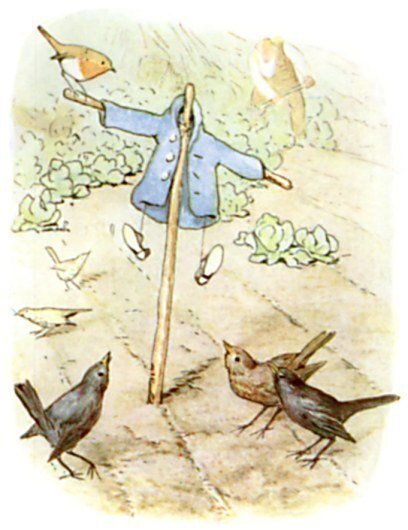
Mr. McGregor hung up the little jacket and the shoes for a scare-crow to frighten the blackbirds. Peter never stopped running or looked behind him till he got home to the big fir-tree.
マグレガーおじさんは ちいさな うわぎと くつを ぼうに ひっかけ からすよけの かかしに しました。 ピーターは そのままずっと はしりっぱなしで ふりかえることもなく おおきな モミのきの おうちまで かえりました。
【24ページ】
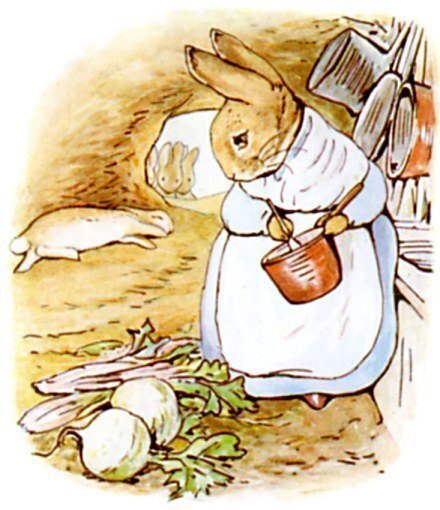
He was so tired that he flopped down upon the nice soft sand on the floor of the rabbit-hole and shut his eyes. His mother was busy cooking; she wondered what he had done with his clothes. It was the second little jacket and pair of shoes that Peter had lost in a fortnight!
もう くたくたなので うさぎあなの ふかふかした やわらかい つちの じめんに ねっころがると まぶたが すぐに おちます。 おかあさんは おりょうりの さいちゅうで てが はなせませんでしたが、 みにつけていたものは どうしたのかしらと くびを かしげました。 つい このあいだも うわぎと くつを なくしたっていうのに。
【25ページ】
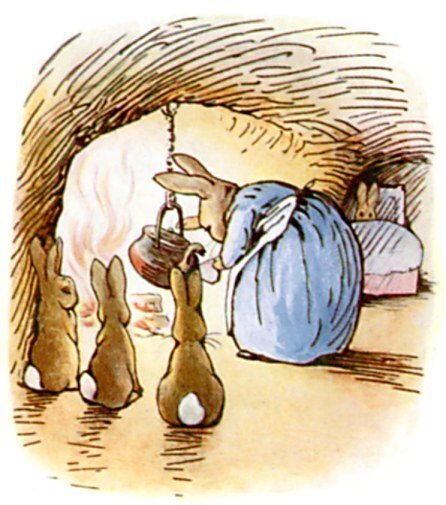
I am sorry to say that Peter was not very well during the evening.
His mother put him to bed, and made some camomile tea; and she gave a dose of it to Peter!
'One table-spoonful to be taken at bed-time.'
なんといったら いいのか、 ピーターは そのひの ばんは ずっと ぐあいが よくありませんでした。
おかあさんは ベッドに ねかしつけ カモミールの おちゃを つくってあげました。 ピーターへの おくすりと いうわけです!
「ねるまえに おおさじいっぱい のむこと。」
【26ページ】
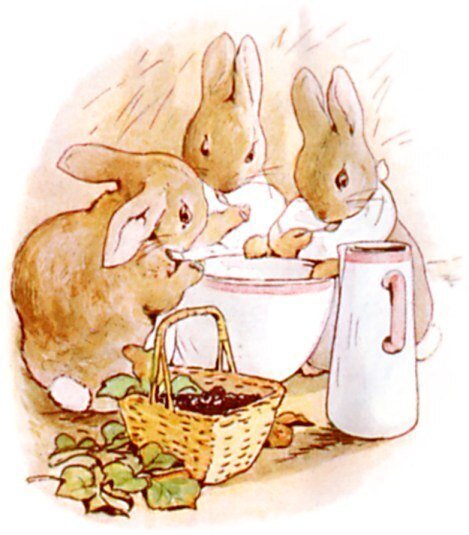
But Flopsy, Mopsy, and Cotton-tail had bread and milk and blackberries for supper.
かたや フロプシーと モプシーと カトンテルは ばんごはんに パンと ぎゅうにゅうと クロイチゴを たべました。
THE END(おしまい)
ピーターラビットの背景
Noelへの手紙
前述の通り、ピーターラビットの物語のもととなっているのは、Beatrixが、かつての自分の家庭教師であったAnnie Carter Mooreの息子(5歳のNoel Moore)が入院しているのを聞き、Noelを励ますために送った絵付の手紙で十二通ある。
手紙の冒頭は、以下のように綴られている。
My dear Noel,
I don't know what to write to you, so I shall tell you a story about four little rabbits, whose name were Flopsy, Mopsy, Cottontail and Peter. They lived with their mother in a sand bank under the root of a big fir tree.
ノエルちゃん、
あなたに何を書いたらよいかわからないので、お話を書きます。それは、フロプシー、モプシー、コットンテイル、そしてピーターという名前の四匹の子ウサギの話です。子ウサギたちは、お母さんウサギと一緒に、大きな樅の木の下の砂の土手の中に住んでいました。
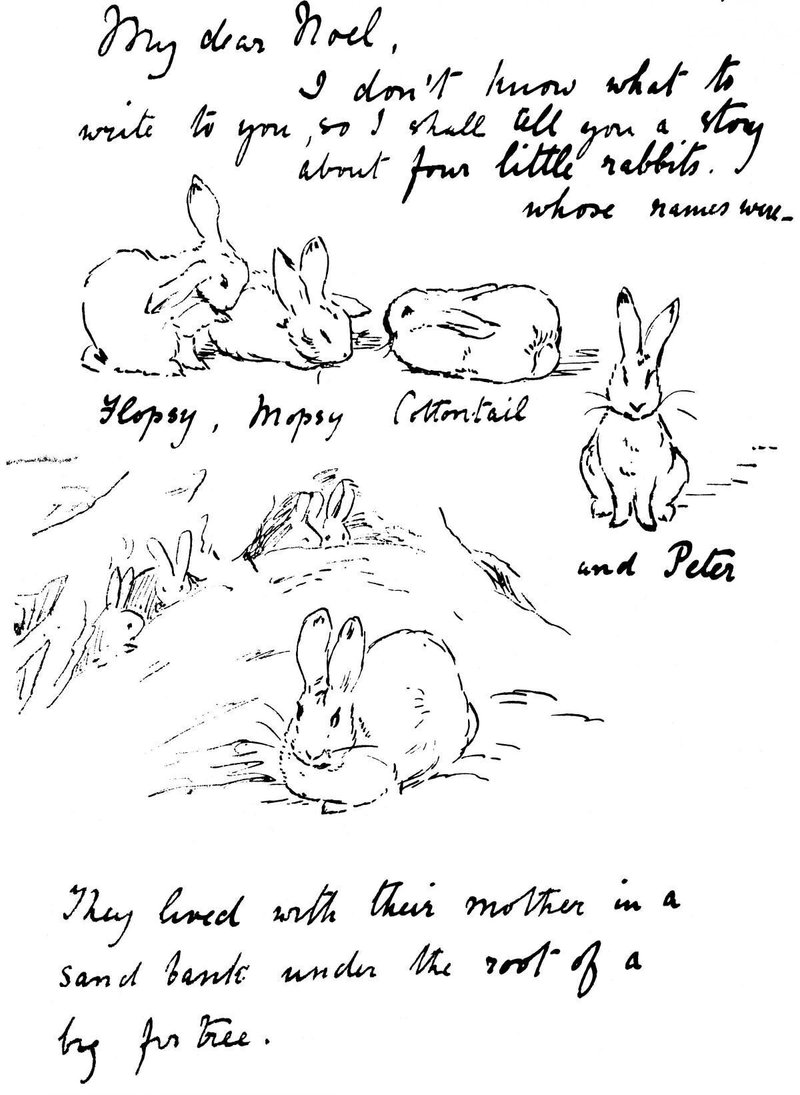
初版の自費出版本
Annieの勧めにより、本として出版することを試みるが、始めは出版社が付かず自費出版している。250部ほどで絵は白黒。絵の枚数は42枚あった。
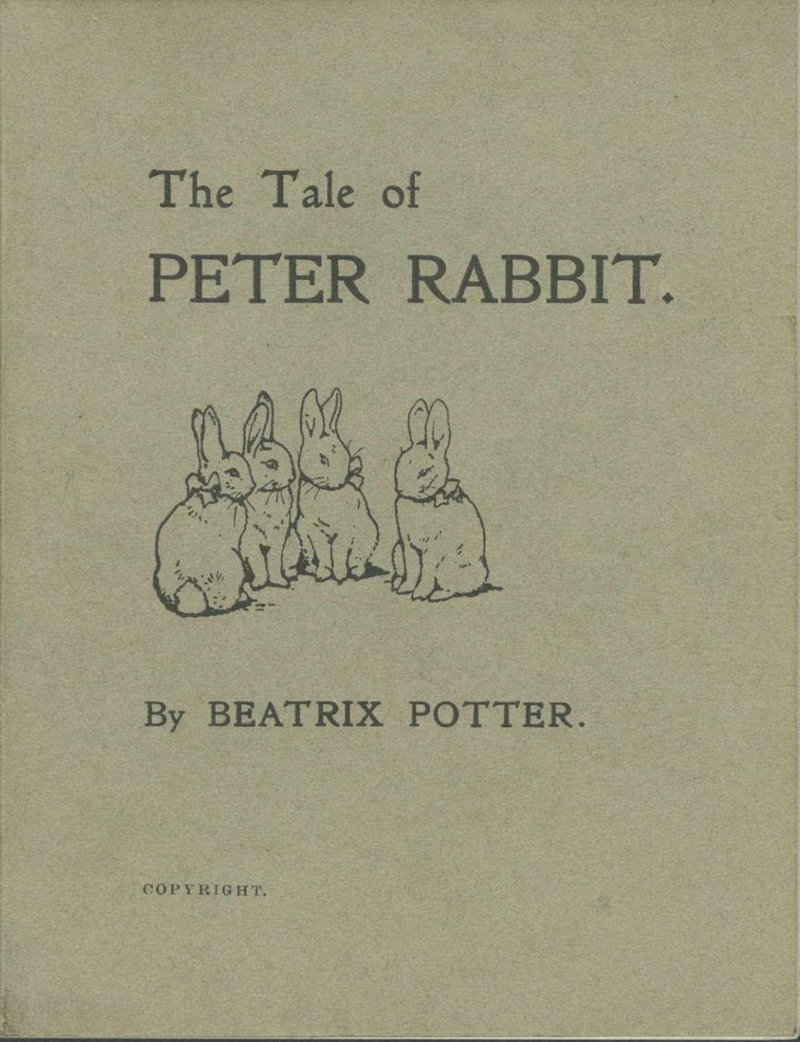
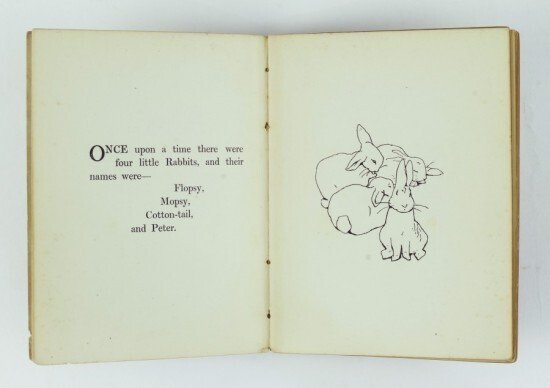
自費出版の後、改めて出版社を探したが、すぐに引き受けてくれるところはなかなか見つからなかったが、最終的に、Frederick Warne & Co社が出版することとなった。Beatrixは41枚の絵を用意したらが、Warne社は30枚に減らし、すべてに色を付けることを求めた。この過程で、マグレガーさんが歌いながら畑を耕している場面や、マグレガー婦人がピーターのお父さんが入ったパイを食卓に出す場面、ピーターのおかあさんが、生計を立てるために編み物をしている場面などが割愛されている。本のサイズについては、小さなサイズにすると価格を下げなければならず、支払える印税が下がるとWanre社には言われたが、Beatrixは子供の手の大きさに合わせることはゆずらなかった。当初、出版社は、テキストは韻を踏んだ方がよいかと考えたが、Beatrixの書体が良いと考え、そのまま使うこととした。1902年10月の初版は8000部、クリスマス用に2万部増刷したが、それらが飛ぶように売れた。
1983年にWarne社がPenguin Booksに吸収合併されると、Penguin社は、それまで公開されていなかったBeatrixの作品や原画も紹介するようになった。その一環として、The Tale of Peter Rabbitは、Warne社が出版の過程で取り除いた4つの見開きページも公開している。この版については、近年、川上未映子さんによる訳本が出ている。

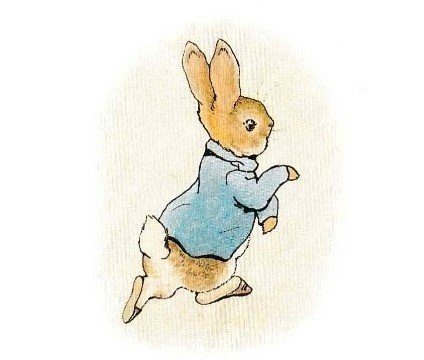

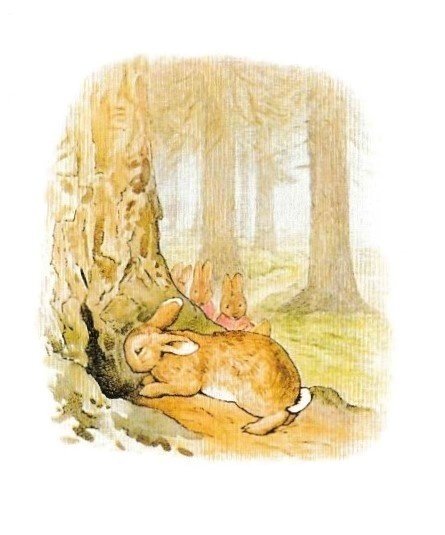
Beatrix とウサギ
Beatrixは、弟ともに子供部屋で過ごしていたころから、さまざまなペットを飼っていた。それらは、うさぎ、ハツカネズミ、とり、こうもり、かえる、トカゲ、食用ガメ、蛇などだった言う。その中で、二匹のウサギはBeatrixのお気に入りだったとのこと。一匹目は、Benjamin Bouncerといい、二匹目がPeter Piperで、これがのちのPeter Rabbitにつながっている。
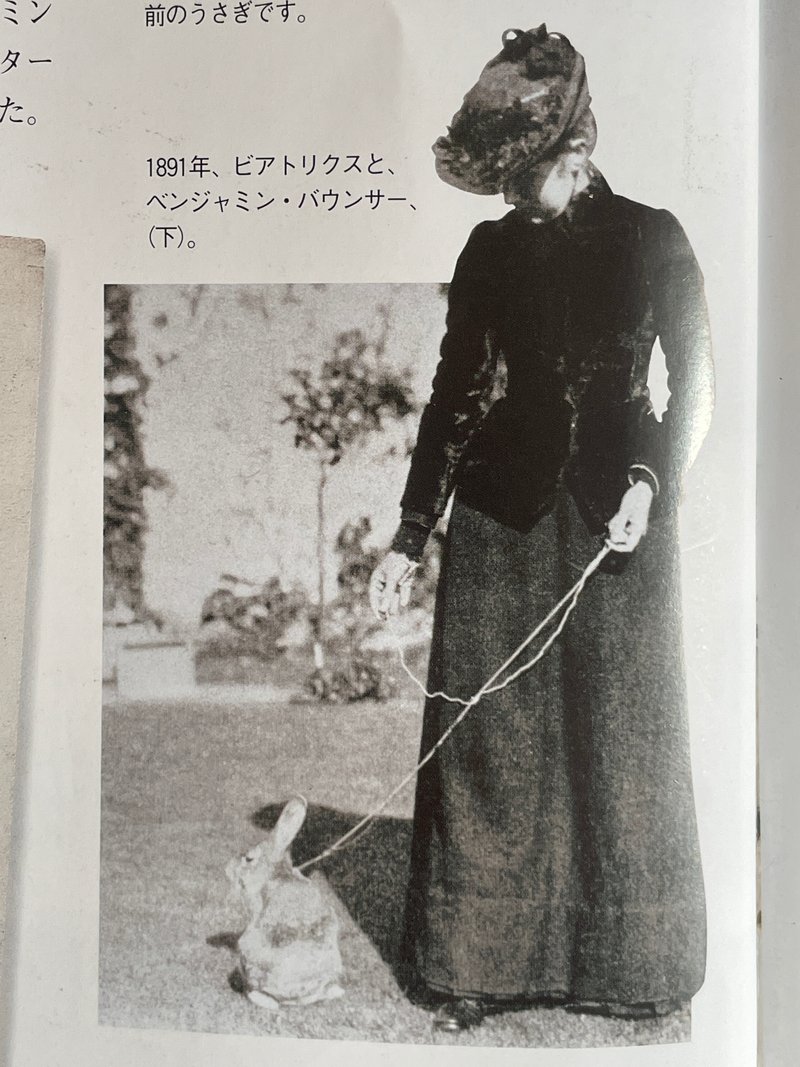
1891年、Benjamin Bouncerを連れいているBeatrix
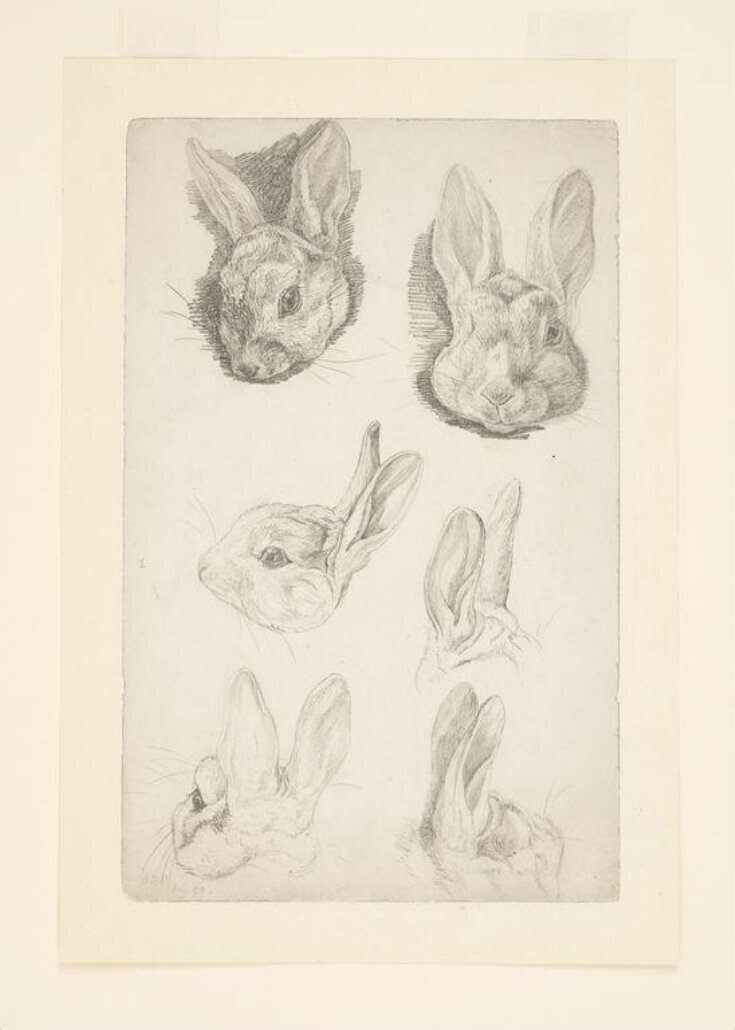
物語りから読み取れること
(1) タイトル
"The Tale of Peter Rabbit"は、"Peter Rabbit" でも"The Story of Peter Rabbit"でもありません。"Tale"は、"Tail"と語呂合わせをしたものであり、「しっぽ」に引っ掛けたものです。また、"Tail"は、「終わり」を意味することばでもあるので、Peter Rabbitの冒険の「結果」も含意されているかもしれません。
(2) 動物のリアルさとデフォルメ
Beatrix Potterは、物語に登場する動物を何度も丁寧にスケッチしています。この作品を描く前からウサギを飼っており、それをスケッチしたものをベースに、グリーティング・カードも作っていました。絵が「漫画」となることなくリアルさがあるのが作品の特徴となっています。Peter他のウサギでも、耳の長さをいたずらに誇張することはしていない。同様に、身の回りの光景、風景もスケッチに基いたリアルさがあります。
他方で、一枚一枚の絵の中に描かれたPeterの相対的な大きさは、それぞれの場面の情景がよく伝わるように、変化しています。これは、一つのデフォルメといえるでしょう。
(3) 服の意味するもの:半分人間、半分動物
Peter Rabbitのシリーズでは、動物が服を着ているために擬人化が強まり、あたかも文明人のような生活を送っている様が感じられる。一方で、Peterがウサギのようにマグレガーさんの畑から逃げるときには、着ていた服が引っかかって邪魔をすることとなる。これが文明に対する揶揄にもみえる。Peterが文明人のように賢くふるまうべきなのか、ウサギのように本能に従って行動すべきかという問いに、この本は巧みに迫っているのではないかと言う書評もある。これは、子どもたちが、親の言うことを聞いて自分を抑えて良い子としてふるまうか、動物的本能にまかせてやりたい放題ふるまうのかという現実に生じるジレンマを要約したものとも見れる。
(4) マザーグースとの連想
物語りの中で、食べ過ぎたピーターがお腹を落ち着けようとしてパセリを食べるシーンがある。パセリと言えば、「ラプンツェル」の原型となった物語の一つに登場したものであり、また、英国ではおなじみのものである。英国人であればすぐに浮かぶであろうマザーグースの歌の一つが以下のもの。ピーターラビットを読む英国人のあたまにはこの歌が響いていることだろう。
Can you make me a cambrick shirt,
Parsley, sage, rosemary and thyme,
Without any seam or needle work?
And I will be a true lover of thine.
Can you wash it in yonder well,
Parsley, sage, rosemary and thyme,
Where never sprung water nor rain never fell?
And I will be a true lover of thine.
Can you dry it on yonder thorn,
Parsley, sage, rosemary and thyme,
Which never bore blossom since Adam was born?
And I will be a true lover of thine.
Now you have asked me questions three,
Parsley, sage, rosemary and thyme,
As many wonders I'll tell to thee
If thou wilt be a true lover of mine.
A handless man a letter did write,
Parsley, sage, rosemary and thyme;
And he who read it had lost his sight,
And thou shalt be a true lover of mine.
ちなみに、これを、SimonとGarfunkelがアレンジしたのがScarborough Fairである。
Scarborough Fair / Canticle
1. Are you goin' to Scarborough Fair,
Parsley, sage, rosemary, and thyme,
Remember me to one who lives there,
She once was a true love of mine.
2. Tell her to make me a cambric shirt,
Parsley, sage, rosemary, and thyme,
Without no seams or needlework,
Then she'll be a true love of mine.
3. Tell her to find me an acre of land,
Parsley, sage, rosemary, and thyme,
Between the salt water and the sea strands,
Then she'll be a true love of mine.
4. Tell her to reap it with a sickle of leather,
Parsley, sage, rosemary, and thyme,
And gather it all in a bunch of heather,
Then she'll be a true love of mine.
5. Are you going to Scarborough Fair,
Parsley, sage, rosemary and thyme,
Remember me to one who lives there,
She once was a true love of mine.
(Trad. Arr. Simon / Garfunkel)
また、物語では、本文には記述がないものの、イラストの中にコマドリ(Robin)が何度も登場している。コマドリといえば、やはり、マザーグースの中で入っていてよく知られている「誰がコマドリを殺した」を連想する英国人は少なくないことと思う。
Who killed Cock Robin?
I, said the Sparrow,
with my bow and arrow,
I killed Cock Robin.
Who saw him die?
I, said the Fly,
with my little eye,
I saw him die.
Who caught his blood?
I, said the Fish,
with my little dish,
I caught his blood.
Who’ll make the shroud?
I, said the Beetle,
with my thread and needle,
I’ll make the shroud.
Who’ll dig his grave?
I, said the Owl,
with my little trowel,
I’ll dig his grave.
Who’ll be the parson?
I, said the Rook,
with my little book,
I’ll be the parson.
Who’ll be the clerk?
I, said the Lark,
if it’s not in the dark,
I’ll be the clerk.
Who’ll carry the link?
I, said the Linnet,
I’ll fetch it in a minute,
I’ll carry the link.
Who’ll be chief mourner?
I, said the Dove,
I mourn for my love,
I’ll be chief mourner.
Who’ll carry the coffin?
I, said the Kite,
if it’s not through the night,
I’ll carry the coffin.
Who’ll bear the pall?
We, said the Wren,
both the cock and the hen,
We’ll bear the pall.
Who’ll sing a psalm?
I, said the Thrush,
as she sat on a bush,
I’ll sing a psalm.
Who’ll toll the bell?
I said the Bull,
because I can pull,
I’ll toll the bell.
All the birds of the air
fell a-sighing and a-sobbing,
when they heard the bell toll
for poor Cock Robin.
なお、この詩には実に様々な曲がついており、様々な歌い方がある。
『グロスターの仕立て屋さん』(The Tailor of Gloucester)(1903)
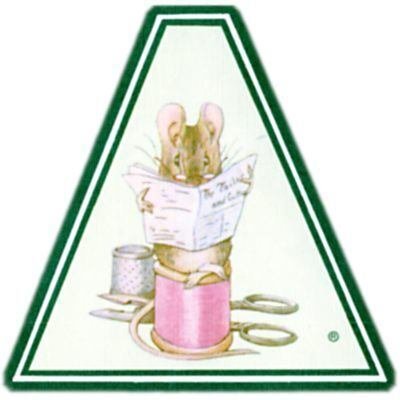
THE TAILOR OF
GLOUCESTER
BY
BEATRIX POTTER
Author of "The Tale of Peter Rabbit," etc
"I'LL BE AT CHARGES FOR A LOOKING-GLASS, AND ENTERTAIN A SCORE OR TWO OF TAILORS"Richard III
こりゃ 1まい かがみでも 買って
ふくやを 2,3にん よんでみようか。
――リチャード3せい
NEW YORK
FREDERICK WARNE & CO, INC
COPYRIGHT, 1903

BY
FREDERICK WARNE & Co.
COPYRIGHT RENEWED, 1931
[All rights reserved]
PRINTED IN THE U.S.A. BY PRINCETON POLYCHROME PRESS
ISBN O 7232 0594 9 (cloth) ISBN O-7232-6227-6 (paper)
12 13 14 15 16 17 18 19 20(C)
MY DEAR FREDA,
Because you are fond of fairy-tales, and have been ill, I have made you a story all for yourself—a new one that nobody has read before.
And the queerest thing about it is—that I heard it in Gloucestershire, and that it is true—at least about the tailor, the waistcoat, and the
"No more twist!"
Christmas, 1901
フリーダちゃん
おとぎ話が大すきだけど、ねこんでいるあなたのために、このお話をまるまる作りました――まだ だれも読んでいない 新しいお話です。
このお話のいちばんふしぎなところは――わたしが グロスターで耳にした ほんとの話だということです。ふくやさんのこととか、チョッキのこととか、「糸が 足りない」のところとかはね!
1901年 クリスマス
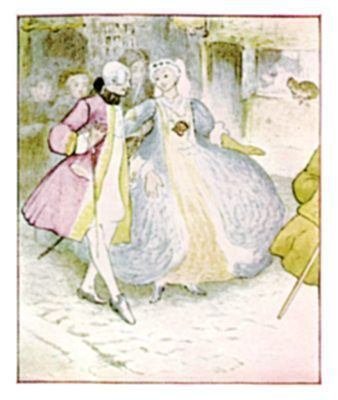
THE TAILOR OF GLOUCESTER
【1】
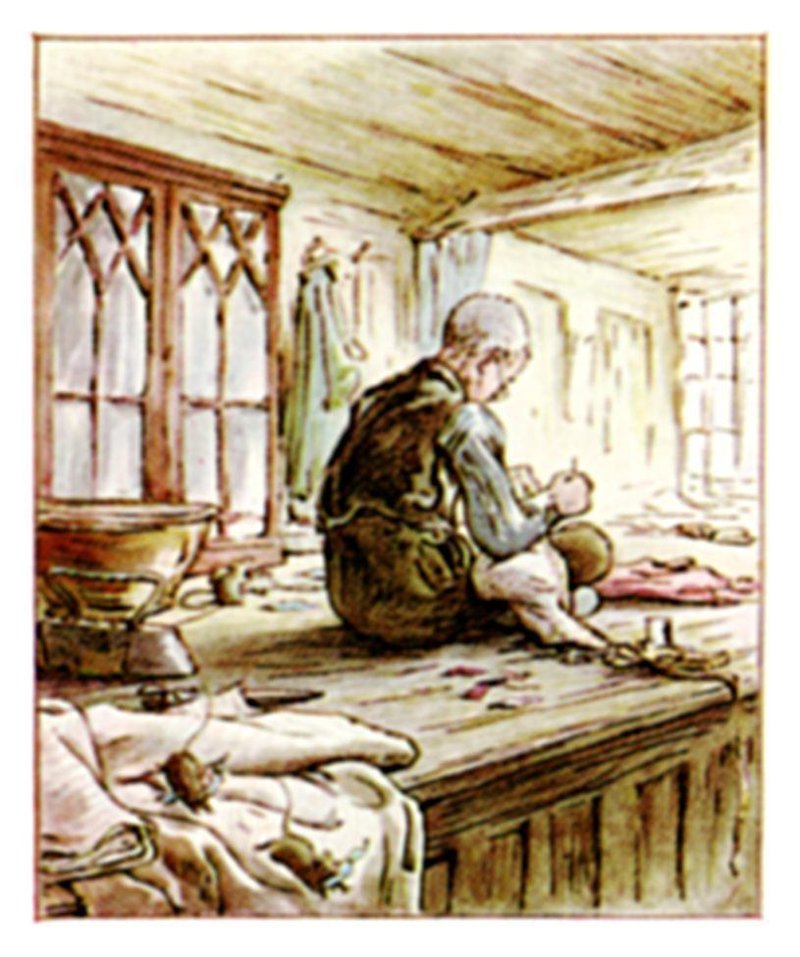
In the time of swords and periwigs and full-skirted coats with flowered lappets—when gentlemen wore ruffles, and gold-laced waistcoats of paduasoy and taffeta—there lived a tailor in Gloucester.
He sat in the window of a little shop in Westgate Street, cross-legged on a table, from morning till dark.
All day long while the light lasted he sewed and snippeted, piecing out his satin and pompadour, and lutestring; stuffs had strange names, and were very expensive in the days of the Tailor of Gloucester.
つるぎとカツラがまだあって、コートのすそが長くて、花がらのひらひらのついていた むかし、男の人もひだやふさのついたきらびやかなきぬの チョッキをきていたむかしのこと、グロスターに ふくやさんがおりました。
その人は、町の西門にかまえた ちいさなお店のまどぎわで、さぎょう台の上にあぐらをかいて 朝からばんまですわっていました。
日のあるうちは、ずっとぬったり切ったり、いろんなぬのの生地をぬいあわせておりまして。サテン、ポンパドゥール、ラストリン、生地にも それぞれかわった名前があって、どれもこのお話のおこったころには、とてもねうちのあるものでした。
注:flowered lappets, ruffles, paduasory, taffeta,
18世紀の装飾性の高い衣類、装飾、生地を表している。それぞれ、花の模様の装飾(垂れ)、ひだの装飾、ポードソア(法衣などに使われる丈夫な絹織物)、タフタ。
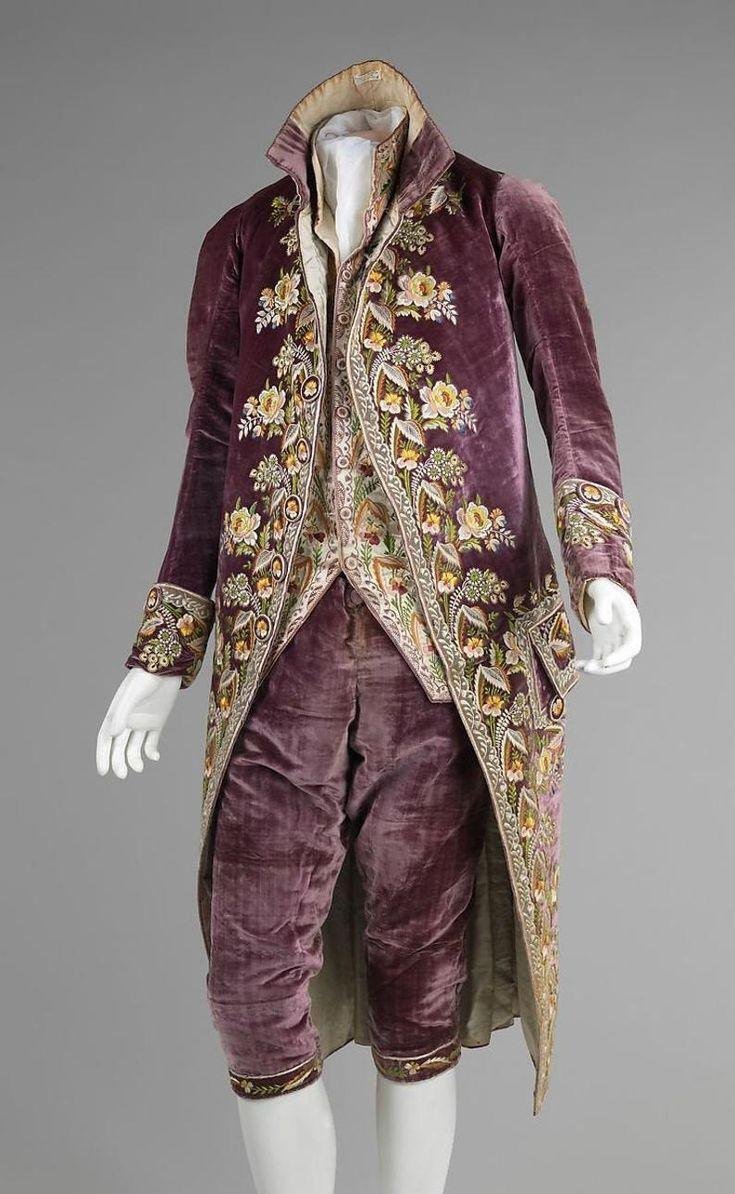
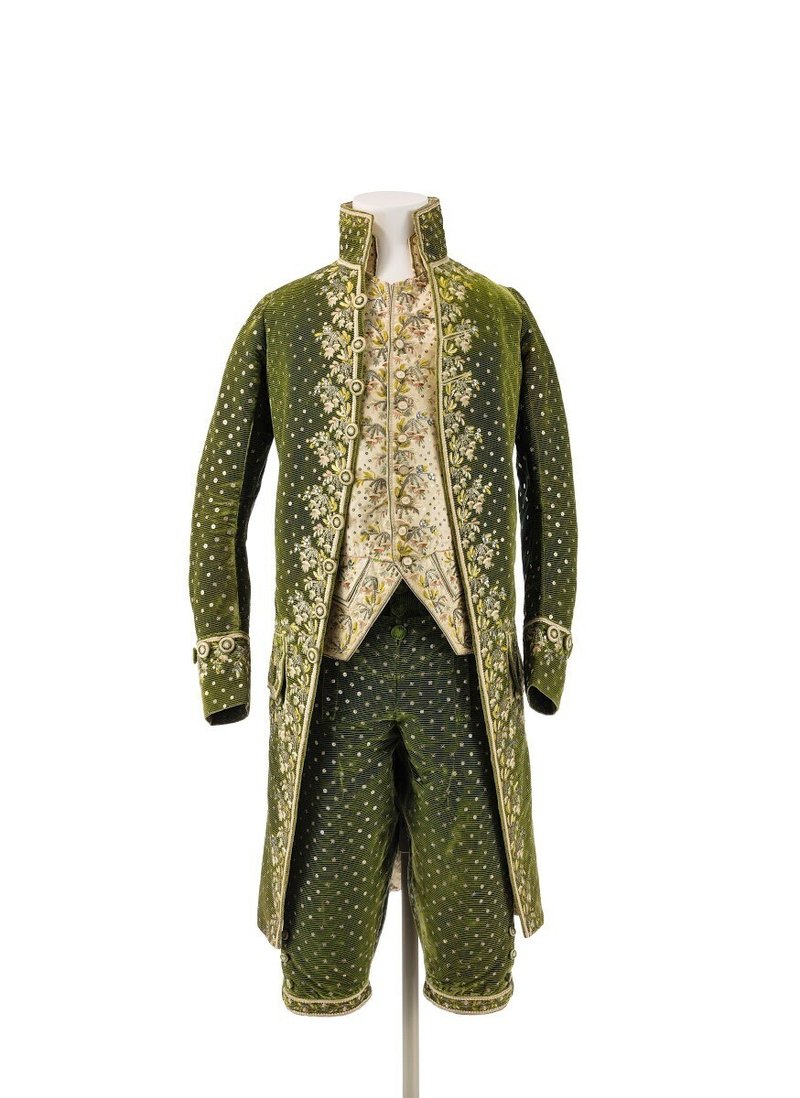
注 satin, popadour, lustering,
生地の種類、サテン(さらさらした質感と光沢)、ポンパドール(柔らかい質感と艶)、ラストリン(光沢のある裏生地)
【2】
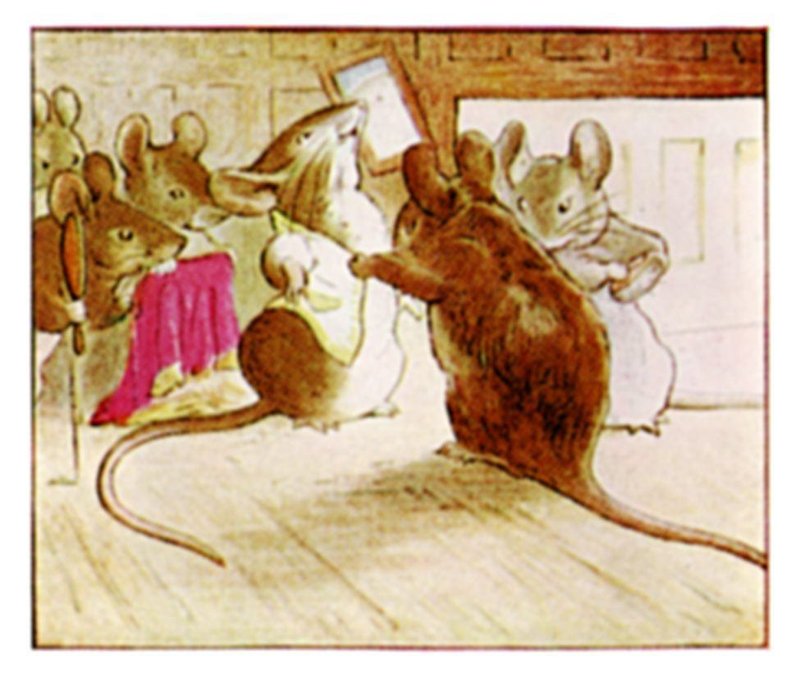
But although he sewed fine silk for his neighbours, he himself was very, very poor—a little old man in spectacles, with a pinched face, old crooked fingers, and a suit of thread-bare clothes.
He cut his coats without waste, according to his embroidered cloth; they were very small ends and snippets that lay about upon the table—"Too narrow breadths for nought—except waistcoats for mice," said the tailor.
ところが ご近じょのおきゃくさんには 上もののきぬをぬうのに、そのひとは とてもとてもまずしくて――そのこがらなメガネおじいさんは、やつれた顔、まがったゆび、すりきれた上下のふくというありさま。
ぬいとりのぬのに合わせて、むだなくふくのかたちをたち切りましたから、 さぎょう台の上にちらかるのは、ほんの少しの切れはしだけ――「はしきれすぎて、どうにもならない――ネズミのチョッキにはなるくらいだ。」とふくやさんは言います。
【3】
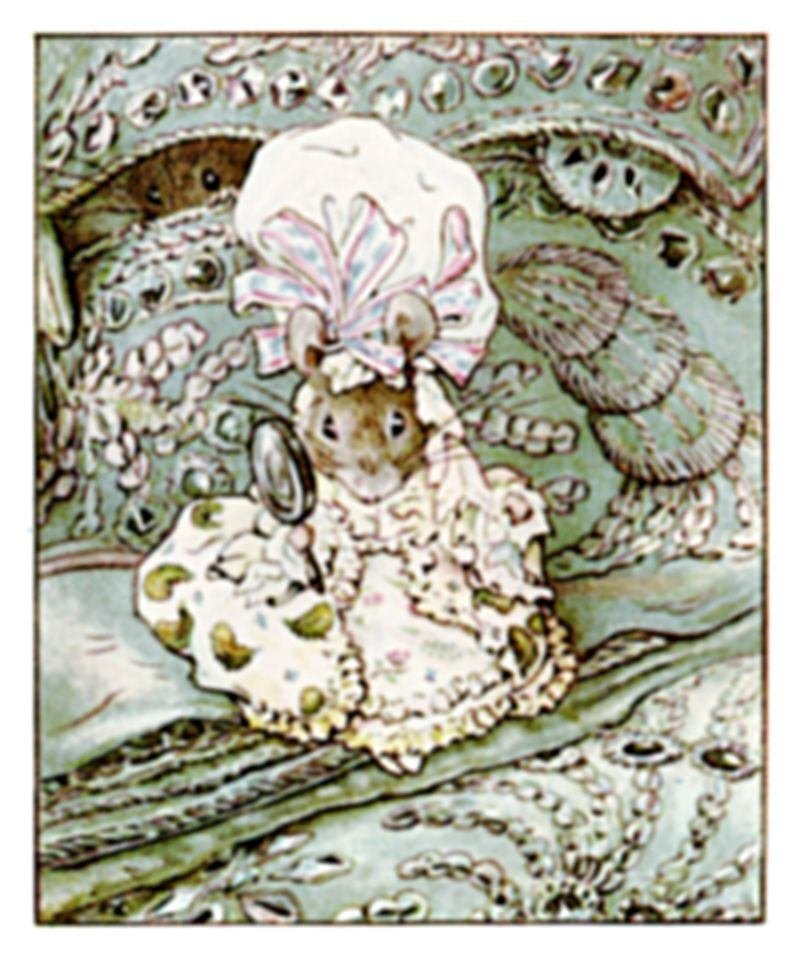
One bitter cold day near Christmastime the tailor began to make a coat—a coat of cherry-coloured corded silk embroidered with pansies and roses, and a cream coloured satin waistcoat—trimmed with gauze and green worsted chenille—for the Mayor of Gloucester.
The tailor worked and worked, and he talked to himself. He measured the silk, and turned it round and round, and trimmed it into shape with his shears; the table was all littered with cherry-coloured snippets.
"No breadth at all, and cut on the cross; it is no breadth at all; tippets for mice and ribbons for mobs! for mice!" said the Tailor of Gloucester.
クリスマスも近づいたあるさむさもきびしい日、ふくやさんはコートを作りはじめました――パンジーやバラのししゅう入りの さくらんぼ色したうねおりのきぬのコートと、クリーム色したサテンのチョッキ――ゴーズと緑の ウーステッドのシニョール糸でかざりつけられていて――グロスターの町長のためのあつらえものです。
ふくやさんははたらきづめで、ひとりごと。きぬをすんぽう取って、くるくる回して、大ばさみでかたどおりに切りととのえていきました。さぎょう台じゅうに、さくらんぼ色の切れはしがとっちらかります。
「あまりはなし、たち合わせもばっちり、それあまりはなしだ、あっても ネズミのかたかけ、小ものの ボンができるだけ!できるだけ!」と グロスターのふくやさんは言いました。
【4】
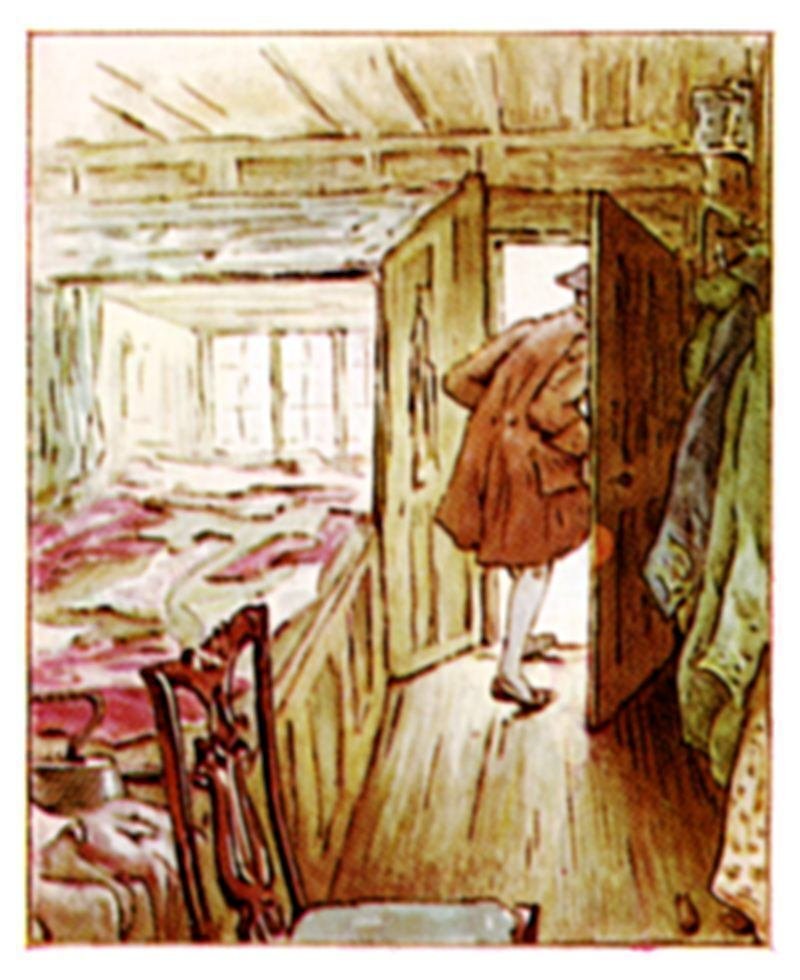
When the snow-flakes came down against the small leaded window-panes and shut out the light, the tailor had done his day's work; all the silk and satin lay cut out upon the table.
There were twelve pieces for the coat and four pieces for the waistcoat; and there were pocket flaps and cuffs, and buttons all in order. For the lining of the coat there was fine yellow taffeta; and for the button-holes of the waistcoat, there was cherry-coloured twist. And everything was ready to sew together in the morning, all measured and sufficient—except that there was wanting just one single skein of cherry-coloured twisted silk.
雪がひらひらと、かたいわくの ちいさなガラスまどにふりつもって、ようやく光をさえぎるころに、ふくやさんはその日のしごとをおえます。きぬと サテンがみんな切りとられたまま、さぎょう台の上におかれました。
コート用に12きれ、チョッキ用に4きれ、ポケットのたれとカフスとボタンが、みんなきっちりとならんでいます。コートのうらじに上ものの黄色の タフタがあって、チョッキのボタンあなにはさくらんぼ色のかがり糸、こうしてみんな朝にぬいあわせるだんどりができたわけで、すんぽうよしでせいぞろい――あとはさくらんぼ色のきぬのより糸が、1かせ足りないだけです。
【5】
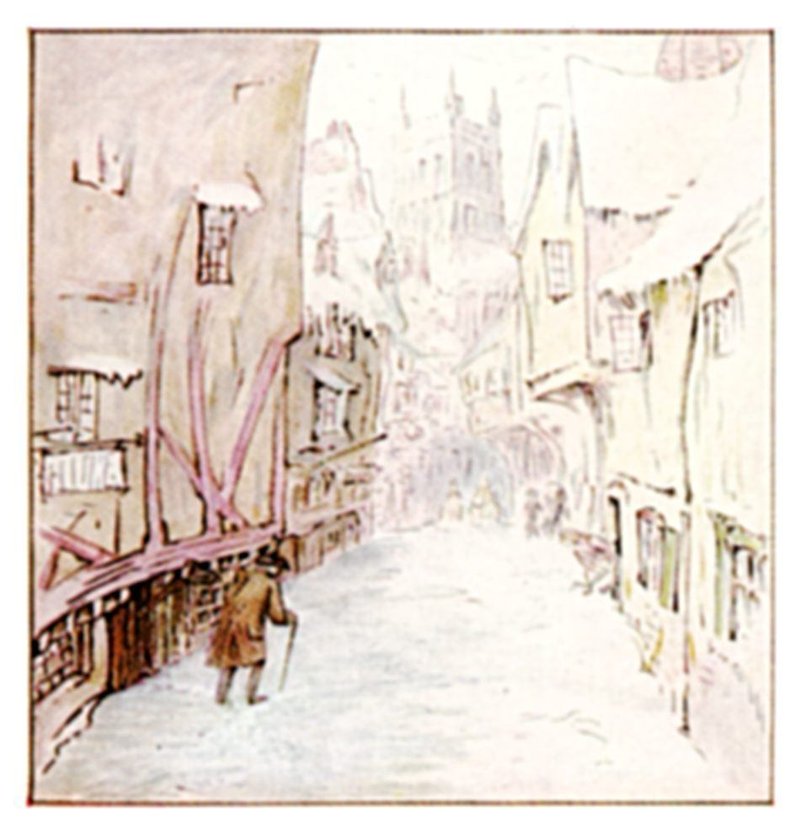
The tailor came out of his shop at dark, for he did not sleep there at nights; he fastened the window and locked the door, and took away the key. No one lived there at night but little brown mice, and they run in and out without any keys!
For behind the wooden wainscots of all the old houses in Gloucester, there are little mouse staircases and secret trap-doors; and the mice run from house to house through those long narrow passages; they can run all over the town without going into the streets.
But the tailor came out of his shop, and shuffled home through the snow.
ふくやさんは 夕ぐれにお店をあとにしました。夜のねどこは べつのところなので、まどをしめて戸じまり。かぎも持ってさようなら。夜にはだれもそこにいないわけなのですが、ただ ちいさな茶ネズミだけはおりまして、かぎもなくちょろちょろ出入りするのです。
グロスターの古いおうちには、どこでも 木のかべうらに、ちいさなネズミ用のかいだんと、かくしとびらがありました。そうして ネズミたちは、家から家へ、長くせまいつうろを通ってちょろちょろ。おもてに出ることなく、まちじゅうどこでも行けるのです。
ところが ふくやさんはお店を出て、雪のなかよたよたとおうちまで歩きます。
【6】

He lived quite near by in College Court, next the doorway to College Green; and although it was not a big house, the tailor was so poor he only rented the kitchen.
He lived alone with his cat; it was called Simpkin.
Now all day long while the tailor was out at work, Simpkin kept house by himself; and he also was fond of the mice, though he gave them no satin for coats!
"Miaw?" said the cat when the tailor opened the door. "Miaw?"
The tailor replied—"Simpkin, we shall make our fortune, but I am worn to a ravelling. Take this groat (which is our last fourpence) and Simpkin, take a china pipkin; buy a penn'orth of bread, a penn'orth of milk and a penn'orth of sausages. And oh, Simpkin, with the last penny of our fourpence buy me one penn'orth of cherry-coloured silk. But do not lose the last penny of the fourpence, Simpkin, or I am undone and worn to a thread-paper, for I have NO MORE TWIST."
Then Simpkin again said, "Miaw?" and took the groat and the pipkin, and went out into the dark.
すまいは大学広場のほど近く、大学森への道のすぐとなりで、大きな家ではないのですが、まずしいふくやさんは、その台どころだけかりていました。
いっしょにくらしているのはネコだけで 名前はシンプキン。
ふくやさんがはたらきに出ている日中 ずっとシンプキンはひとりでおるすばん。やっぱり ネズミが大すきなのですが、こちらはやつらにコート用の ぬのをあげたりはしません。
「みゃう?」と、ネコはふくやさんがドアをあけるなり すぐ、「みゃう?」
ふくやさんのおへんじは――「シンプキン、そのうちわしらも金持ちになる、だがとりあえずわしは糸がほつれるくらいへとへとだ。さあ この小さなぎんかをもって(これがちょうどどうか4まい分、なけなしのお金でした)、それとシンプキン、土びんをくわえてな。どうか1まい分のパンと、 1まい分の牛にゅうと1まい分のソーセージを買ってくるんだ。ええと、 おおシンプキン、もうどうか4まい分しかないが、あと1まい分で、さくらんぼ色のきぬ糸をたのむ。このさいごの1まい分をわすれるんじゃないぞ、 シンプキン、さもなきゃできあがらんし、わしゃへとへとなんだ、なんなら『より糸が 足りん!』」
すると シンプキンがまた「みゃう?」とないて、ぎんかと土びんをもつと、くらがりのなかへ出ていきました。
【7】
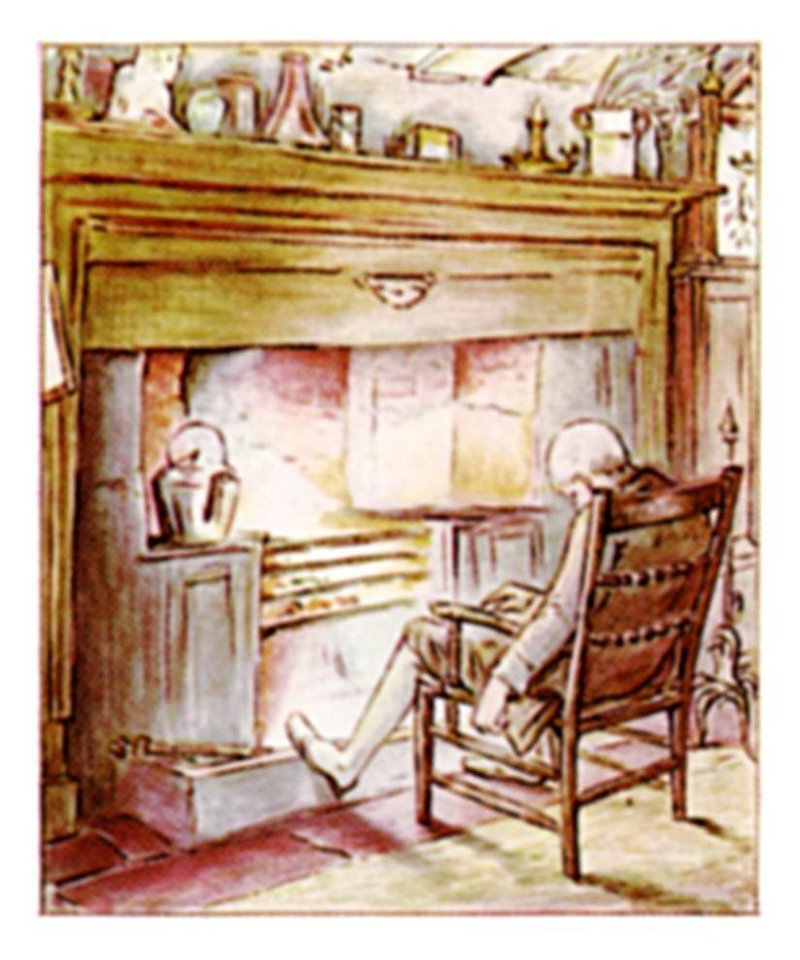
The tailor was very tired and beginning to be ill. He sat down by the hearth and talked to himself about that wonderful coat.
"I shall make my fortune—to be cut bias—the Mayor of Gloucester is to be married on Christmas Day in the morning, and he hath ordered a coat and an embroidered waistcoat—to be lined with yellow taffeta—and the taffeta sufficeth; there is no more left over in snippets than will serve to make tippets for mice——"
Then the tailor started; for suddenly, interrupting him, from the dresser at the other side of the kitchen came a number of little noises—
Tip tap, tip tap, tip tap tip!
"Now what can that be?" said the Tailor of Gloucester, jumping up from his chair. The dresser was covered with crockery and pipkins, willow pattern plates, and tea-cups and mugs.
あまりにくたびれたふくやさんは、もうぐあいがわるくなっていました。 だんろのそばにこしを下ろして、あのすてきなコートのことをひとりぶつぶつ。
「そのうち金持ちになるさ――ぬのをばさっとたって――グロスターの町長がクリスマスの日の朝、けっこんすることになったって、コートとししゅう入りのチョッキをまかせてくれたんだ――うらじは黄色――つやつやのぬのもしっかりある、のこるのはネズミにかたかけを作ってやれるくらいの切れはしだけだ――」
そこで、はっとするふくやさん。というのも、いきなりじゃまといいますか、台どころのうらにある戸だなから ちいさなもの音がたてつづけにしたものですから ――
ちっぷたっぷ、ちっぷたっぷ、ちっぷたっぷちっぷ!
「なんだ 今のは?」と、グロスターのふくやさんはいすからとびあがります。戸だなには、とうきや土なべ、ティーカップやマグでいっぱいですが。
【8】
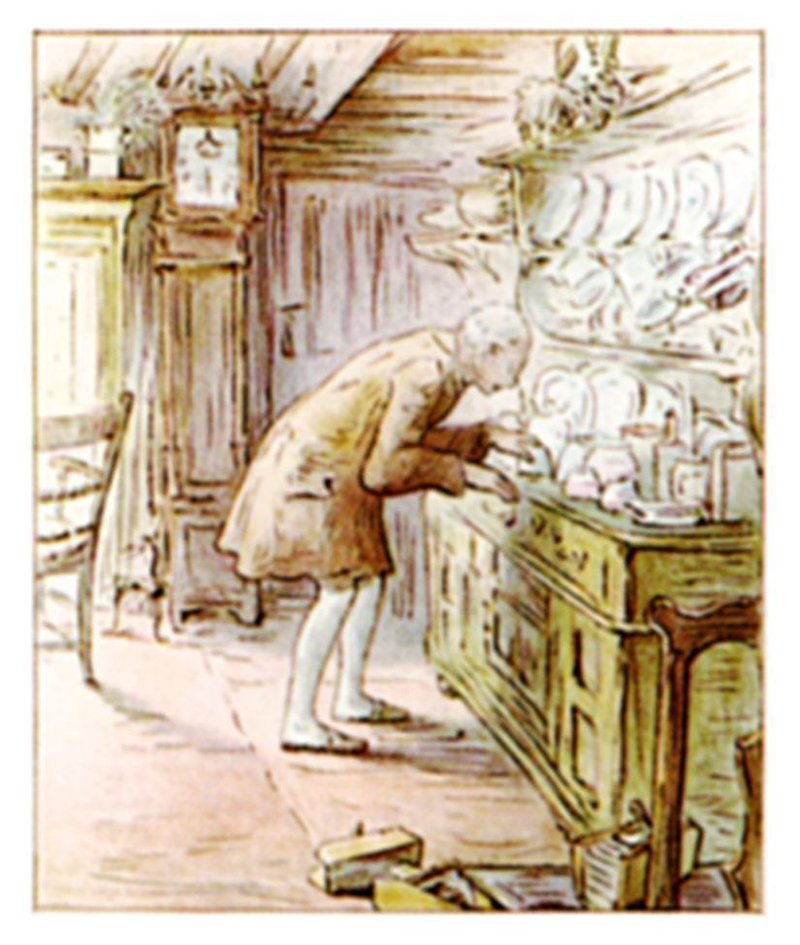
The tailor crossed the kitchen, and stood quite still beside the dresser, listening, and peering through his spectacles. Again from under a tea-cup, came those funny little noises—
Tip tap, tip tap, Tip tap tip!
"This is very peculiar," said the Tailor of Gloucester; and he lifted up the tea-cup which was upside down.
ふくやさんは むかいの台どころへ行って、戸だなのわきにすっと立って、 耳をすましながら、メガネのおくからのぞきこみました。また、ティーカップの下からおかしなちいさなもの音が――
ちっぷたっぷ、 ちっぷたっぷ、 ちっぷたっぷちっぷ!
「こりゃ みょうだぞ。」と グロスターのふくやさんは、さかさになっていたティーカップを持ち上げます。
【9】
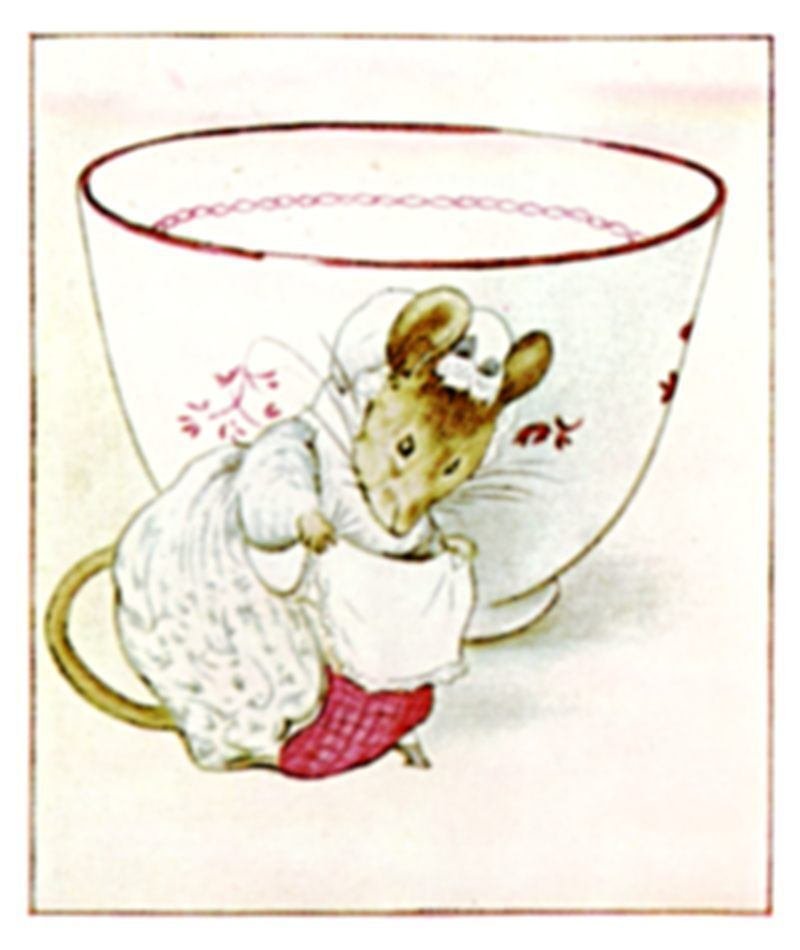
Out stepped a little live lady mouse, and made a curtsey to the tailor! Then she hopped away down off the dresser, and under the wainscot.
The tailor sat down again by the fire, warming his poor cold hands, and mumbling to himself——
"The waistcoat is cut out from peach-coloured satin—tambour stitch and rose-buds in beautiful floss silk. Was I wise to entrust my last fourpence to Simpkin? One-and-twenty button-holes of cherry-coloured twist!"
But all at once, from the dresser, there came other little noises:
Tip tap, tip tap, tip tap tip!
すると 出てきたのは、まさに ちいさなネズミのごふじん、しかも ふくやさんにすそをつまみながら あいさつをしまして!そのあと ひょいっと 戸だなからとびおりて、かべのうらにさようなら。
ふくやさんは だんろのそばにすわりなおして、かわいそうにひえた手を あたためながら、ぶつぶつとひとりごと――
「チョッキは もも色のサテンからたってある――バラのつぼみのししゅうは、きれいなきぬ糸で。はたして なけなしのお金をシンプキンにあずけて よかったのやら。21のボタンあなが、さくらんぼ色のより糸だとは!」
ところが たちまち、戸だなのところからまたもやちいさなもの音が。
ちっぷたっぷ、ちっぷたっぷ、ちっぷたっぷちっぷ!
【10】
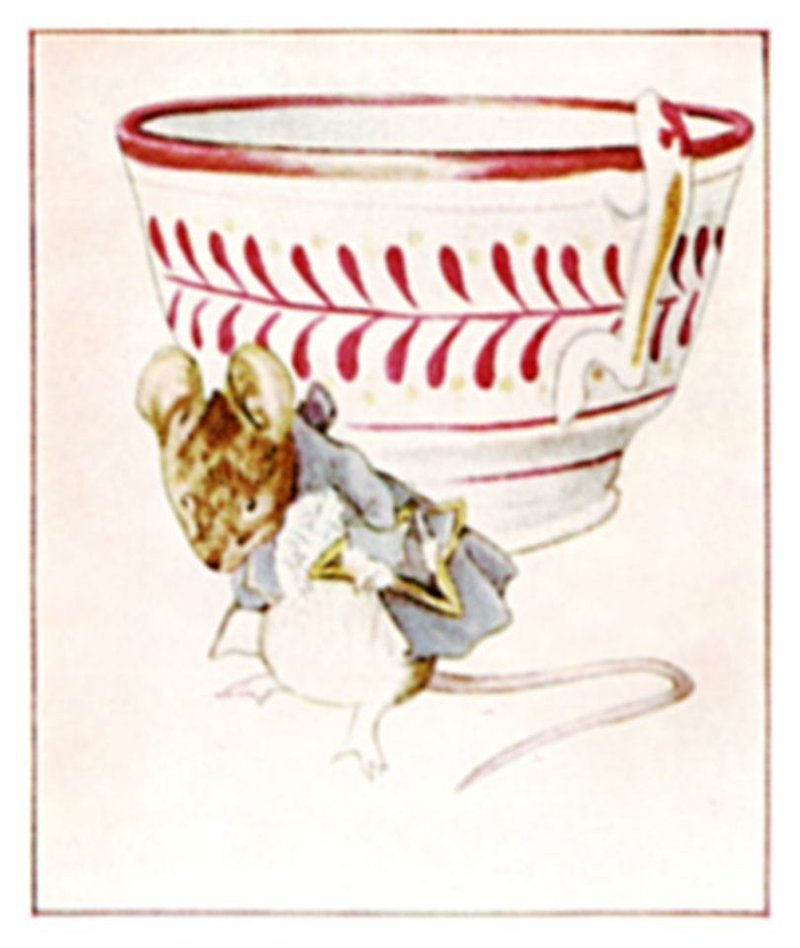
"This is passing extraordinary!" said the Tailor of Gloucester, and turned over another tea-cup, which was upside down.
Out stepped a little gentleman mouse, and made a bow to the tailor!
And then from all over the dresser came a chorus of little tappings, all sounding together, and answering one another, like watch-beetles in an old worm-eaten window-shutter—
Tip tap, tip tap, tip tap tip!
「こりゃ とんでもない!」と グロスターのふくやさんが、もうひとつ さかさになっていたティーカップを ひっくりかえしてみると。
こんど出てきたのは、 まさに ちいさなネズミのだんなさま、しかもふくやさんにぼうしを取っておじぎをしまして!
そのあと 戸だなのあっちこっちから、いっせいに こまかなもの音がうわっとなりだして、あっちがなればこっち、むしくいまどのシバンムシみたいに。
ちっぷたっぷ、ちっぷたっぷ、ちっぷたっぷちっぷ!
注:watch-beetleとはdeathwatch beetle(シバンムシ(死番虫))のこと。古い木製家具などの中に穴を掘って,かちかち立てる音は死の前兆といわれる。
【11】

And out from under tea-cups and from under bowls and basins, stepped other and more little mice who hopped away down off the dresser and under the wainscot.
The tailor sat down, close over the fire, lamenting—"One-and-twenty button-holes of cherry-coloured silk! To be finished by noon of Saturday: and this is Tuesday evening. Was it right to let loose those mice, undoubtedly the property of Simpkin? Alack, I am undone, for I have no more twist!"
The little mice came out again, and listened to the tailor; they took notice of the pattern of that wonderful coat. They whispered to one another about the taffeta lining, and about little mouse tippets.
もう カップの下から、おわんの下から、はちの下から、ちょろちょろ わらわら ネズミさんたちがとびだしてきて、みんな 戸だなからおりて、 かべのうらにさようなら。ふくやさんは、だんろのまぢかにすわりこんで、 ぼやきます――「21のボタンあなが さくらんぼ色のきぬとは!土曜の 昼までに終わらんと。今は、火曜の夜だ。ネズミをにがしてよかったものか、どう見てもシンプキンが取っておいたものだが。ああ、まだ しあがらん、なんなら『より糸が足りない!』」
また出てきたネズミさんたちが ふくやさんの言うことに耳をすませていました。みんな あのすてきなコートのがらが気になっていたのです。つやつやのうらじや、ネズミさん用のかたかけのことを、みんなしてひそひそ。
注:AkackはAlasに相当する悲しみや落胆を示すもので古風な表現。I am undoneの”undone"は形容詞。I have undoneと言おうとすると、そのあとに目的語が必要となります。
【12】
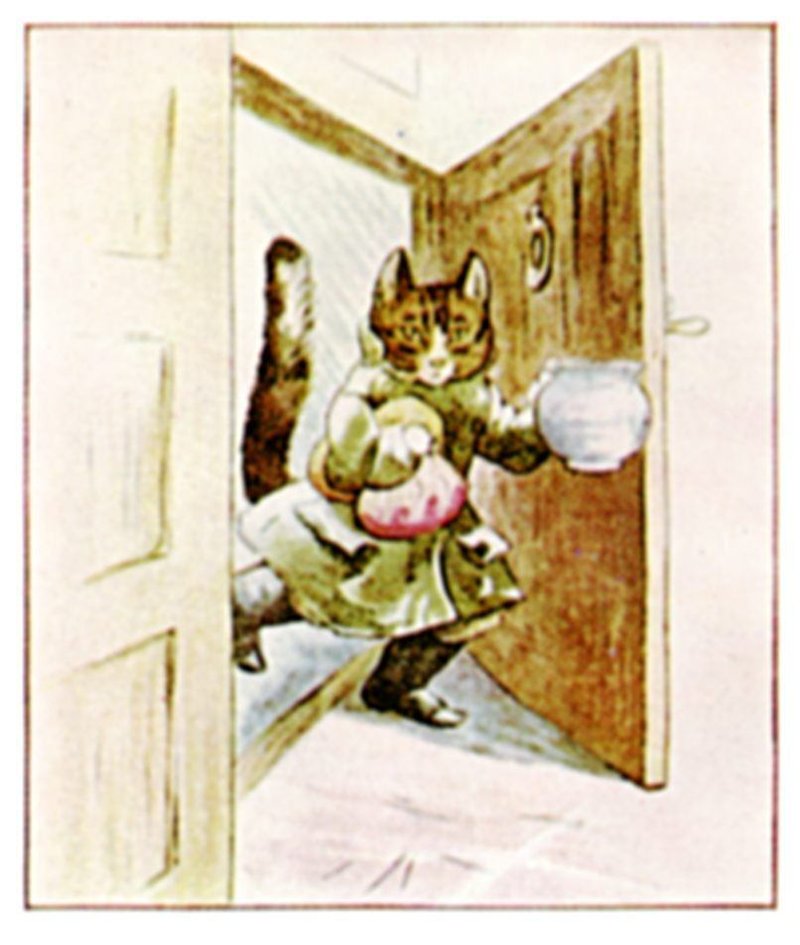
And then all at once they all ran away together down the passage behind the wainscot, squeaking and calling to one another, as they ran from house to house; and not one mouse was left in the tailor's kitchen when Simpkin came back with the pipkin of milk!
Simpkin opened the door and bounced in, with an angry "G-r-r-miaw!" like a cat that is vexed: for he hated the snow, and there was snow in his ears, and snow in his collar at the back of his neck. He put down the loaf and the sausages upon the dresser, and sniffed.
"Simpkin," said the tailor, "where is my twist?"
But Simpkin set down the pipkin of milk upon the dresser, and looked suspiciously at the tea-cups. He wanted his supper of little fat mouse!
そのときでした、いっせいに みんな動き出して、ぬけ道を通ってかべうらへ。ちゅうちゅう おたがいに声かけあいながら、おうちからおうちへ走っていきます。そうして シンプキンが、牛にゅうの入ったびんを持ってかえってくるころには、ふくやさんの台どころにはネズミ1ぴきのこっていません。
ドアをあけて とびこんできたシンプキンは、「ぐーるーるー みゃう!」とうなっており、まるで いきり立ったネコのよう。だって 大の雪ぎらい、耳のなかには雪が入るし、首もとのえりにも雪がつもりますし。戸だなにパンとソーセージをおくと、あたりをくんくん。
「シンプキン、」と ふくやさん。「たのんだ糸はどうした?」
でもシンプキンは、牛にゅうのびんを戸だなにすえると、ティーカップが おかしいとじろじろながめまして。ごはんにころころしたネズミがほしいところだったのに。
【13】
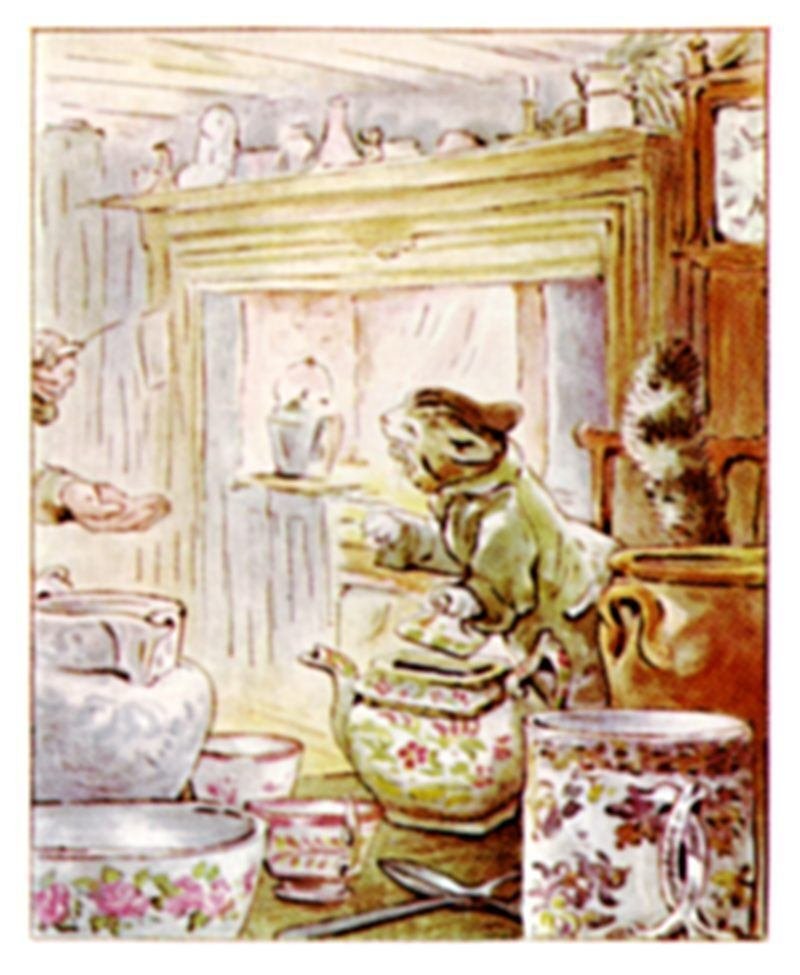
"Simpkin," said the tailor, "where is my TWIST?"
But Simpkin hid a little parcel privately in the tea-pot, and spit and growled at the tailor; and if Simpkin had been able to talk, he would have asked: "Where is my MOUSE?"
"Alack, I am undone!" said the Tailor of Gloucester, and went sadly to bed.
All that night long Simpkin hunted and searched through the kitchen, peeping into cupboards and under the wainscot, and into the tea-pot where he had hidden that twist; but still he found never a mouse!
Whenever the tailor muttered and talked in his sleep, Simpkin said "Miaw-ger-r-w-s-s-ch!" and made strange horrid noises, as cats do at night. For the poor old tailor was very ill with a fever, tossing and turning in his four-post bed; and still in his dreams he mumbled—"No more twist! no more twist!"
「シンプキン、」とふくやさん。「わしの糸はどうした?」
ところが シンプキンはティーポットへひそかにこづつみをかくし、ふくやさんにフーッ ゴロゴロとうなります。もし シンプキンにものが言えたら、こんなかんじでしょうか。「ぼくのねずみはどうした?」
「ああ、しあがらん!」とグロスターのふくやさんはしょげながらもベッドへ。
それから ひとばんじゅうシンプキンは台どころをさがしまわり、戸だなのなかやゆか下、そして 糸をかくしたティーポットのなかなどをのぞきこみます。でも それでもネズミは見あたりません!
ふくやさんが ねごとでぶつぶつぼやくたびに、シンプキンは「みゃうー がるーるーるーうー しーしゅーっ!」とネコが夜よくやるような、へんな ぞくっとするなきかたをするのです。
それもそのはず、かわいそうに、そのふくやのおじいさんはぐあいがひどく わるく、ねつもあって、うなされベッドでもだえていたのですから。ゆめのなかで ずっと うわごと――「糸が 足りない!糸が 足りない!」
【14】
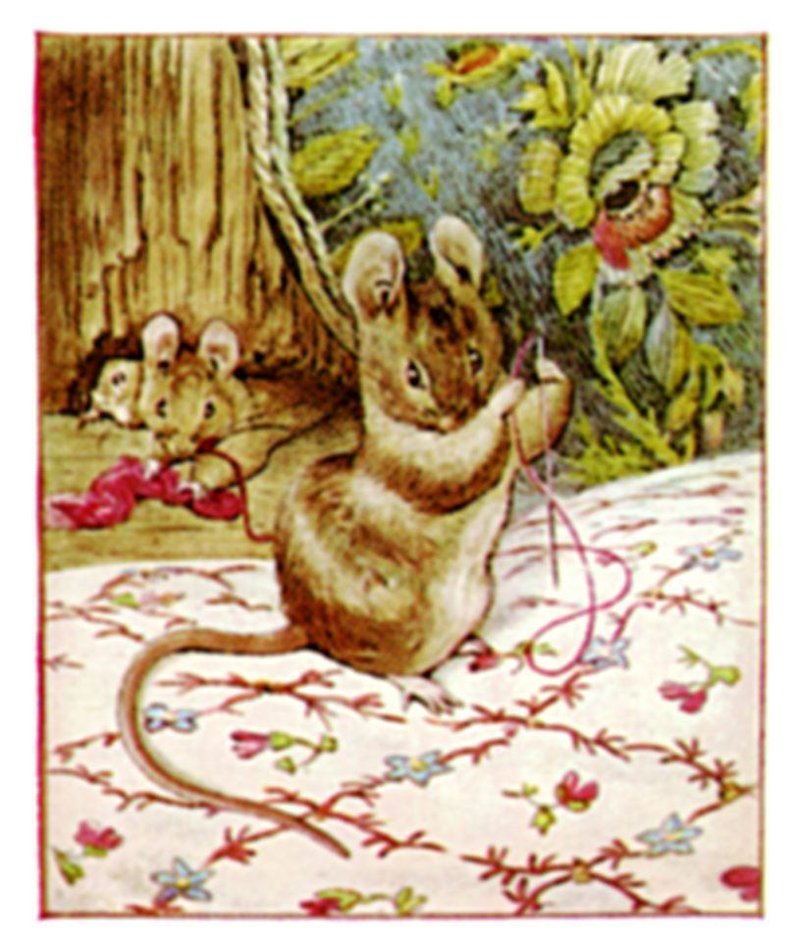
All that day he was ill, and the next day, and the next; and what should become of the cherry-coloured coat? In the tailor's shop in Westgate Street the embroidered silk and satin lay cut out upon the table—one-and-twenty button-holes—and who should come to sew them, when the window was barred, and the door was fast locked?
But that does not hinder the little brown mice; they run in and out without any keys through all the old houses in Gloucester!
その日は ずっとねこんでしまい、そして つぎの日も、そのまたつぎの日も。このままでは あのさくらんぼ色のコートはどうなってしまうのでしょう。 西門通りのふくやさんのお店では、ししゅうされたシルクとサテンの ぬのがさぎょう台におかれたまま――21あるボタンあなも手つかず―― まどもしまっていて、ドアもかたく戸じまりされているとあっては、これでは だれもぬののぬいあわせをすることができません!
でも それでも だいじょうぶなのがいましたね、そう、茶ネズミさんたち。かぎなんかなくても、グロスターじゅうのおうちに出入りできるのです!
【15】
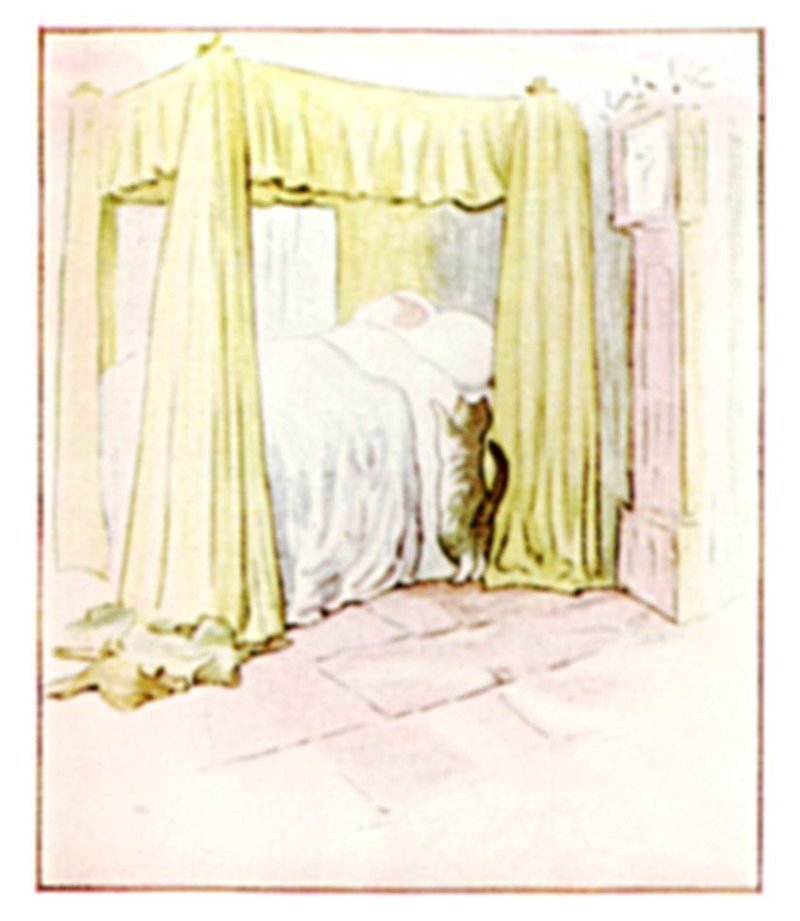
Out of doors the market folks went trudging through the snow to buy their geese and turkeys, and to bake their Christmas pies; but there would be no Christmas dinner for Simpkin and the poor old Tailor of Gloucester.
The tailor lay ill for three days and nights; and then it was Christmas Eve, and very late at night. The moon climbed up over the roofs and chimneys, and looked down over the gateway into College Court. There were no lights in the windows, nor any sound in the houses; all the city of Gloucester was fast asleep under the snow.
And still Simpkin wanted his mice, and he mewed as he stood beside the four-post bed.
おうちを出て市場へゆく人のむれ、雪のなかを足どり重く、ガチョウを買いに行ったり、クリスマスのパイを焼いてもらったり。でも まったくクリスマスのごちそうにはありつけないシンプキンとかわいそうなグロスターの ふくやのおじいさん。
ふくやさんは 3日3ばんねこんでしまいました。そうしてやってきた クリスマスイヴ、夜もたいへんふけたころ。月がやねやえんとつのはるか上にのぼって、大学広場の門がまえのあたりを見下ろしています。まどには あかりもなく、どのおうちにももの音ひとつありません。グロスターの町じゅうがぐっすりねむっていました。
【16】
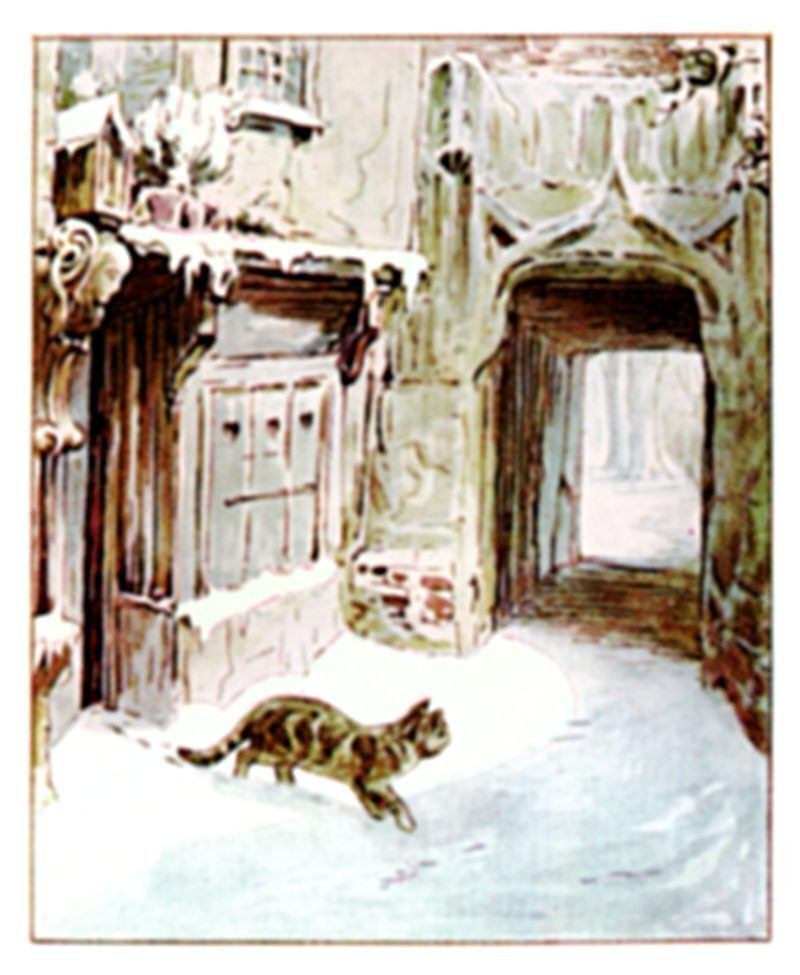
But it is in the old story that all the beasts can talk, in the night between Christmas Eve and Christmas Day in the morning (though there are very few folk that can hear them, or know what it is that they say).
When the Cathedral clock struck twelve there was an answer—like an echo of the chimes—and Simpkin heard it, and came out of the tailor's door, and wandered about in the snow.
From all the roofs and gables and old wooden houses in Gloucester came a thousand merry voices singing the old Christmas rhymes—all the old songs that ever I heard of, and some that I don't know, like Whittington's bells(注).
しかし むかし話となれば、クリスマスイヴの夜からクリスマスの朝にかけては、どんなけものもおしゃべりできるもの(とはいえ その声を聞いたり 言ってることがわかったりする人はほんの少しもいないわけですけれども)。
教会の大時計が12回なると――まるで こだまのように――こたえる声が あちこちから。それを耳にしたシンプキンは、ふくやさんのおうちから 外へ出て、雪のなかをうろうろ。
グロスターのありとあるむかしながらの木のおうちから、クリスマスをよろこぶそれこそ何千というおめでとうの歌声がひびきわたります――どこかで 聞いたことのあるなつかしい歌がほとんどですが、わたくしも聞いたことが ない ウィッティントンの ベル」といった歌もあり。
注:Richard Whittingtonは、昔、貧しい下働きの身からロンドン市長まで出世した(1392)人の逸話。勤めが苦しくて主人から逃げ出そうとして、ロンドンのSt Mary-le-Bow教会の鐘(チャイム)が「もどってこい(Turn again Dick Whittington)」となったとされる。彼は、4度ロンドン市長となっている。(Wikipedia)
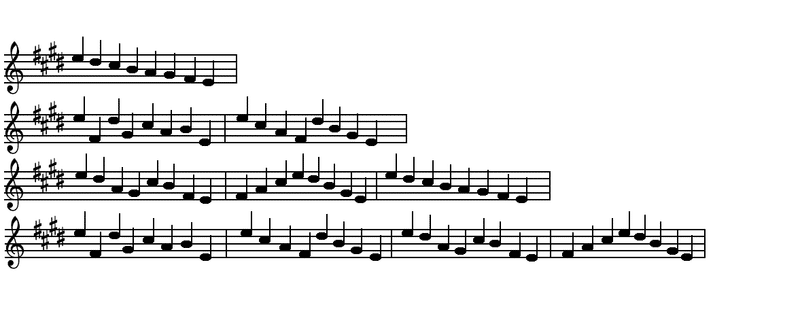
【17】

First and loudest the cocks cried out: "Dame, get up, and bake your pies!"
"Oh, dilly, dilly, dilly!" sighed Simpkin.
And now in a garret there were lights and sounds of dancing, and cats came from over the way.
"Hey, diddle, diddle, the cat and the fiddle! All the cats in Gloucester—except me," said Simpkin.
Under the wooden eaves the starlings and sparrows sang of Christmas pies; the jack-daws woke up in the Cathedral tower; and although it was the middle of the night the throstles and robins sang; the air was quite full of little twittering tunes.
だれより早く大声でオンドリがさけびます、「おくさま、 起きてパイを お焼きなさい!」
「おー、うきうきうき!」と ためいきまじりのシンプキン。
ただいまやねうらにはあかりがついていて、ダンスをするもの音、ネコたちも 通りのむこうからやってきます。 「へい、おどる、おどる、ネコにフィドル! グロスターのネコたちみんなで――ぼくだけのけものにして。」とシンプキン。 のき下では、ムクドリやスズメがクリスマスのパイをうたい、 小ガラスは教会のてっぺんでめざめて、そしてま夜中だというのにツグミと コマドリがさえずり、あたりには小鳥たちの歌がちゅんちゅんみちみちます。
注1:”Dame get up, and bake your pies!"は、クリスマスの時期に歌われる童謡。
Dame, get up and bake your pies,
Bake your pies, bake your pies;
Dame, get up and bake your pies,
On Christmas day in the morning.
Dame, what makes your maidens lie,
Maidens lie, maidens lie?
Dame, what makes your maidens lie,
On Christmas day in the morning?
Dame, what makes your ducks to die,
Ducks to die, ducks to die?
Dame, what makes your ducks to die,
On Christmas day in the morning?
Their wings are cut and they cannot fly,
Cannot fly, cannot fly;
Their wings are cut and they cannot fly,
On Christmas day in the morning.
仮訳
奥さん、起きてパイを焼いて、パイを焼いて、パイを焼いて、
奥さん、起きてパイを焼いて、クリスマスの日の朝に。
奥さん、何でお嬢さんたちが寝てるの、お嬢さんたちが寝てるの、お嬢さんたちが寝てるの?
奥さん、何でお上端たちが寝てるの、クリスマスの日の朝に。
奥さん、何でアヒルが死んでるの、アヒルが死んでるの、アヒルが死んでるの?
奥さん、何でアヒルが死んでるの、クリスマスの日の朝に?
翼がきられて飛ぶことができない、飛ぶことができない、飛ぶことができない。
翼が切られて飛ぶことができない、クリスマスの日の朝に。
注2:”Dilly Dilly”は17世紀から伝わる英国民謡。2015年公開のディズニー実写映画「シンデレラ Cinderella」で使われている。
Lavender's blue, dilly, dilly, lavender's green,
When I am king, dilly, dilly, You shall be queen.
Who told you so, dilly, dilly, who told you so?
'Twas my own heart, dilly, dilly, that told me so.
ラベンダーは青 ラベンダーは緑
僕が王様なら 君は王女
誰がそう言ったの?
僕の心がそう言ったのさ
Call up your men, dilly, dilly, set them to work
Some to the plough, dilly, dilly, some to the fork,
Some to make hay, dilly, dilly, some to cut corn,
While you and I, dilly, dilly, keep ourselves warm.
家来を呼んで 働かせよう
こっちは耕し こっちは熊手
こっちは干し草 こっちは小麦を
その間 僕たちは体を寄せ合っていよう
Lavender's green, dilly, dilly, Lavender's blue,
If you love me, dilly, dilly, I will love you.
Let the birds sing, dilly, dilly, And the lambs play;
We shall be safe, dilly, dilly, out of harm's way.
ラベンダーは緑 ラベンダーは青
僕を愛してくれるなら 君を愛そう
鳥よ歌え 羊よ遊べ
僕らは二人 安らかな時を
I love to dance, dilly, dilly, I love to sing;
When I am queen, dilly, dilly, You'll be my king.
Who told me so, dilly, dilly, Who told me so?
I told myself, dilly, dilly, I told me so.
踊るのが好き 歌うのが好き
私が女王なら 貴方は王様
誰がそう言ったの?
私が自分でそう言ったのよ
以上は、以下の『世界の民謡・童謡』のページから
注3:Hey diddle, diddleはMother Gooseの歌の一つ
Hey diddle, diddle
The cat and the fiddle,
The cow jumped over the moon;
The little dog laughed
To see such sport,
And the dish ran away with the spoon.
へーい ディドゥル、ディドゥル、
ネコ と フィドゥル、
メウシが 月を とびこえた。
こんな おふざけ みた
イヌは けらけら わらった、
おさらは スプーンと にげてった。
以上は、「あさひてらす」Webから
Sesami StreetのHey diddle diddle
【18】

But it was all rather provoking to poor hungry Simpkin!
Particularly he was vexed with some little shrill voices from behind a wooden lattice. I think that they were bats, because they always have very small voices—especially in a black frost, when they talk in their sleep, like the Tailor of Gloucester.
They said something mysterious that sounded like—
"Buz, quoth the blue fly, hum, quoth the bee,
Buz and hum they cry, and so do we!"
and Simpkin went away shaking his ears as if he had a bee in his bonnet.
でもかわいそうに、はらぺこのシンプキンにはぜんぶがちょっと耳ざわり!
とりわけ 木のこうしまどのむこうから聞こえてくる きんきん声にがまんできません。たぶん そのぬしはコウモリでしょう、なにせ あいつらは かなりの小声ですし――それに黒い森 いるときでも ねごとを言ってたりしますからね、グロスターのふくやさんとおんなじで。
その歌声は、いわくありげにこんなふう。
「ばず、と青バエがものいい、はむ、とハチがいう
ばずはむ、と2ひきが音をたてて、われらもまた!」
そうして シンプキンは、ぼうしにハチでもよってきたみたいに、耳を ふりふりすすんでいきます。
注:Buzz, Quoth The Blue Flyは英国の童謡
"quoth”は○○曰く、という古めかしい言い方。
Buzz, quoth the blue fly,
Hum, quoth the bee,
Buzz and hum they cry,
And so do we:
In his ear, in his nose,
Thus, do you see?
He ate the dormouse,
Else it was me.
音源はMusescoreのWEBから
【19】
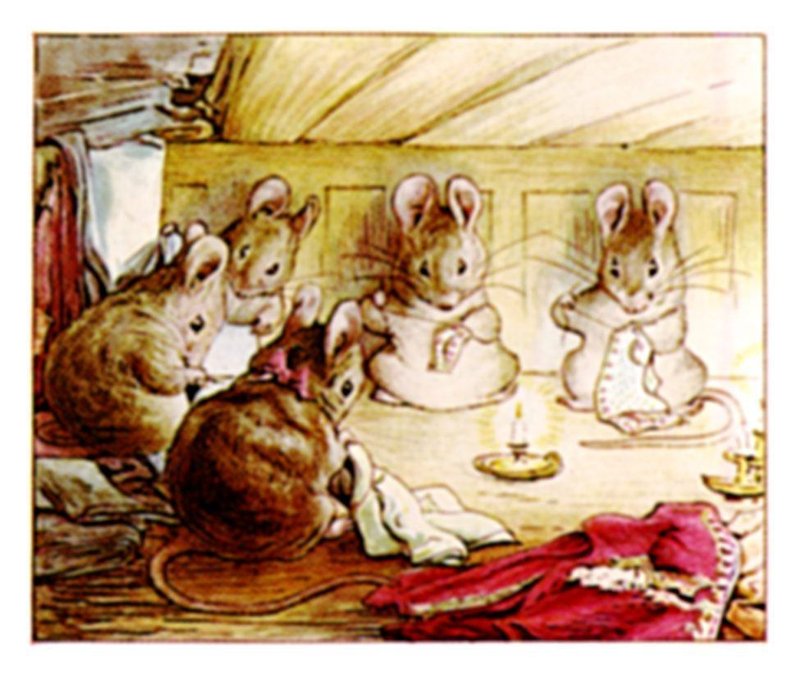
From the tailor's shop in Westgate came a glow of light; and when Simpkin crept up to peep in at the window it was full of candles. There was a snippeting of scissors, and snappeting of thread; and little mouse voices sang loudly and gaily—
"Four-and-twenty tailors
Went to catch a snail,
The best man amongst them
Durst not touch her tail,
She put out her horns
Like a little kyloe cow,
Run, tailors, run! or she'll have you all e'en now!"
Then without a pause the little mouse voices went on again—
"Sieve my lady's oatmeal,
Grind my lady's flour,
Put it in a chestnut,
Let it stand an hour——"
西門にあるふくやさんのお店からは あかりがもれていて、シンプキンがすりよってどからのぞくと、なかはろうそくでいっぱい。それから聞こえてきたのが、はさみのちょきちょき 糸のちくちくいう音、さらにはネズミさんたちのたのしい大きな歌声が――
「24人のふくやさん
マイマイをつかまえにいく
いちばんのつわものでも
そのしっぽをつかめない
つのをだしたその子は
カイローの牛のよう。
にげろふくやよ にげろ! でなきゃぎゃくに やられちまうぞ!」
やすみなく ネズミさんたちの 歌は つづいていきます ――
「おくさまの からすむぎを ふるうのです
おくさまの こむぎこを ひくのです
クリのみに くわえましたらば
小1時間ほど ねかせましょう。」
注1: Four and twenty tailorsはMother Gooseの歌の一つ
Four-and -twenty tailors
Went to kill a snail;
The best man among them
Durst not touch her tail;
She put out her horns
Like a little Kyloe cow.
Run, tailors, run, or
She’ll kill your all just now.
【和訳】
24人の仕立て屋が
かたつむりを殺しに行ったのさ
彼らの中の一番の男が
そのしっぽにも触れない
それは角を出したのさ
カイロー種の牛のようにね
逃げろ、仕立て屋達、逃げろ、そうでないと
みんな今すぐ殺されてしまうぞ
(和訳:By Demi)
二十四人の仕立屋が
ででむしころしに、えっさっさ。
めったにしっぽにゃふれまいぞ。
そりゃこそででむしが角つのだした、
ちっちぇえカイロうしそっくりだ。
にげにげ、にげなきゃいまにもころされる。
(北原白秋訳)
二十と四にんのしたてやさん
かたつむりころしにでかけたが
いちばんできるおとこでさえも
しっぽにさわるゆうきもなかった
かたつむりはつのをだす
ちいさなカイローめうしのように
にげろやにげろしたてやさん
でないといまにもみなごろし
(谷川俊太郎訳)
以上はArt and BooksのWebから
歌は以下のリンクで聴くことができます。
注2:Sieve my lady's oatmealは英国の童謡
Sieve my lady's oatmeal,
Grind my lady's flour,
Put it in a chesnut,
Let it stand an hour;
One may rush, two may rush,
Come, my girls, walk under the bush.
【20】
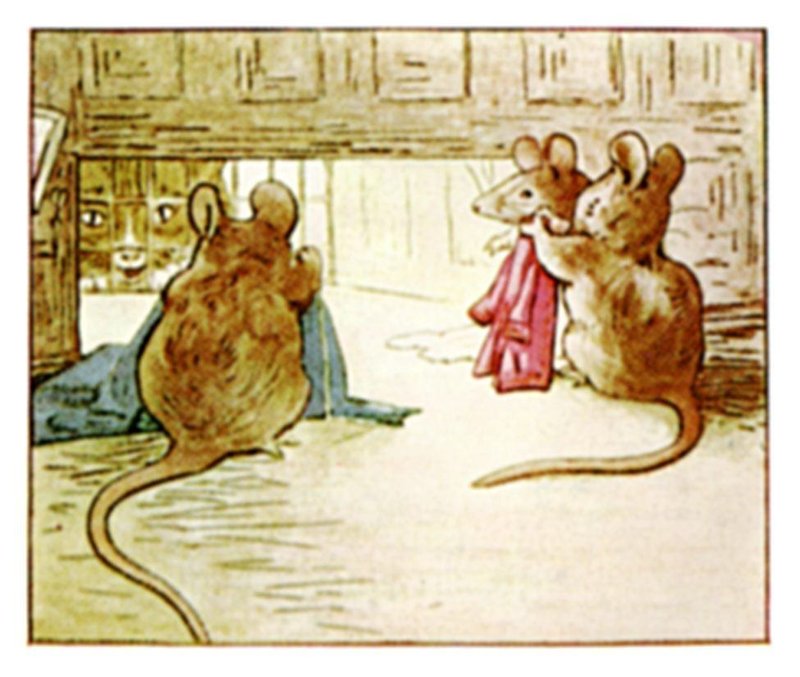
"Mew! Mew!" interrupted Simpkin, and he scratched at the door. But the key was under the tailor's pillow, he could not get in.
The little mice only laugh, and tried another tune—
"Three little mice sat down to spin,
Pussy passed by and she peeped in.
What are you at, my fine little men?
Making coats for gentlemen.
Shall I come in and cut off your threads?
Oh, no, Miss Pussy, you'd bite off our heads!"
「みゅー! みゅー!」と 歌のじゃまをするシンプキン、ドアをひっかきます。でも かぎはふくやさんのまくらの下、なかには入れません。
ネズミさんたちは こばかにしつつ、またべつの歌――
「3ひきのネズミさんが すわって糸まき
通りすがりのネコちゃん のぞきこむ
何をしてるの、 あなたたち?
だんなのコートを 作ってるんだ
糸切りてつだってあげようか?
けっこう、頭をがぶりする つもりだろ?」
注:Three little mice…は、Mother Gooseの中の"Six little mice sat down to spin"をもじったもの。
Six little mice sat down to spin;
Pussy passed by and she peeped in;
"What are you doing, my little men?"
"Weaving coats for gentlemen."
"Shall I come in and cut off your threads?"
"No, no, Mistress Pussy, you'd bite off our heads."
"Oh, no, I'll not; I'll help you to spin."
"That may be so, but you don't come in!"
6匹のハツカネズミが糸紡ぎ
そこにネコさんが通りがかりました
“なにをなさってるの 紳士方”
“紳士の背広を仕立ててるのさ”
“わたしもお手伝いをして 糸切りをしましょうか”
“ご遠慮しますネコさん 頭をかじり切られてはいやですから”
“そんなことはありません 是非手伝わせてちょうだいな”
“かもしれませんけれどネコさん 近寄らないでくださいな”
以上は”Mother Goose Nursery Rhymes”から
【21】

"Mew! Mew!" cried Simpkin. "Hey diddle dinketty?" answered the little mice—
"Hey diddle dinketty, poppetty pet!
The merchants of London they wear scarlet;
Silk in the collar, and gold in the hem,
So merrily march the merchantmen!"
They clicked their thimbles to mark the time, but none of the songs pleased Simpkin; he sniffed and mewed at the door of the shop.
"And then I bought
A pipkin and a popkin,
A slipkin and a slopkin,
All for one farthing——
and upon the kitchen dresser!" added the rude little mice.
"Mew! scratch! scratch!" scuffled Simpkin on the window-sill; while the little mice inside sprang to their feet, and all began to shout at once in little twittering voices: "No more twist! No more twist!" And they barred up the window shutters and shut out Simpkin.
But still through the nicks in the shutters he could hear the click of thimbles, and little mouse voices singing—
"No more twist! No more twist!"
「みゅー!みゅー!」と わめくシンプキン。「へい、おどって うきうきかい?」というのが ネズミさんたちのおへんじ。
「へい おどってうきぴょんの ペットさん
ロンドンのあきんど ぜんしんまっ赤
えりはシルクで ふちどりは金
おきんどたちはうかれて ねりあるき!」
みんな ゆびぬきをかちかち、 リズムをとって、でも どの歌もまったくシンプキンには気に入りません。
「そのとき 買ったのは
土びんと 土なべ
まくらカバーに パジャマ
ひっくるめて はした金で――
それから 台どころの戸だなにちょん!」と さいごにつけたすやんちゃな ネズミさんたち。
「みゅー!がり!がり!」と まどわくととっくみあうシンプキン、そのうち なかのネズミさんたちが ぴょんととびあがって、みんないっせいに ちゅうちゅうとさわぎだします。「糸が足りない! 糸が足りない!」さらに、まどのよろい戸をおろして、シンプキンから見えなくしました。
ですが それでもよろい戸のすきまを通して、ゆびぬきのかちかちする 音が聞こえてきまして、しかも ネズミさんたちの歌声まで――
「糸が足りない! 糸が足りない!」
注1:"Hey diddle dinketty”は英国のはや口言葉。
"Hey diddle dinketty, poppetty pet!
The merchants of London they wear scarlet;
Silk in the collar, and gold in the hem,
So merrily march the merchantmen!"
これは、Mother GooseのHey diddle, diddle(前出)を連想させる。
Hey diddle, diddle
The cat and the fiddle,
The cow jumped over the moon;
The little dog laughed
To see such sport,
And the dish ran away with the spoon.
この歌については、以下の、みむら・みちこさんの解説が詳しい。
注2:"And then I bought A pipkin and a popkin,は、Mother Gooseの以下の歌を連想させる。
I went into my grandmother's garden,
And there I found a farthing.
I went into my next door neighbour's,
There I bought a pipkin and a popkin--
A slipkin and a slopkin,
A nailboard, a sailboard,
And all for a farthing.
【22】
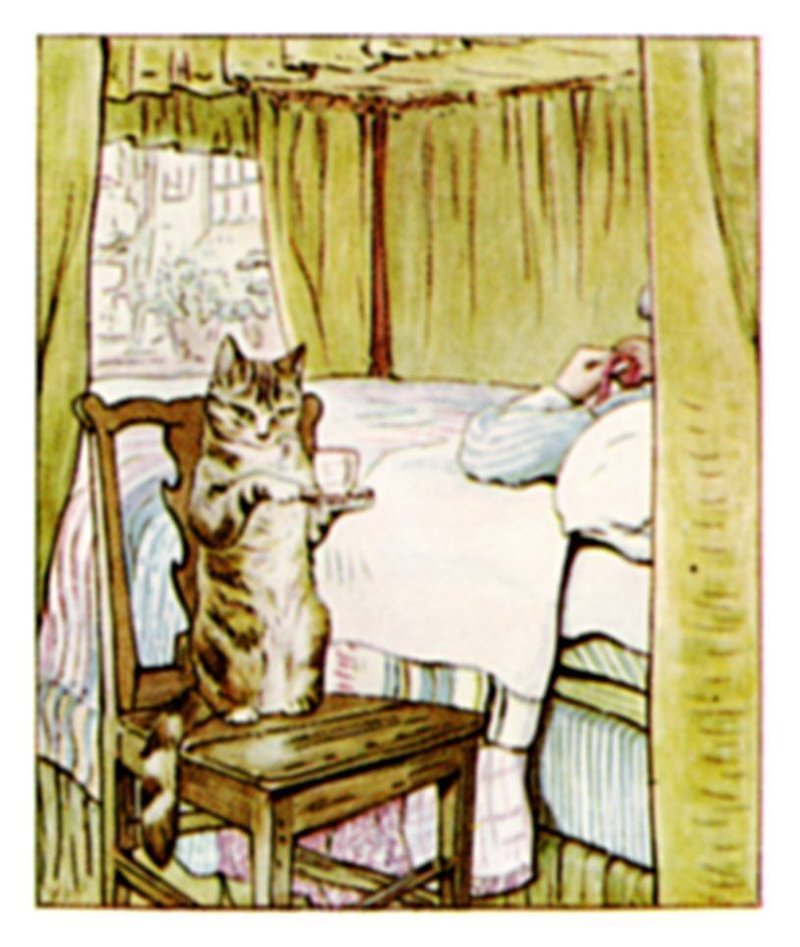
Simpkin came away from the shop and went home, considering in his mind. He found the poor old tailor without fever, sleeping peacefully.
Then Simpkin went on tip-toe and took a little parcel of silk out of the tea-pot, and looked at it in the moonlight; and he felt quite ashamed of his badness compared with those good little mice!
シンプキンは お店をあとにして、おうちにかえって、ひとりかんがえこみます。気づくと、かわいそうだったふくやのおじいさんもねつが引いて、 すやすやねむっていました。
それから シンプキンはつま先立ちで、ティーポットのなかからきぬ糸の 入ったこづつみを取り出し、月あかりでじっとにらみます。すると 何だか はずかしくなってきましてね、あのいい子ちゃんのネズミさんたちにひきかえ、自分はなんていじわるをしたんだろうって!
【23】

When the tailor awoke in the morning, the first thing which he saw upon the patchwork quilt, was a skein of cherry-coloured twisted silk, and beside his bed stood the repentant Simpkin!
"Alack, I am worn to a ravelling," said the Tailor of Gloucester, "but I have my twist!"
The sun was shining on the snow when the tailor got up and dressed, and came out into the street with Simpkin running before him.
The starlings whistled on the chimney stacks, and the throstles and robins sang—but they sang their own little noises, not the words they had sung in the night.
"Alack," said the tailor, "I have my twist; but no more strength—nor time—than will serve to make me one single button-hole; for this is Christmas Day in the Morning! The Mayor of Gloucester shall be married by noon—and where is his cherry-coloured coat?"
朝、ふくやさんが目ざめると、まず 目にとびこんできたのが、パッチワークキルトの上にのった、さくらんぼ色 きぬのより糸1かせ、そして ベッドわきに立っていたのが、ばつのわるそうなシンプキン!
「ああ、ほつれそうなくらいへとへとだ。」という グロスターのふくやさん。「だがもう 糸は足りる!」
おひさまの日が 雪に当たるころ、おきあがったふくやさんはきがえをして、おもてへ出ていきます。先に立ってすすむシンプキン。
ムクドリがやねにつきでた えんとつの上でさえずり、ツグミやコマドリが うたいます――でも 歌はもうただのかすかな音、夜みたいに歌声では ありません。
「ああ、」と ふくやさん。「糸は 足りる。だが 元気が足りない―― 時間も足りない――これでは ボタンあなひとつくらいしかかがれんて。 なんせ もうクリスマスの朝なんだ!お昼には グロスターの町長がけっこんするというに――さくらんぼ色のコートは どこへやらだ。」
注:”Christmas Day in the Morning”は、前出のMother Gooseの歌を連想させる表現。
Dame, get up and bake your pies,
Bake your pies, bake your pies;
Dame, get up and bake your pies,
On Christmas day in the morning.
【24】

He unlocked the door of the little shop in Westgate Street, and Simpkin ran in, like a cat that expects something.
But there was no one there! Not even one little brown mouse!
The boards were swept clean; the little ends of thread and the little silk snippets were all tidied away, and gone from off the floor.
But upon the table—oh joy! the tailor gave a shout—there, where he had left plain cuttings of silk—there lay the most beautifullest coat and embroidered satin waistcoat that ever were worn by a Mayor of Gloucester.
西門通りのささやかな店の戸をあけると、シンプキンはネコらしくまってましたとばかりにとびこみます。
でも そこには何もいません!茶ネズミたちも 1ぴきたりとも!
たなは きれいにそうじされていて、糸くずもきぬの切れはしも みんな すっかり片づいていまして、ゆかにも何もおちていません。
ところが さぎょう台の上には――おおなんと!おもわず声をあげるふくやさん――そこには、ぬのをきりそろえておいてあっただけなのに――かわりに、どこまでもうつくしいコートと、きれいにししゅうされたサテンのチョッキがならんでいたのです。こんなすてきなもの、グロスターの町長さんも はじめてでしょう!
【25】
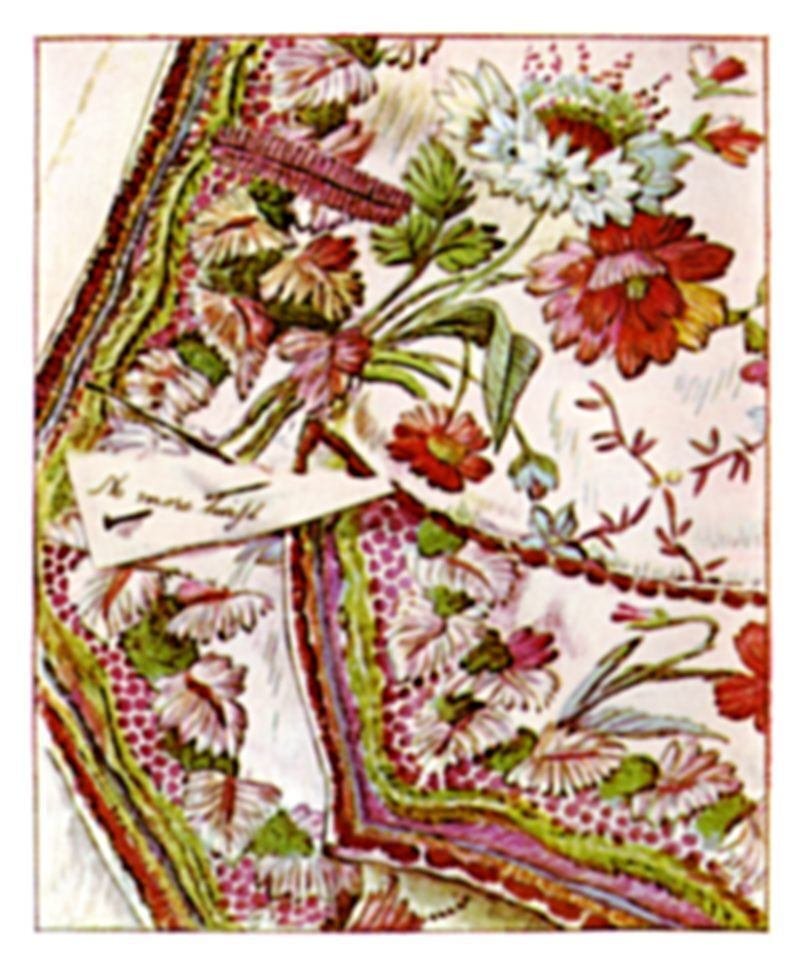
There were roses and pansies upon the facings of the coat; and the waistcoat was worked with poppies and corn-flowers.
Everything was finished except just one single cherry-coloured button-hole, and where that button-hole was wanting there was pinned a scrap of paper with these words—in little teeny weeny writing—
NO MORE TWIST
And from then began the luck of the Tailor of Gloucester; he grew quite stout, and he grew quite rich.
コートのぬいとりには、バラとパンジー、それから チョッキにはケシと キクがあしらわれていて。
なにもかもできあがっていて――あとのこすは さくらんぼ色のボタンあな ひとつのみ。ボタンあなの糸の足りなくなったところに、紙切れがとめられていて、こんなことばがちょろちょろした文字で――
糸が 足りない。
このときから やっとグロスターのふくやさんにも運がむいてきまして、 肉づきもよくなり、お金もたくさん入ってきました。
【26】
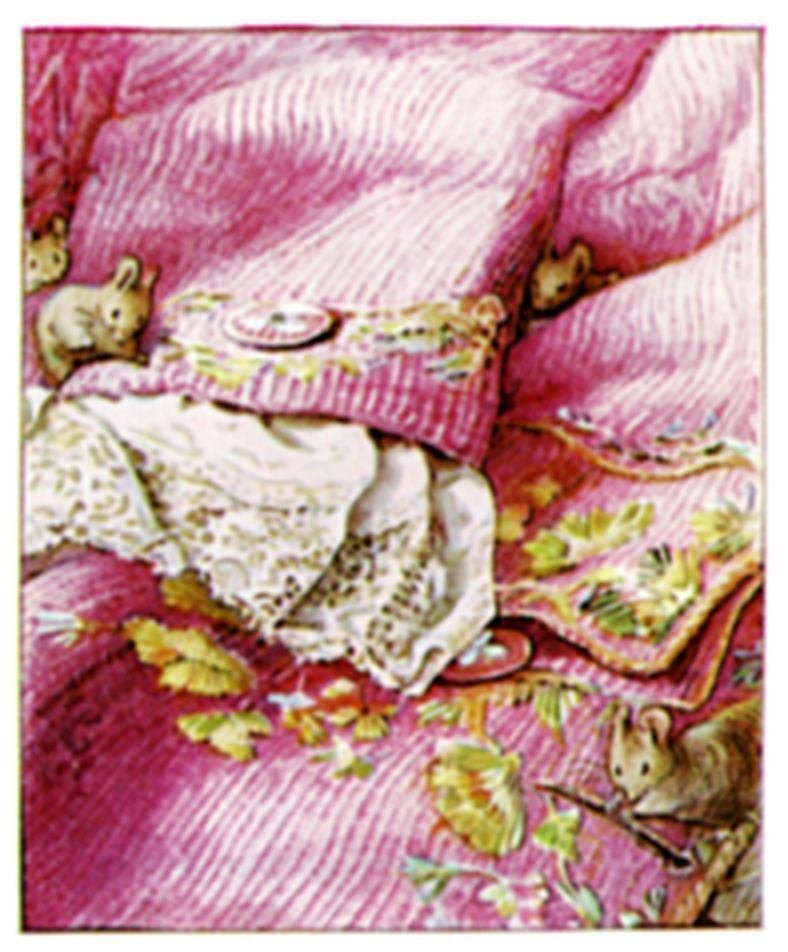
He made the most wonderful waistcoats for all the rich merchants of Gloucester, and for all the fine gentlemen of the country round.
Never were seen such ruffles, or such embroidered cuffs and lappets! But his button-holes were the greatest triumph of it all.
The stitches of those button-holes were so neat—so neat—I wonder how they could be stitched by an old man in spectacles, with crooked old fingers, and a tailor's thimble.
The stitches of those button-holes were so small—so small—they looked as if they had been made by little mice!
おじいさんが作るのは それはだれにもまけないみごとなコートばかり、 グロスターのお金持ちのあきんどたちや、あたりにすむだんながたが こぞってほしがるものとなりました。
こんなひだひだ、それにししゅうつきカフス、たれかざりは見たことがないとのうわさで! でも何よりのじまんはボタンあなでした。
そのボタンあなのかがりかたは、じつにきちっと――きちっとしていて ――メガネをつけたおじいさんが まがったゆびでゆびぬきつけてかがったとは思えないくらい。
そのボタンあなのかがりかたは、本当に細かく――細かくて――まるで ネズミさんたちがやったみたいなのでした!
THE END
背景と解説
この話は、1901年のクリスマスまでに作成されて、Beatrixの家庭教師Annieの娘であり、ピーターラビットの絵手紙を送ったNoelの妹のFreda(当時10歳)に贈られた作品である。その後、ピーターラビット・シリーズとしてはストーリーは二作目となった、『りすのナトキンのおはなし』(The Tale of Squirrel Nutkin, 1903)が8月に出版されたのに次いで10月に商業出版されている。
話のもととなっているのは、Gloucesterに伝わる、貧しい仕立て屋のお話であり、Beatrixは、従弟のCaroline Huttonから1897年ごろにその話を聞いたとされている。その話とは、Beatrixとは同世代でGloucesterに住んでいたJohn Prichard(1877-1934)が、市長のためにスーツを作ったものであり、月曜日の朝に店に戻ったら、スーツがボタンホールを残して出来上がっており、そこには、「糸が足りなかった」と書かれたノートが置かれていたというもの。彼の助手が夜のうちに仕立ててくれていたものであったが、この半紙をPrichardが助手ではなく妖精がやった仕事として18世紀のお話として語ったものである。
Beatrixは、Gloucesterの街をスケッチし、また、ロンドンのChelseaでは、仕立て屋の許しを得て、店内のスケッチを行っていた。後に、この作品を贈呈している。Caroline Hutonの御者の息子がTailorのモデルとしてポーズをとったとされる。また、近所にあったSouth Kensington Museum(現在のRoyal Albert Museum)に足を運び、衣装部門を訪れ、18世紀の服装のイラストの参考としていた。
出版されて本の中には、前作、前々作に比べてページ数が多く、白黒の絵も多い。それでも、出版段階ではかなりのページが割愛されたといい、特に、「歌」の部分が削られたという。街頭や店内など、絵の作風がことなっているが、Beatrixは、ターナーが好きな画家のひとりとのことだったので、色の使い方は影響を受けたのかもしれない。また、父の知人で会った、画家のジョン・エヴァレット・ミレーとも親交があったということであり、ミレーらが興していた「ラファエル前派」の影響も受けている。ラファエル前派の一つの特徴は、すべてのディーティルを書き込むことで、絵のどこにも焦点があり影がなくなり絵全体としては平板になる。
Beatrixは、この話を、個人的にはもっとも好きなものと語っている。
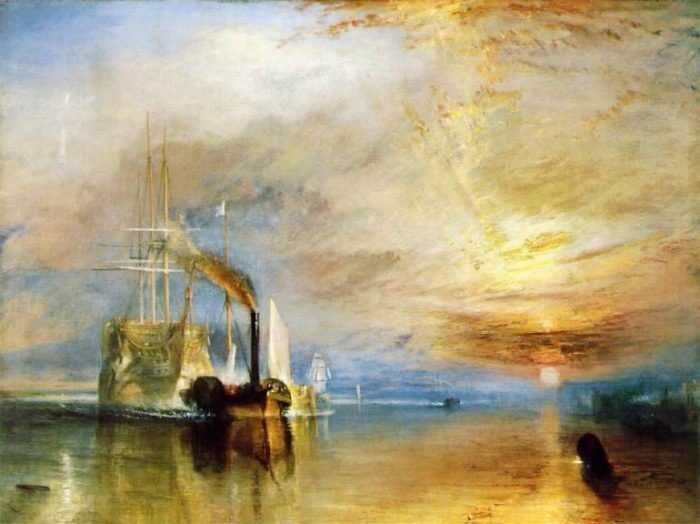
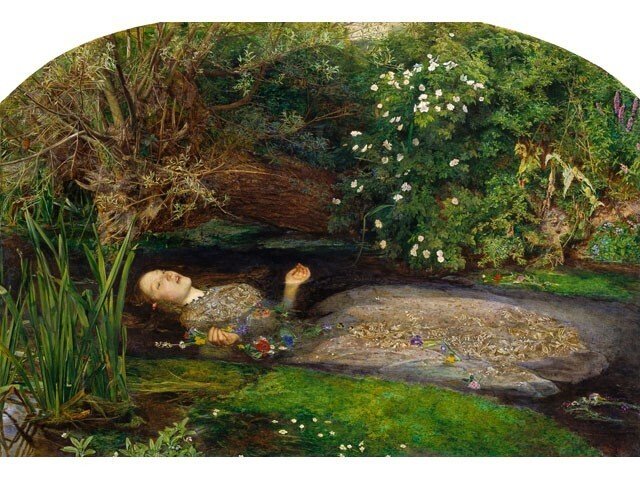
タイトル、リズム
この表題となっている、The Tailor of Gloucesterの”Tailor”は、音が似ている”Tale”を引っ掛けたものとなっている。なので、意図としては、The Tale of the Tailor of Gloucester”である。
”No more twist”が何度かでてくるが、twistは”よった糸”であり、また、”ねじれたもの”でもある。なので、「糸が足りない」、「おふざけはやめろ(いじわるはやめろ)」の二つの意味がかかった言葉となっている。
文章は、リズムを意識してつくられ、同じ音を繰り返すような工夫がされている。以下の文例では、始めの句の中で、"l(エル)”と”s(エス)”、”p(ピー)”が繰り返されている。また、the Tailor of Gloucester(或いは、the Mayor of Gloucester, the houses of Gloucesterなど)が響きの良い言葉として何度も登場している。
(文例)
All day long while the light lasted he sewed and snippeted, piecing out his satin and pompadour, and lutestring; stuffs had strange names, and were very expensive in the days of the Tailor of Gloucester.
【Mother Goose】
元のストーリーにはいっていたとされるNursary Rhymesは、Mother Gooseを想起させるものが多数あったのかもしれない。この、出版された版の中でも、ネズミたちよる仕立て屋の中の以下の歌は、Mother Gooseの"Sing a Song of Sixpense"を想起させる。
(文中の節)
But that does not hinder the little brown mice; they run in and out without any keys through all the old houses in Gloucester!
でも それでも だいじょうぶなのがいましたね、そう、茶ネズミさんたち。かぎなんかなくても、グロスターじゅうのおうちに出入りできるのです!
は、マザーグースのHumpty Dumptyの有名な一節を連想させる。なんでもできるという反対の意味で使われているのが面白い。
マザーグース
Humpty Dumpty sat on a wall.
Humpty Dumpty had a great fall.
All the king's horses and all the king's men couldn't put Humpty Dumpty together again.
ハンプティ・ダンプティ、壁の上に座って、
ハンプティ・ダンプティ、ドシンと落ちた。
王様の馬のみんなも王様の家来のみんなもハンプティを元には戻せなかった。
文中の以下の歌はマザーグースの中の一節である。
Sieve my lady’s oatmeal;
Grind my lady’s flour
put it in a chestnut
Let it sand an hour
おくさまの からすむぎを ふるうのです
おくさまの こむぎこを ひくのです
クリのみに くわえましたらば
小1時間ほど ねかせましょう。
(文中の歌)
"Four-and-twenty tailors
Went to catch a snail,
The best man amongst them
Durst not touch her tail,
She put out her horns
Like a little kyloe cow,
Run, tailors, run! or she'll have you all e'en now!"
24人のふくやさん
マイマイをつかまえにいく
いちばんのつわものでも
そのしっぽをつかめない
つのをだしたその子は
カイローの牛のよう。
は、マザーグースの中の『24人の仕立て屋』そのものである。
二十四人の仕立屋が
ででむしころしに、えっさっさ。
めったにしっぽにゃふれまいぞ。
そりゃこそででむしが角つのだした、
ちっちぇえカイロうしそっくりだ。
にげにげ、にげなきゃいまにもころされる。
(北原白秋訳)
、また、有名な『6ペンスの歌』を想起させる。
(Sing a Song of Sixpense)
Sing a song of sixpence,
A pocket full of rye;
Four-and-twenty blackbirds
Baked in a pie!
When the pie was opened
The birds began to sing;
Was not that a dainty dish
To set before the king?
The king was in his counting-house,
Counting out his money;
The queen was in the parlor,
Eating bread and honey.
The maid was in the garden,
Hanging out the clothes;
When down came a blackbird
And snapped off her nose.
66ペンスの唄を歌おう
ポケットにはライ麦がいっぱい
24羽の黒ツグミ
パイの中で焼き込められた
パイを開けたらそのときに
歌い始めた小鳥たち
なんて見事なこの料理
王様いかがなものでしょう?
王様お倉で
金勘定
女王は広間で
パンにはちみつ
メイドは庭で
洗濯もの干し
黒ツグミが飛んできて
メイドの鼻をついばんだ
また、以下の歌は、『Three Blind Mice』と『Pussy cat, pussy cat where have you been?』を連想させる。
(文中の歌)
"Three little mice sat down to spin,
Pussy passed by and she peeped in.
What are you at, my fine little men?
Making coats for gentlemen.
Shall I come in and cut off your threads?
Oh, no, Miss Pussy, you'd bite off our heads!"
「3ひきのネズミさんが すわって糸まき
通りすがりのネコちゃん のぞきこむ
何をしてるの、 あなたたち?
だんなのコートを 作ってるんだ
糸切りてつだってあげようか?
けっこう、頭をがぶりする つもりだろ?」
(マザーグース)三匹のめくらねずみ
Three blind mice! See how they run!
They all ran after the farmer's wife,
Who cut off their tails with a carving knife.
Did you ever see such a thing in your life
As three blind mice?
3匹の盲目ねずみ 走る姿を見てごらん
農家の奥さんを追っかけてるよ
彼女がナイフでねずみのしっぽを切ったんだ
今までこんな光景みたことあるかい?
(マザーグース)子ネコちゃん、子ネコちゃん、どこにいってたの?
Pussy cat, pussy cat, where have you been?
I've been to London to look at the queen.
Pussy cat, pussy cat, what did you there?
I frightened a little mouse under her chair.
子ネコちゃん,子ネコちゃん,どこいってたの?
ロンドンまで 女王さまを見に。
子ネコちゃん,子ネコちゃん,なにをしたの?
おいすの下の 子ネズミを おどしてやったよ
また次の歌は、マザーグースの中にある早口言葉の詩(ストーリーはナンセンス)を連想させる。
"Hey diddle dinketty, poppetty pet!
The merchants of London they wear scarlet;
Silk in the collar, and gold in the hem,
So merrily march the merchantmen!"
「へい おどってうきぴょんの ペットさん
ロンドンのあきんど ぜんしんまっ赤
えりはシルクで ふちどりは金
おきんどたちはうかれて ねりあるき!」
(マザーグース)
Hey diddle, diddle
The cat and the fiddle,
The cow jumped over the moon;
The little dog laughed
To see such sport,
And the dish ran away with the spoon.
へーい ディドゥル、ディドゥル、
ネコ と フィドゥル、
メウシが 月を とびこえた。
こんな おふざけ みた
イヌは けらけら わらった、
おさらは スプーンと にげてった。
(文中の歌)
"And then I bought
A pipkin and a popkin,
A slipkin and a slopkin,
All for one farthing——
そのとき 買ったのは
土びんと 土なべ
まくらカバーに パジャマ
ひっくるめて はした金で――
(マザーグース)おばあさんの庭で
I went into my grandmother's garden,
And there I found a farthing.
I went into my next door neighbour's;
There I bought a pipkin and a popkin,
A slipkin and a slopkin,
A nailboard, a sailboard,
And all for a farthing.
朗読事例
似た話:グリムの『こびとと靴や』(The Elves and the Shoemaker)
There was once a shoemaker, who worked very hard and was very honest: but still he could not earn enough to live upon; and at last all he had in the world was gone, save just leather enough to make one pair of shoes.
あるところに、くつ屋さんがおりました。自分がわるいことをしたわけでもないのにとにかくお金がなくて、一足のくつを作るだけの皮しかもう残っていません
.Then he cut his leather out, all ready to make up the next day, meaning to rise early in the morning to his work. His conscience was clear and his heart light amidst all his troubles; so he went peaceably to bed, left all his cares to Heaven, and soon fell asleep. In the morning after he had said his prayers, he sat himself down to his work; when, to his great wonder, there stood the shoes all ready made, upon the table. The good man knew not what to say or think at such an odd thing happening. He looked at the workmanship; there was not one false stitch in the whole job; all was so neat and true, that it was quite a masterpiece.
ある夜、あくる朝に仕立てようと皮を裁ち切っておきました。心根のよい人でしたから、ひそやかにベッドで横になりながら、おいのりをとなえつつ、ねむりに落ちます。朝になって、おいのりしたあとで、さて仕事に取りかかろうとすると、気づけば一足のくつはとうに仕上がり出来上がっていて、つくえにちょこなんと立てられているのです。びっくりたまげたその人は何とも言えずに、間近に見てみようと、くつを手に取りました。すばらしい出来のくつで、ぬい目も寸分まちがいなく、まるで、たくみの手になるもののよう。
The same day a customer came in, and the shoes suited him so well that he willingly paid a price higher than usual for them; and the poor shoemaker, with the money, bought leather enough to make two pairs more. In the evening he cut out the work, and went to bed early, that he might get up and begin betimes next day; but he was saved all the trouble, for when he got up in the morning the work was done ready to his hand. Soon in came buyers, who paid him handsomely for his goods, so that he bought leather enough for four pair more. He cut out the work again overnight and found it done in the morning, as before; and so it went on for some time: what was got ready in the evening was always done by daybreak, and the good man soon became thriving and well off again.
まもなく、お客さんがやってきましたが、もう大まんぞくでしたので、よけいにお金を支払ってくれました。つまり今度は二足分のくつが作れるほどの皮が買えたわけです。そして夜になって、あくる朝、気持ちも新たに仕立てようと皮を裁ち切っておきました。ところがその手はかからずじまい。というのも、起きたときにはもう出来上がっていたからで、お客さんにとっても申し分なし、お金がたんまりふところに入って、次には四足分のくつが作れるだけの皮があがなえました。さらにあくる朝早くには、仕上がった四足のくつ、こんな調子がどんどん続いていきます。夜に裁ち切っておけば、朝には勝手に出来上がっていて。たちまち暮らしも立つようになり、とうとうお金もちになりました。
One evening, about Christmas-time, as he and his wife were sitting over the fire chatting together, he said to her, ’I should like to sit up and watch tonight, that we may see who it is that comes and does my work for me.’ The wife liked the thought; so they left a light burning, and hid themselves in a corner of the room, behind a curtain that was hung up there, and watched what would happen.
クリスマスも近いある夜、皮も裁ち終わったくつ屋さんは、ベッドに入る前におくさんに言いました。「今夜ためしに寝ずの番をして、どなたが手助けしてくれているのか、たしかめてみるのはどうかね。」おくさんもうなずいて、明かりもつけておくことにしました。部屋のすみにひそんで、自分たちの前には服をかけておいて、そこからのぞきみるのです。
As soon as it was midnight, there came in two little naked dwarfs; and they sat themselves upon the shoemaker’s bench, took up all the work that was cut out, and began to ply with their little fingers, stitching and rapping and tapping away at such a rate, that the shoemaker was all wonder, and could not take his eyes off them. And on they went, till the job was quite done, and the shoes stood ready for use upon the table. This was long before daybreak; and then they bustled away as quick as lightning.
すると夜がふけたころ、目にとびこんできたのは、ふたりの小人さん、服は何も着ておらず、くつ屋さんの仕事づくえの前にじん取ると、したくずみの仕事に取りかかり、まずはぬって、ちくちくとんとん、小さな指でたくみにすばやく、くつ屋さんも目をはなせず、どぎもをぬかれてしまいました。手を止めないまま、やがて出来上がると、つくえの上にちょこなんと立てて、ぴょんととびおりて走りさっていきます。
The next day the wife said to the shoemaker. ’These little wights have made us rich, and we ought to be thankful to them, and do them a good turn if we can. I am quite sorry to see them run about as they do; and indeed it is not very decent, for they have nothing upon their backs to keep off the cold. I’ll tell you what, I will make each of them a shirt, and a coat and waistcoat, and a pair of pantaloons into the bargain; and do you make each of them a little pair of shoes.’
あくる朝、おくさんがくつ屋さんに言うには、「あの小人さんたちが、わたしたちをお金もちにしたのですから、お礼をしなくちゃなりませんよ。走り回っているのに、何も身につけるものがありませんから、寒そうでかないません。よろしいですか、ちいさな下着に、上着に、それからチョッキとズボンをぬいますよ。それに一足ずつ、くつ下もぬいますから、あなたはそれぞれに、くつを一足、作ってあげなさいな。」
The thought pleased the good cobbler very much; and one evening, when all the things were ready, they laid them on the table, instead of the work that they used to cut out, and then went and hid themselves, to watch what the little elves would do.
だんなさんも、ぜひにということで、その夜、仕事をやり終えると、裁ち切った皮のかわりに、心づくしのおくりものを、つくえにそろえておいて、小人たちがどうふるまうのか、見とどけることにしました。
About midnight in they came, dancing and skipping, hopped round the room, and then went to sit down to their work as usual; but when they saw the clothes lying for them, they laughed and chuckled, and seemed mightily delighted.
夜もふけて、とびこんできた小人さんたちが、さあ仕事と思ったところ、見つかるのは皮のきれではなく、ぴったり体に合った小ぎれいなおめしもの。小人もびっくり立ちすくみましたが、たちまちうれしくなってためしてみます。そわそわどたばた、すてきなおめしものを手に取って着こむと、歌をうたってくれました。
Then they dressed themselves in the twinkling of an eye, and danced and capered and sprang about, as merry as could be; till at last they danced out at the door, and away over the green.
さ ぼくらも おしゃれさん!
もう くつ屋は にあわない!
そして小人さんたちは、足ぶみしながらおどり回り、いすにつくえにとびはねて、とうとう戸口からおどり出ていきました。
The good couple saw them no more; but everything went well with them from that time forward, as long as they lived.
そして小人さんたちは、足ぶみしながらおどり回り、いすにつくえにとびはねて、とうとう戸口からおどり出ていきました。
注:英文と日本語訳は最後の方で少しずれがあります。伝承されている話のヴァリエーションだろうと思います。
英語テキストは以下のリンクから
翻訳は大久保ゆうさんの訳で青空文庫から
『ベンジャミンバニーのおはなし』(The Tale of Benjamin Bunny)(1904)
『ベンジャミンバニーのおはなし』(The Tale of Benjamin Bunny, 1904)は、シリーズ4作目となる。ストリーとしては、一作目のThe Tale of Peter Rabbitの続編で、PeterがMcGregorさんの農園で失った服を、従弟のBenjaminとともに取り返しにいくストリー。邦訳は、大久保ゆうさんによるもので、青空文庫に掲載されているものである。大久保ゆうさんの訳では、一つ一つの単語の間にスペースが挿入されているが、読みやすいように、「句」を意識して省いてある。
https://www.aozora.gr.jp/cards/001505/files/51346_38346.html
BY BEATRIX POTTER

AUTHOR OF "THE TAIL OF PETER RABBIT," &C. NEW YORK
FOR THE CHILDREN OF SAWREY FROM OLD MR. BUNNY
ソーヤー村の子どもたちに、年取ったウサギから。
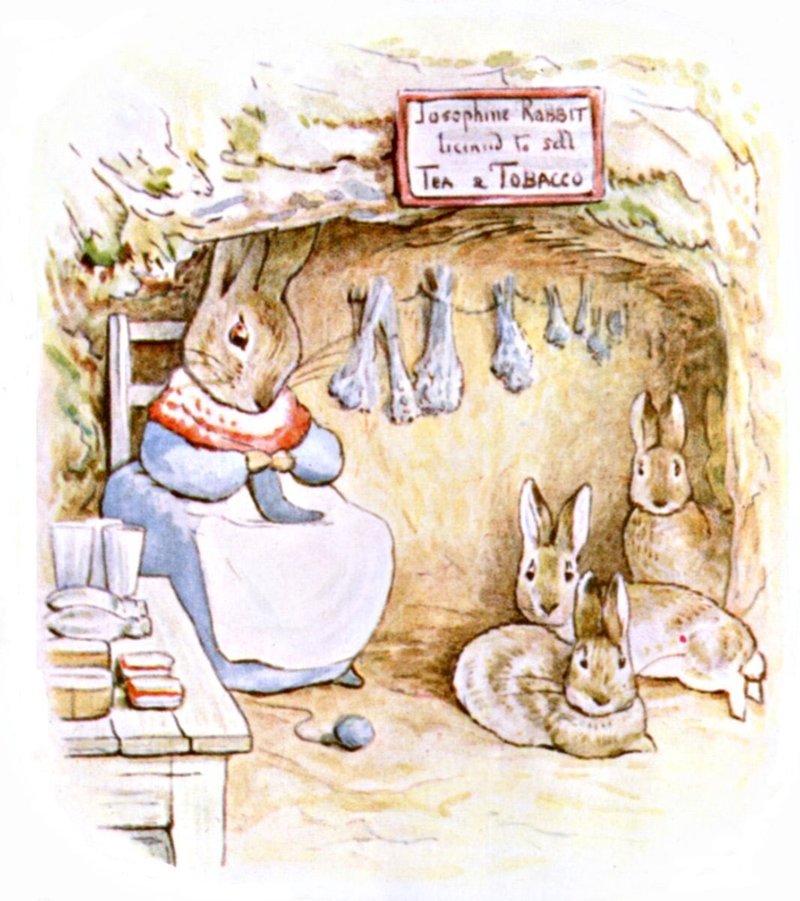
【8-9ページ】

One morning a little rabbit sat on a bank.
He pricked his ears and listened to the trit-trot, trit-trot of a pony.
A gig was coming along the road; it was driven by Mr. McGregor, and beside him sat Mrs. McGregor in her best bonnet.
あるひのあさ 1ぴきのこうさぎが、こみちのわきのどてに すわっておりました。
みみをたてて こうまのパカランパカランというあしおとを きいていたのです。
みちをすすむのは 1だいのばしゃで、 うんてんしゅはマグレガーおじさん、わきには よそいきのぼうしをかぶった マグレガーおばさんもいました。
【10-11ページ】
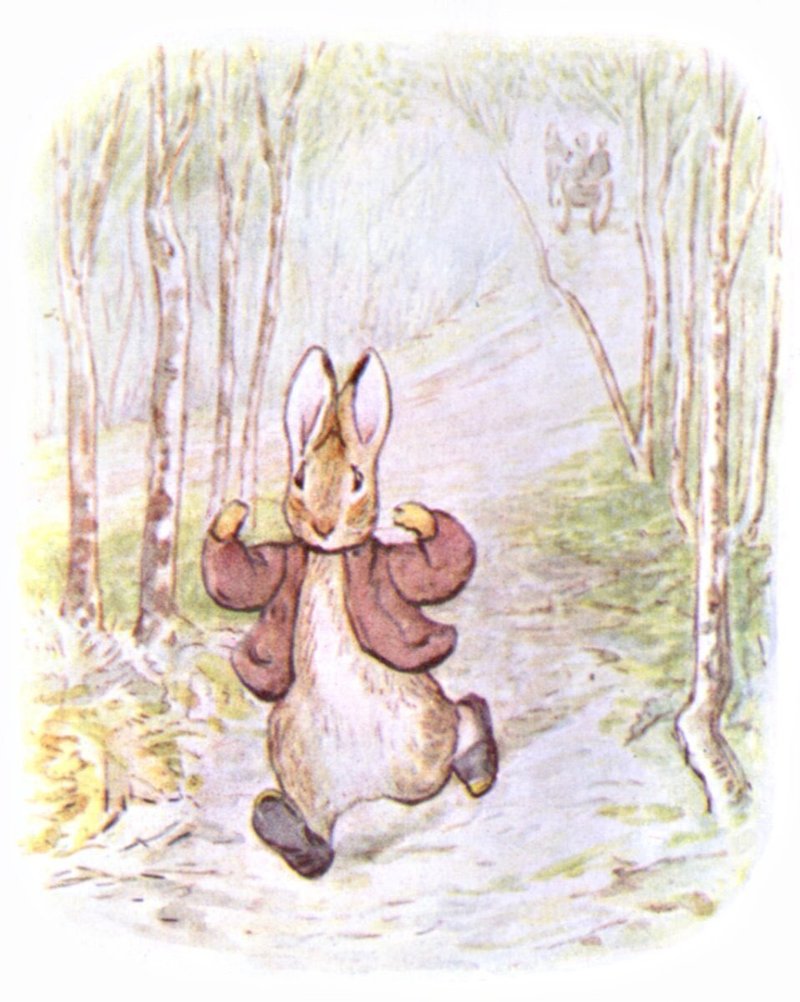
As soon as they had passed, little Benjamin Bunny slid down into the road, and set off—with a hop, skip, and a jump—to call upon his relations, who lived in the wood at the back of Mr. McGregor's garden.
ばしゃがいってしまうと、ばにばにベンジャミンくんは すぐさまみちへとすべりおりて、かけだしました――ひょい、ぴょんぴょん、びょおうん―― マグレガーさんのおにわのうらのもりにすむ しんせきのおうちをたずねるのです。
【12-13ページ】
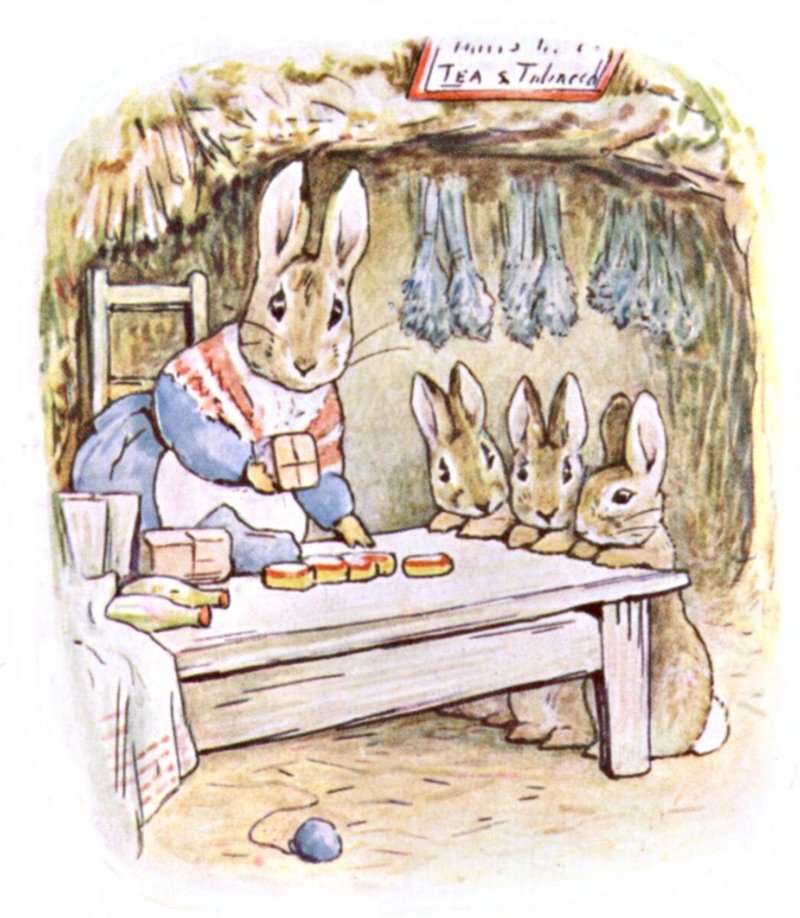
That wood was full of rabbit holes; and in the neatest, sandiest hole of all lived Benjamin's aunt and his cousins—Flopsy, Mopsy, Cotton-tail, and Peter.
そのもりには うさぎあなが いたるところにあって、そのなかでも いちばんきちんとしていてふかふかなのが ベンジャミンのおばとそのいとこたち――フロプシー モプシー カトンテル ピーター――のおうちなのです。
Old Mrs. Rabbit was a widow; she earned her living by knitting rabbit-wool mittens and muffatees (I once bought a pair at a bazaar). She also sold herbs, and rosemary tea, and rabbit-tobacco (which is what we call lavender).
あなうさパパは もういないので、 あなうさママが うさぎのけいとで てぶくろやリストバンドをあんで、くらしをたてていました。(わたしも このまえ バザーでかったんですよ。)そのほか ハーブや ローズマリーの おちゃ、あなうさタバコ(いわゆる ラベンダー)なんてものも うっています。
【14-15ページ】
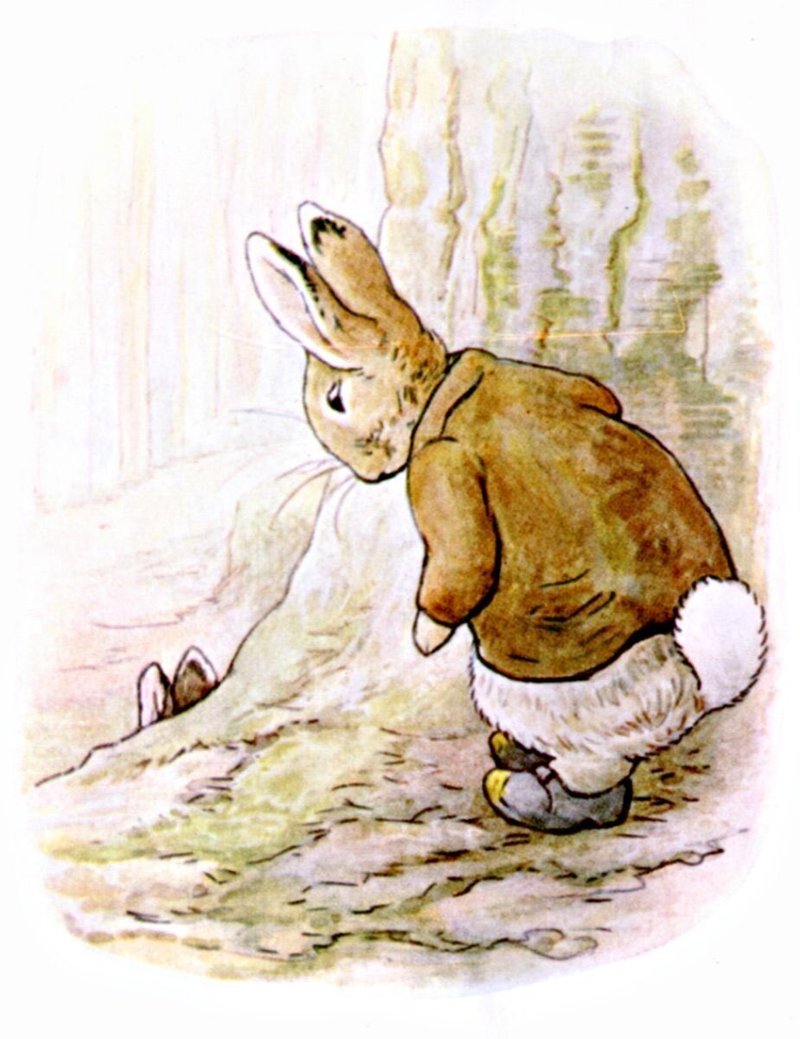
Little Benjamin did not very much want to see his Aunt.
He came round the back of the fir-tree, and nearly tumbled upon the top of his Cousin Peter.
ベンジャミンくんは あまり おばさんとは あいたくなくて。
そこで モミのきの うらにまわったのですが、 あやうく いとこのピーターのまうえへ ころげおちそうに なりました。
【16-17ページ】
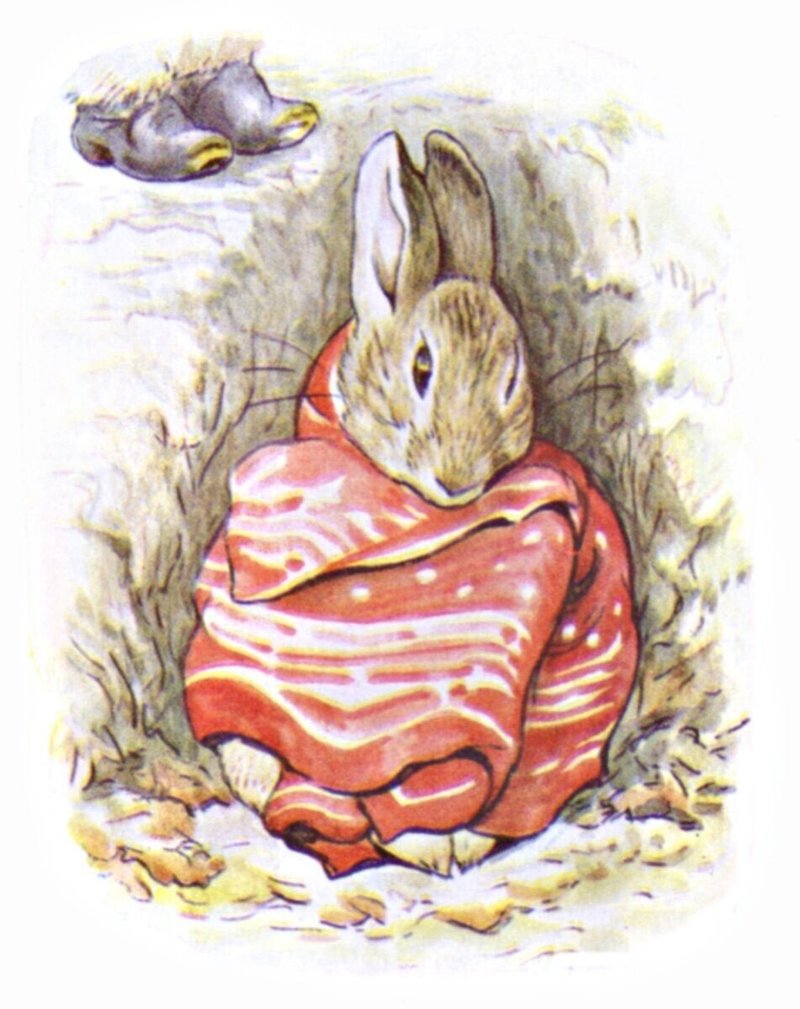
Peter was sitting by himself. He looked poorly, and was dressed in a red cotton pocket-handkerchief.
ピーターが ひとりで からだを まるめていたのです。 どうも げんきが なさそうで、 あかい わたげの ハンカチに くるまっていました。
"Peter," said little Benjamin, in a whisper, "who has got your clothes?"
「ピーター」、とベンジャミンが言いました。「きみのふく、だれにとられたんだよ?」
【18-19ページ】
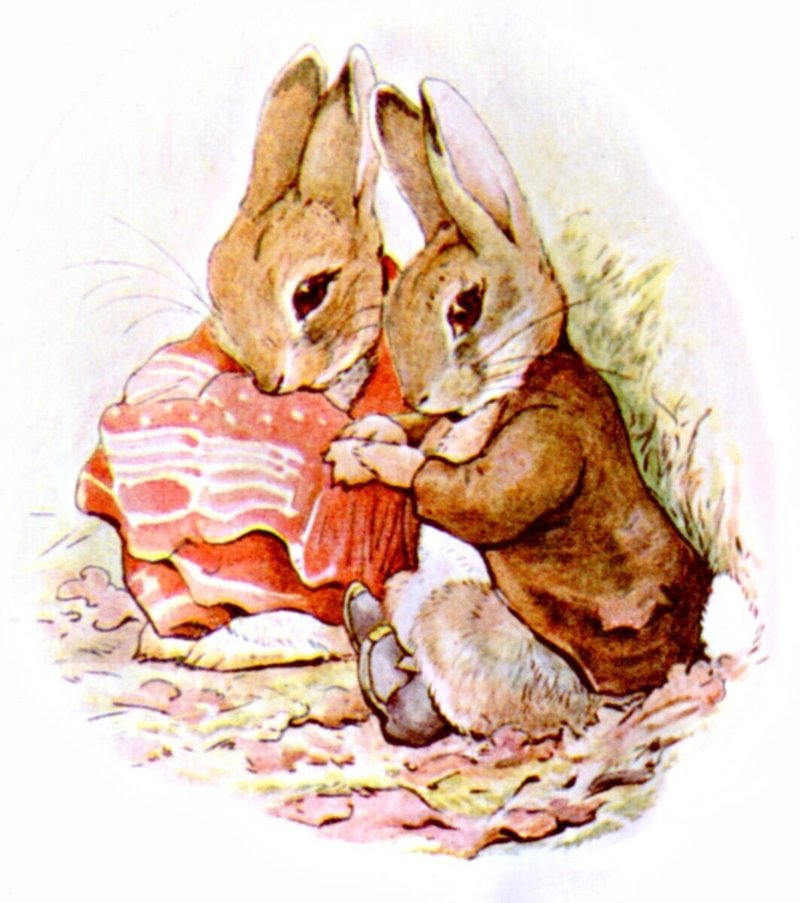
Peter replied, "The scarecrow in Mr. McGregor's garden," and described how he had been chased about the garden, and had dropped his shoes and coat.
ピーターの へんじは 「マグレガーおじさんの にわの かかしさ。」 それから にわで おいかけまわされたこと、 くつと ふくを なくしたことを せつめいしました。
Little Benjamin sat down beside his cousin and assured him that Mr. McGregor had gone out in a gig, and Mrs. McGregor also; and certainly for the day, because she was wearing her best bonnet.
ベンジャミンくんは いとこの わきに こしを おろして ちからづよく かたります。 マグレガーおじさんが ばしゃで でかけたこと、 おばさんも いっしょだということ、 しかも よそいきの ぼうしだったから 1にちじゅう でかけっぱなしだと いうことを。
【20-21ページ】
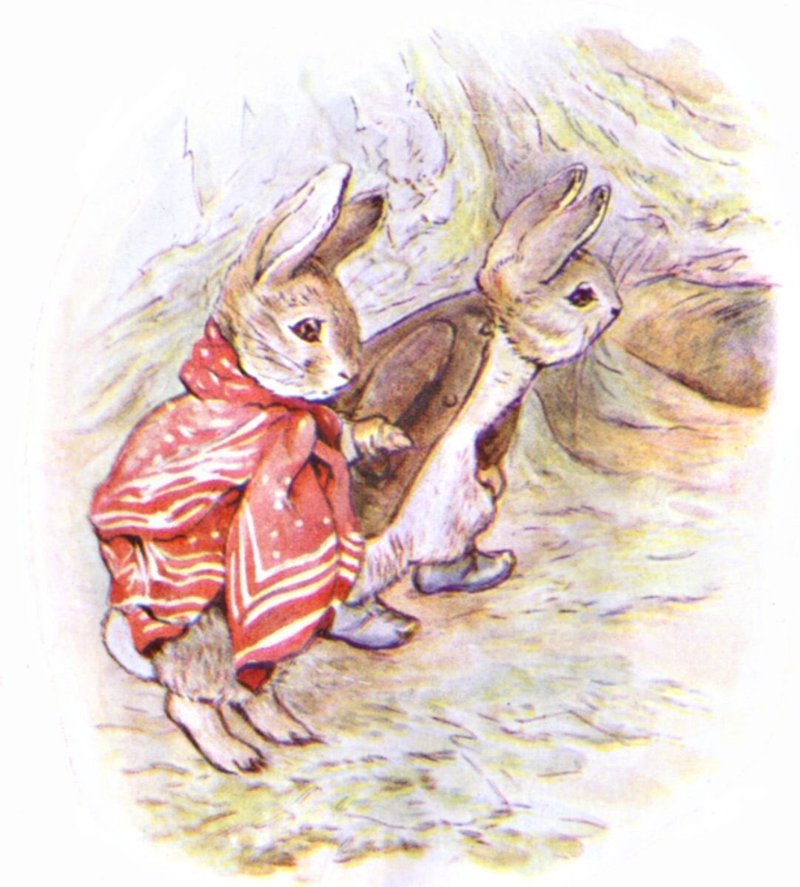
Peter said he hoped that it would rain.
At this point old Mrs. Rabbit's voice was heard inside the rabbit hole, calling: "Cotton-tail! Cotton-tail! fetch some more camomile!"
Peter said he thought he might feel better if he went for a walk.
ピーターは、あめでもふればいい、といいました。
とそのとき、あなうさママのこえが うさぎあなのなかから きこえてきます。「カトンテル! カトンテル! ちょっと カモミールをとってきて!」
ピーターは、 さんぽにいけば たぶん きぶんもよくなる、といいました。
【22-23ページ】
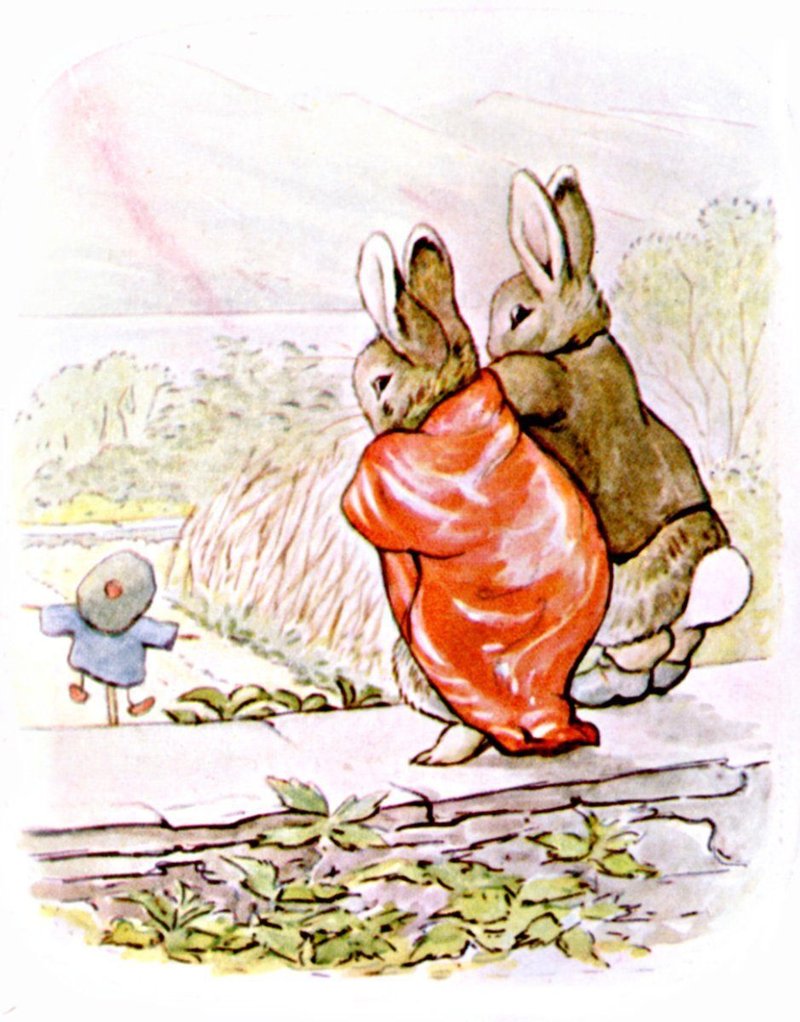
They went away hand in hand, and got upon the flat top of the wall at the bottom of the wood. From here they looked down into Mr. McGregor's garden. Peter's coat and shoes were plainly to be seen upon the scarecrow, topped with an old tam-o'-shanter of Mr. McGregor's.
ふたりは てをつないで どんどんあるき、もりはずれの いしがきのうえ、ひらたいところに のぼりました。 そこから マグレガーおじさんの にわがみおろせるのです。 ピーターのうわぎとくつが かかしのところに あるのが はっきりとわかって、あたまには マグレガーおじさんの おふるのベレーぼう。
【24-25ページ】
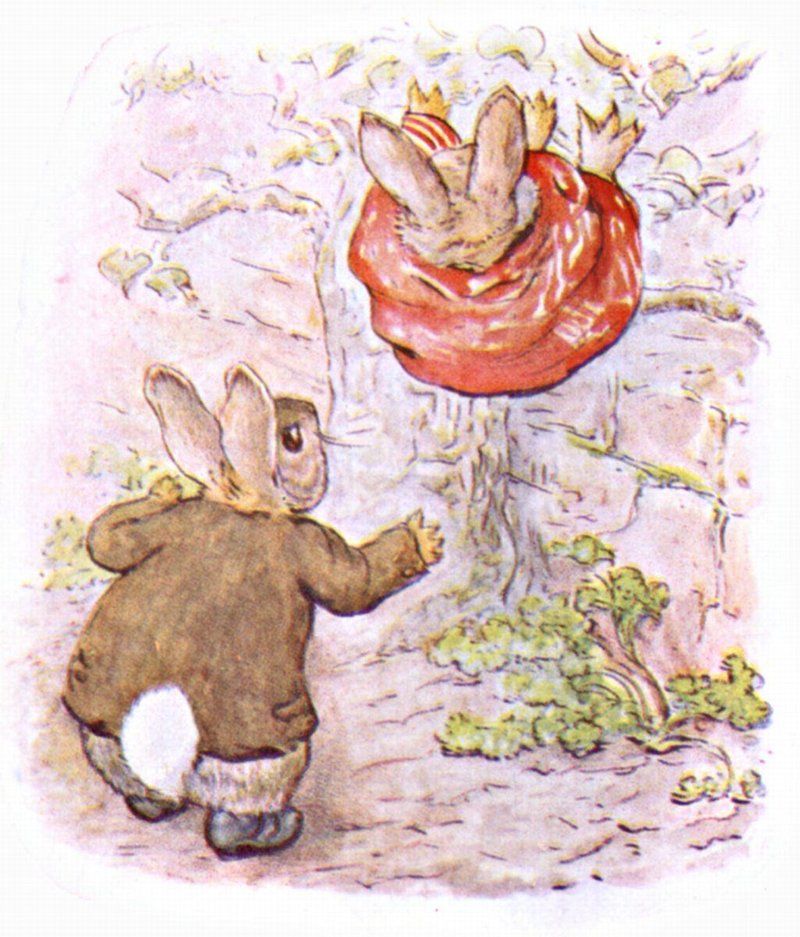
Little Benjamin said: "It spoils people's clothes to squeeze under a gate; the proper way to get in is to climb down a pear-tree."
Peter fell down head first; but it was of no consequence, as the bed below was newly raked and quite soft.
ベンジャミンくんがいいます。「さくのしたをくぐりぬけたら なんだって ふくがだめになる。ナシのきをつたっておりれば うまくしのびこめるんだ。」
ピーターが あたまからおっこちましたが ことなきをえました。したの なえどこが たがやされたばかりで ふかふかだったのです。
【26-27ページ】

It had been sown with lettuces.
They left a great many odd little footmarks all over the bed, especially little Benjamin, who was wearing clogs.
そこにまかれていたのは レタスのたねでした。
ふたりは なえどこのあちこちに ちいさくあやしげなあしあとを たくさんつけます。きぐつをはいたベンジャミンくんは とくにもう。
【28-29ページ】

Little Benjamin said that the first thing to be done was to get back Peter's clothes, in order that they might be able to use the pocket-handkerchief.
They took them off the scarecrow. There had been rain during the night; there was water in the shoes, and the coat was somewhat shrunk.
Benjamin tried on the tam-o'-shanter, but it was too big for him.
ベンジャミンくんのはなしでは、まずやるべきことは ピーターのふくを とりもどすこと、そうすれば ハンカチもつかえるようになるとか。
というわけで かかしははだかにされました。よるのあいだに あめがふったので、くつには みずがはいっていて、うわぎも ちょっぴりちぢんでいました。
ベンジャミンは ベレーぼうもかぶってみましたが かなりぶかぶかです。
【30-31ページ】
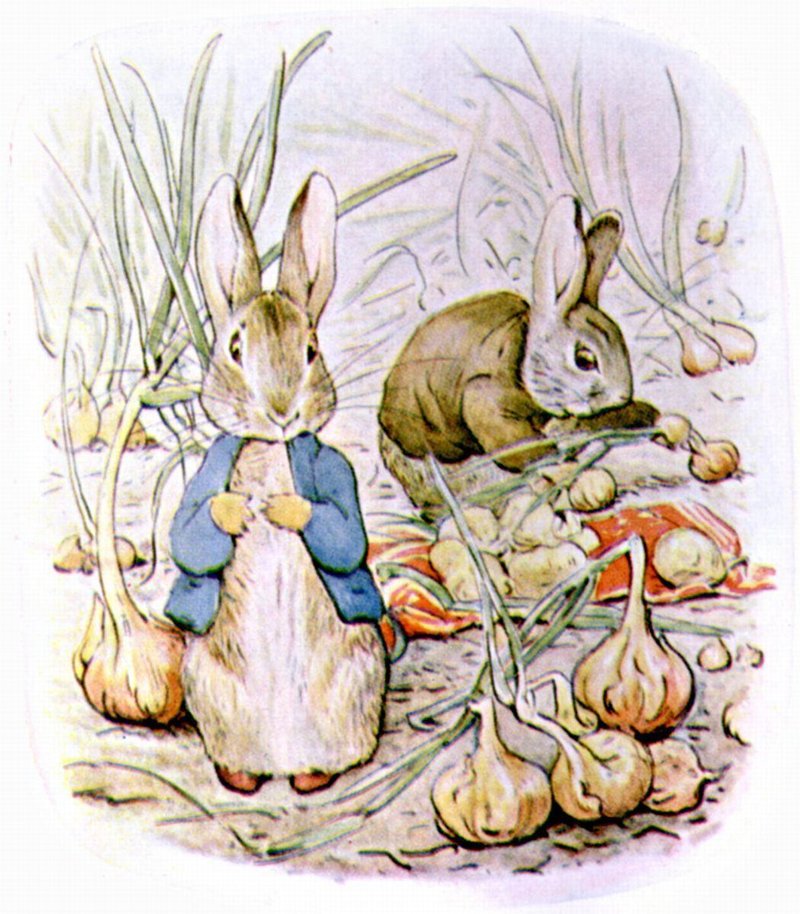
Then he suggested that they should fill the pocket-handkerchief with onions, as a little present for his Aunt.
Peter did not seem to be enjoying himself; he kept hearing noises.
そのあと タマネギをハンカチでつつんで おばさんへの ささやかなおみやげにしようと いいだしました。
ピーターはたのしくなさそうでした。みみが がんがんしっぱなしなのです。
【32-33ページ】
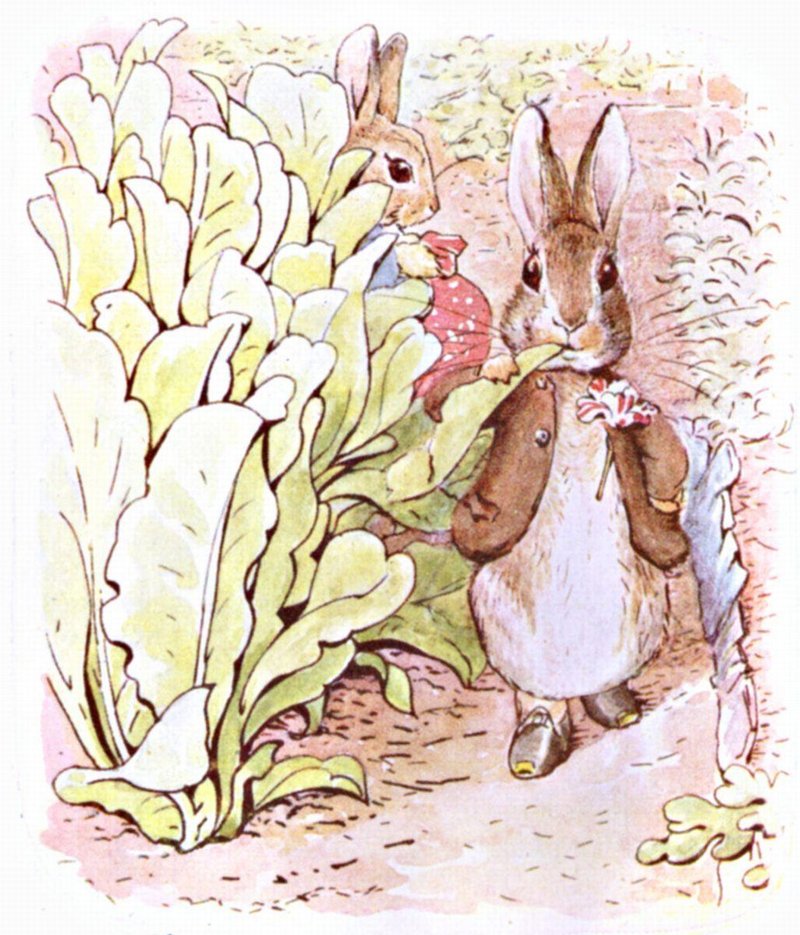
Benjamin, on the contrary, was perfectly at home, and ate a lettuce leaf. He said that he was in the habit of coming to the garden with his father to get lettuces for their Sunday dinner.
(The name of little Benjamin's papa was old Mr. Benjamin Bunny.)
The lettuces certainly were very fine.
それにひきかえ ベンジャミンは まったくわがものがおで、レタスのはっぱをかじります。なんでも いつも おとうさんといっしょに このにわに やってきては レタスをとって にちようびのごちそうにするのだとか。
(ちなみに ベンジャミンくんの おとうさんのなまえは ばにばにパパさんといいます。)
もちろん いいできのレタスをです。
【34-35ページ】
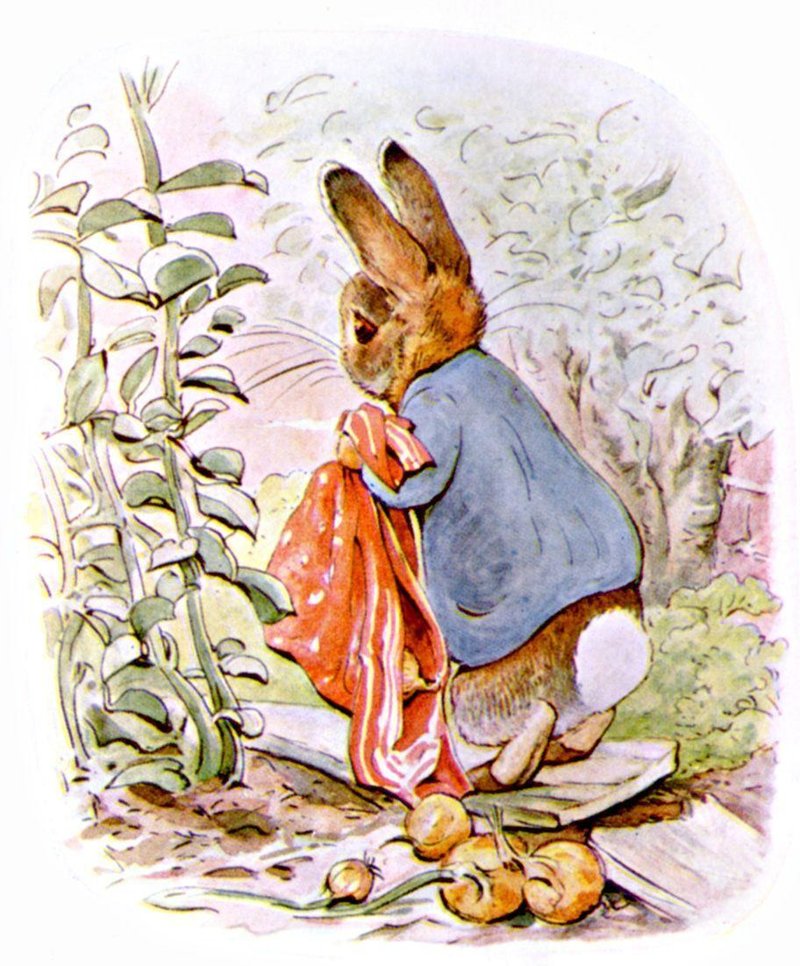
Peter did not eat anything; he said he should like to go home. Presently he dropped half the onions.
ピーターは なににもくちをつけず、おうちにかえりたいといいだしました。とたんに タマネギをはんぶんおっことします。
【36-37ページ】
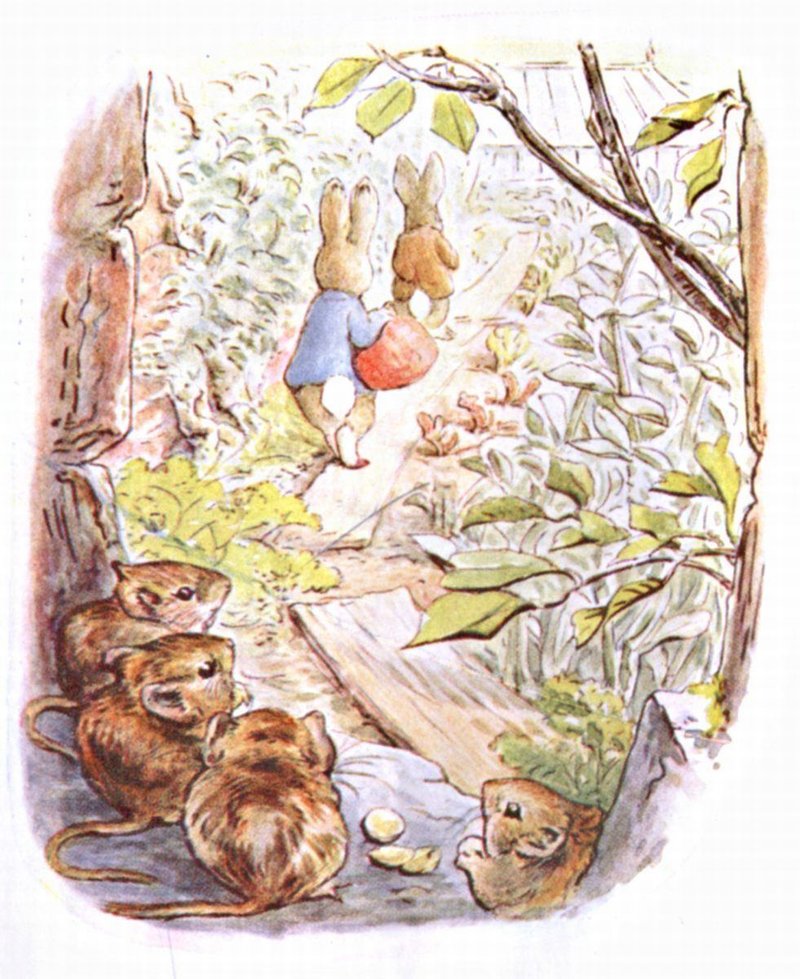
Little Benjamin said that it was not possible to get back up the pear-tree with a load of vegetables. He led the way boldly towards the other end of the garden. They went along a little walk on planks, under a sunny, red brick wall.
The mice sat on their doorsteps cracking cherry-stones; they winked at Peter Rabbit and little Benjamin Bunny.
ベンジャミンくんは、やさいをせおったままじゃ ナシのきはのぼれないな、といいました。さきにたって ずかずかと にわのはんたいがわへと あるいていきます。ふたりがとおったのは あかるいいろのれんがべいの した、いたをわたしたこみちでした。
ねずみたちが とぐちだんのところで サクランボのたねをわっていたのですが、あなうさピーターと ばにばにベンジャミンくんが とおりすぎたので めをぱちくりさせました。
【38-39ページ】
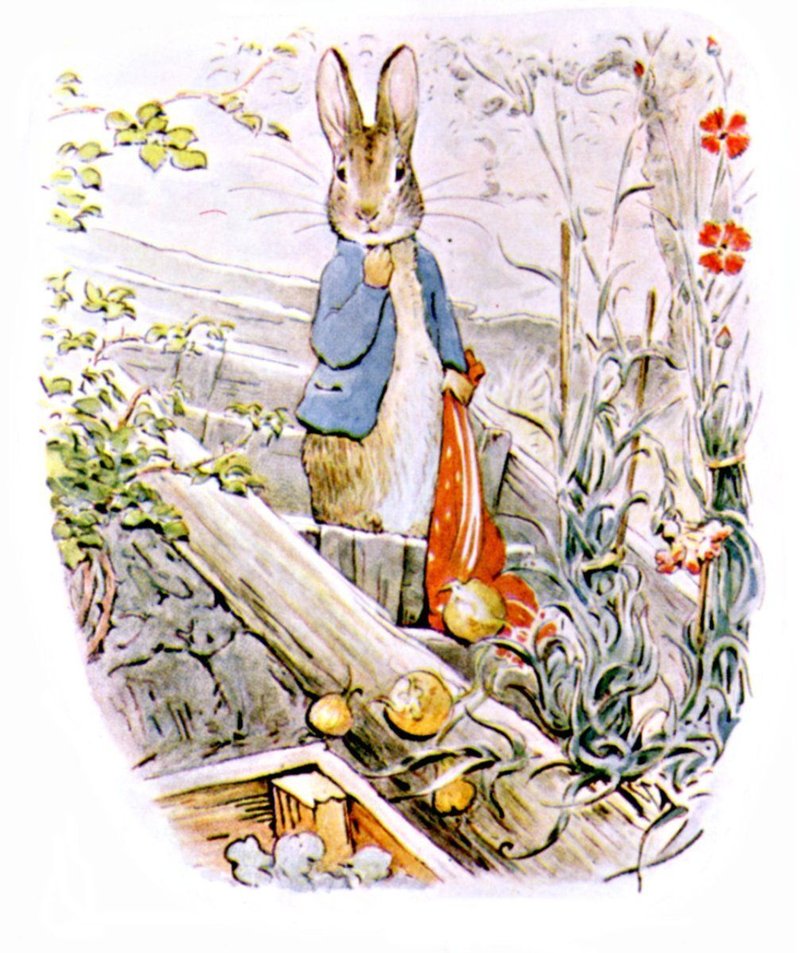
Presently Peter let the pocket-handkerchief go again.
そのうち ピーターは またしても ハンカチからてをはなしてしまいます。
【40-41ページ】

They got amongst flower-pots, and frames, and tubs. Peter heard noises worse than ever; his eyes were as big as lolly-pops!
He was a step or two in front of his cousin when he suddenly stopped.
ふたりは うえきばちとなえばこと ひらばちのならんだところへやってきました。ピーターのみみなりは ますますひどくなって、めなんかあめだまみたいにはれあがって!
いとこの すうほまえをあるいていたのですが、いきなりたちどまってしまいます。
【42-43ページ】
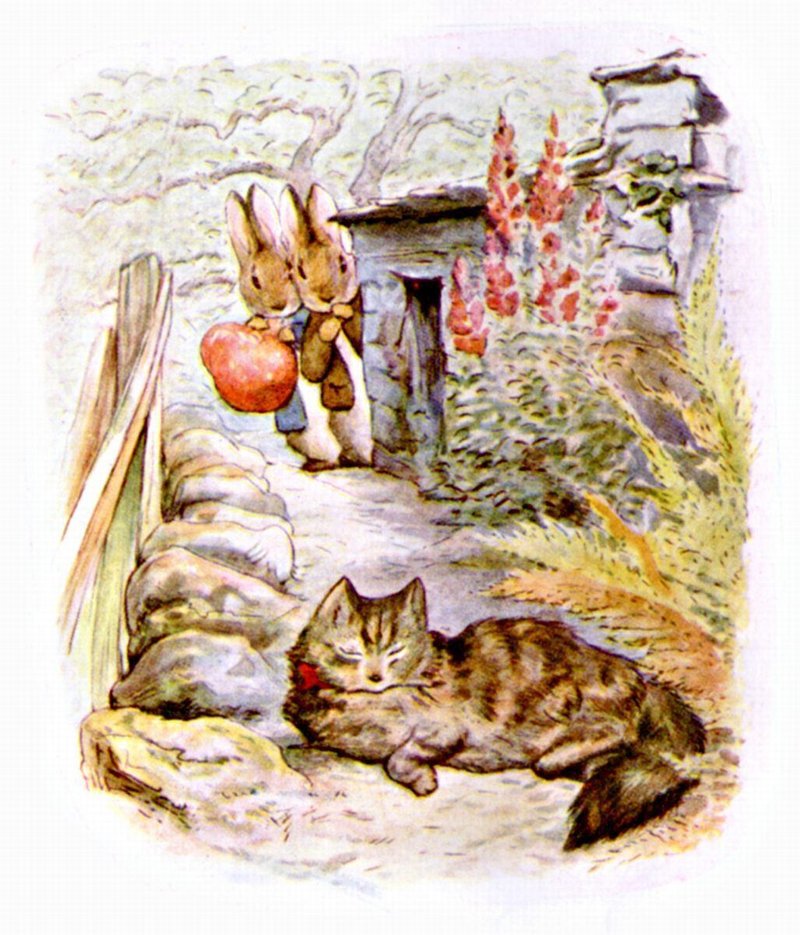
This is what those little rabbits saw round that corner!
Little Benjamin took one look, and then, in half a minute less than no time, he hid himself and Peter and the onions underneath a large basket....
かどをまわったところ こうさぎたちのめのまえに こいつがいたのです!
ベンジャミンくんは ひとめみたとたん、すかさず ピーターを タマネギごとひっぱって、じぶんもいっしょに かごのしたへとかくれて ……
【44-45ページ】

The cat got up and stretched herself, and came and sniffed at the basket.
Perhaps she liked the smell of onions!
Anyway, she sat down upon the top of the basket.
ねこのおじょうさんは おきあがるとのびをして、こっちへきて かごを くんくんとかぎました。
もしや タマネギのにおいが だいすきだとか!
それはさておき かごのうえにのっかってしまって。
【46-47ページ】

She sat there for five hours.
* * * *
I cannot draw you a picture of Peter and Benjamin underneath the basket, because it was quite dark, and because the smell of onions was fearful; it made Peter Rabbit and little Benjamin cry.
The sun got round behind the wood, and it was quite late in the afternoon; but still the cat sat upon the basket.
5じかんも ずっと そのまま。
* * * *
わたしには かごのしたのピーターとベンジャミンを みなさんにかいてあげることができません。まず まっくらですし、タマネギのにおいがひどくて あなうさピーターとベンジャミンくんは なみだまみれでしたから。
おひさまが もりのむこうにぐるっとまわって、おひるも だいぶすぎましたが、まだ ねこは かごのうえにすわっていて。
【48-49ページ】
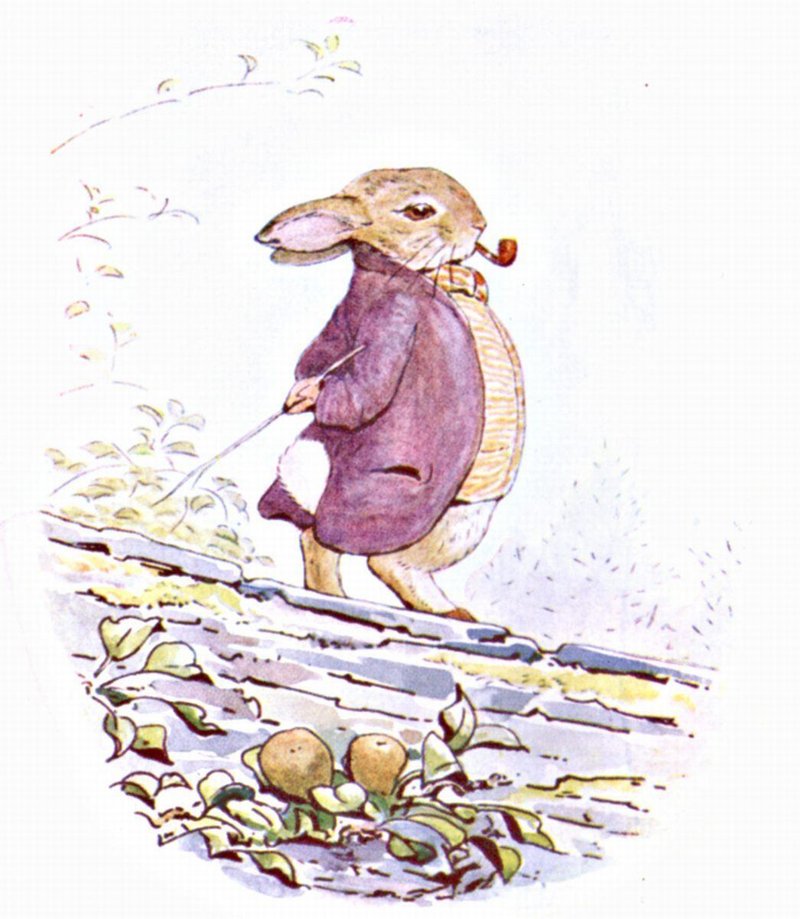
At length there was a pitter-patter, pitter-patter, and some bits of mortar fell from the wall above.
The cat looked up and saw old Mr. Benjamin Bunny prancing along the top of the wall of the upper terrace.
He was smoking a pipe of rabbit-tobacco, and had a little switch in his hand.
He was looking for his son.
はたしてそこへ、ぴたぱたぴたぱた、モルタルのかけらが へいのうえから おちてきます。
ねこがみあげると、なんと ばにばにパパさんが たかいいしがきのうえを ゆうゆうとあるいているのです。
あなうさタバコのパイプをふかして、てにはこぶりのむち。
じぶんのむすこを さがしているのでした。
【50-51ページ】
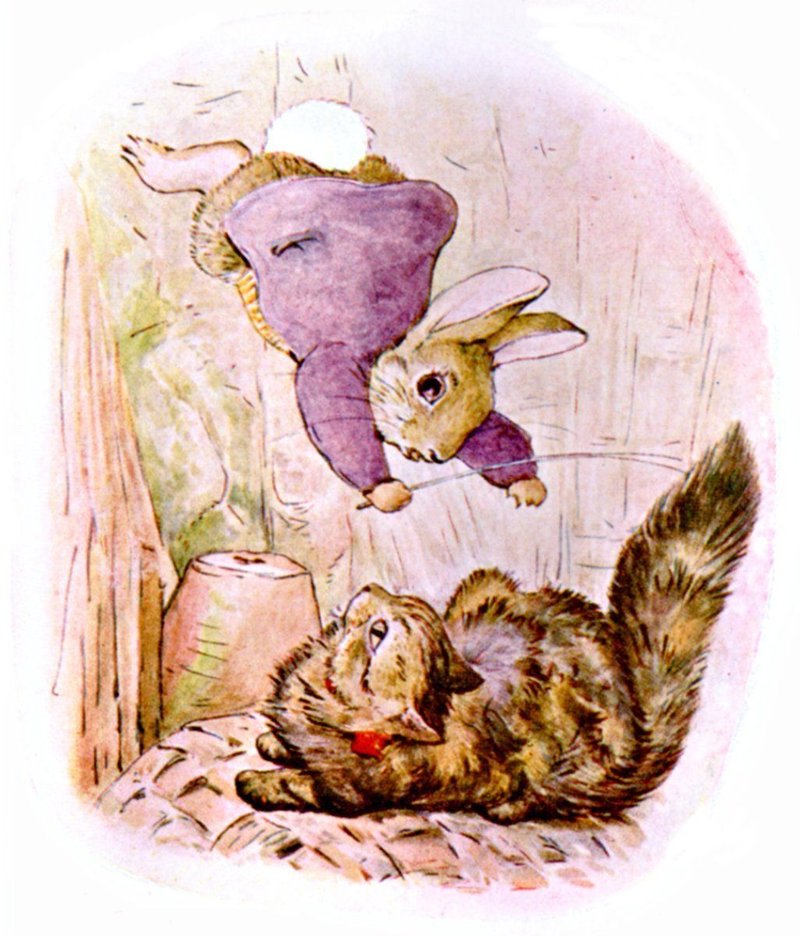
Old Mr. Bunny had no opinion whatever of cats.
He took a tremendous jump off the top of the wall on to the top of the cat, and cuffed it off the basket, and kicked it into the greenhouse, scratching off a handful of fur.
The cat was too much surprised to scratch back.
ばにばにパパさんは ねこというものをよくおもってはいません。
いしがきのうえから ねこのあたまをめがけて ちからいっぱいとびかかり、ひっぱたいてかごからどかし、さらに けをひとつかみむしって おんしつへとけりいれてしまいました。
ねこは おどろきのあまり やりかえすこともできません。
【52-53ページ】

When old Mr. Bunny had driven the cat into the greenhouse, he locked the door.
Then he came back to the basket and took out his son Benjamin by the ears, and whipped him with the little switch.
Then he took out his nephew Peter.
ばにばにパパさんは ねこを おんしつのなかへとじこめました。
それから かごのところへもどると むすこのベンジャミンのみみをつかんでひっぱりだし、こぶりのむちでぺしんぺしん。
そのあと おいのピーターもひっぱりだされて。
【54-55ページ】
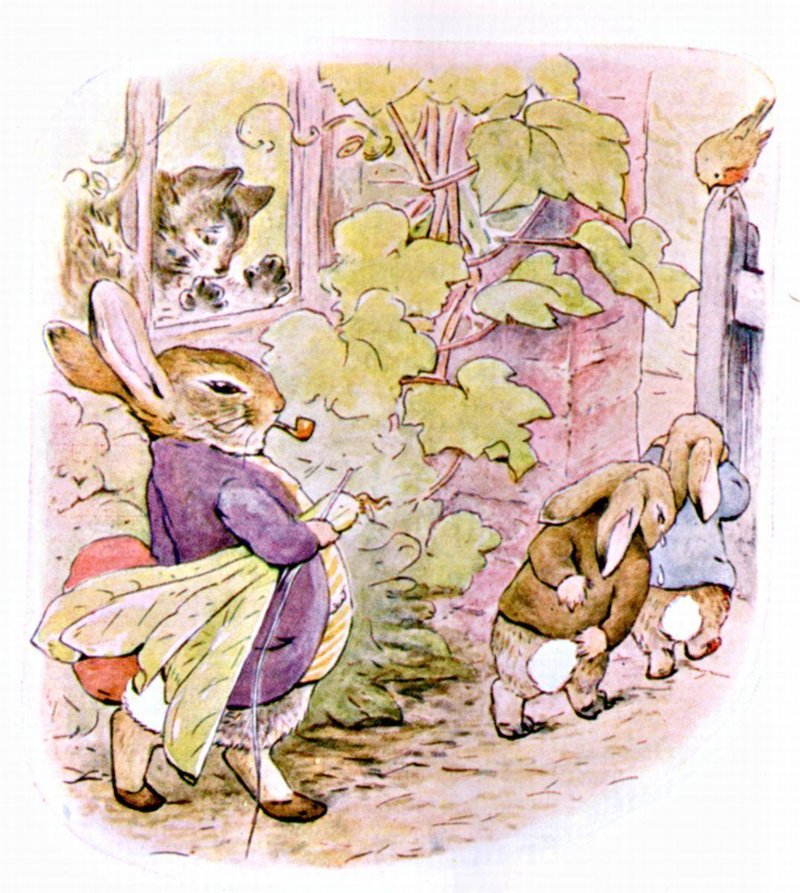
Then he took out the handkerchief of onions, and marched out of the garden.
そうして タマネギのつつみをとりあげると、にわのそとへと のしのしでていきました。
【56-57ページ】
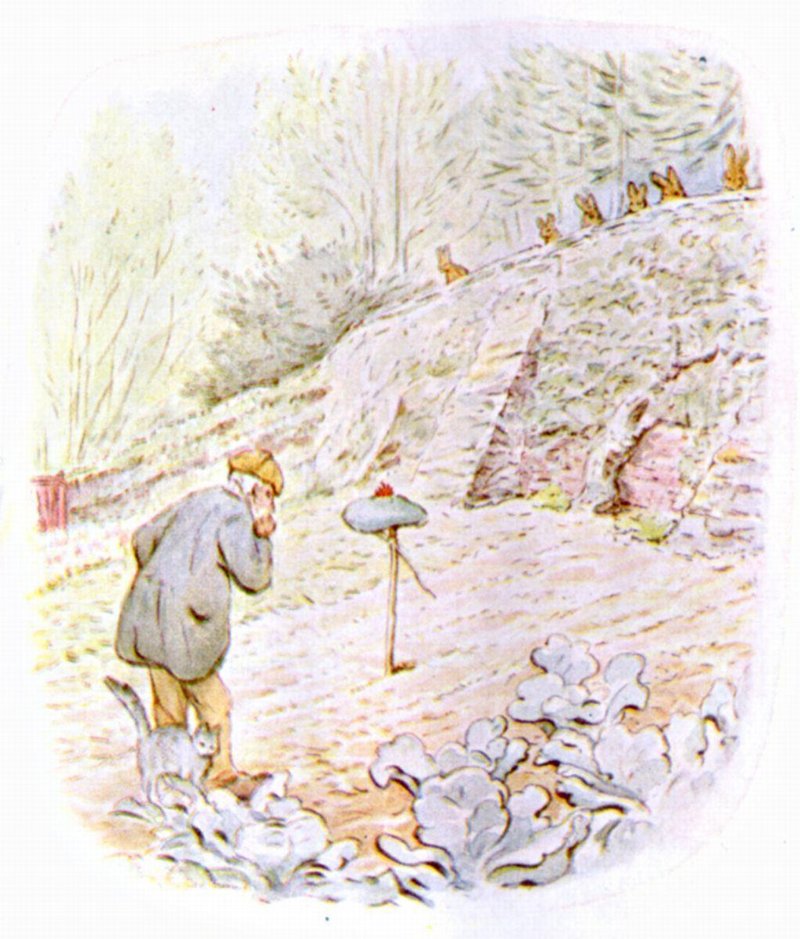
When Mr. McGregor returned about half an hour later he observed several things which perplexed him.
It looked as though some person had been walking all over the garden in a pair of clogs—only the footmarks were too ridiculously little!
Also he could not understand how the cat could have managed to shut herself up inside the greenhouse, locking the door upon the outside.
その30ぷんほどあとにもどってきたマグレガーおじさんは、あちらこちらのようすが どうもみょうなことにきづきました。
だれかが にわじゅうをきぐつであるきまわったみたいなのに ―― そのあしあとときたら おかしなほどにちいさくて!
それに なぜだか ねこが じぶんからおんしつのなかへとじこもって、 かぎもそとからかけていたのです。
【58ーEnd】
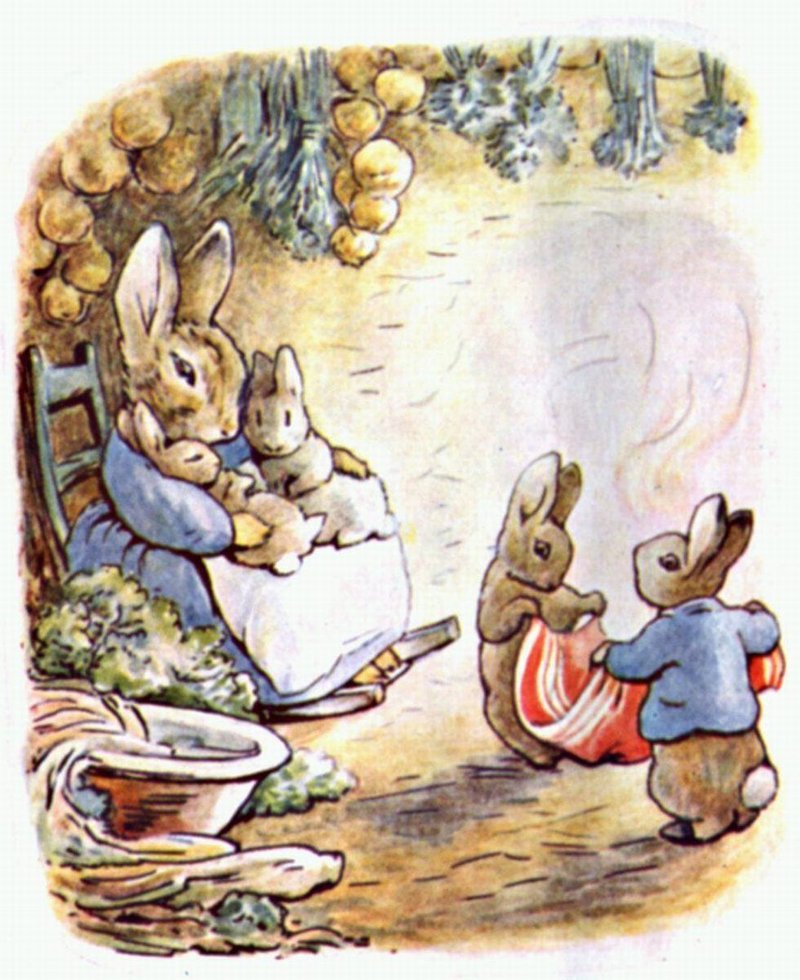
When Peter got home his mother forgave him, because she was so glad to see that he had found his shoes and coat. Cotton-tail and Peter folded up the pocket-handkerchief, and old Mrs. Rabbit strung up the onions and hung them from the kitchen ceiling, with the bunches of herbs and the rabbit-tobacco.
THE END
おうちへかえったピーターですが、おかあさんは おこりませんでした。 むすこが じぶんで くつとうわぎをみつけてきたとわかって うれしかったのです。カトンテルとピーターは ハンカチをきちんとたたみ、あなうさママは タマネギをしばって だいどころのてんじょうからつるしました。 ハーブのたばや あなうさタバコとおんなじところに。
(おしまい)
A Reader's Guide "Aguide to reading the original tale by Beatrix Potter
舞台となっているのは、美しい景観の湖水地方のDerwent湖畔にあるFawe Parkにあった邸宅の庭。Beatrixは16歳の夏以降、毎年この地を訪れて、景色のスケッチをして回った。この邸宅の庭と、その南にあったLingholm邸がMcGregorさんのお庭のモデルとなっている。
また、McGregorという名は、Beatrixがスコットランドに滞在した際に住まった家を借りた人の名前である。

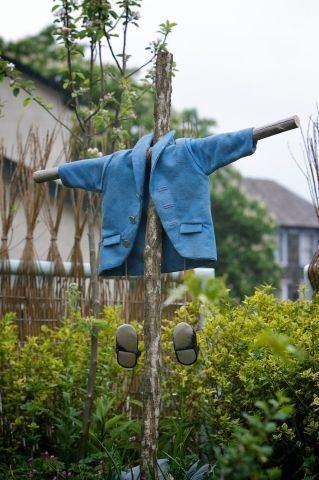
主人公のBenjamin Bunnyは、Beatrixが最初にかったウサギBenjamin Bouncerがモデルとなっている「元気が良くて勝気な性格」だったという。"The Tale of Benjamin Bunny"は雨降った翌日の庭が舞台となっている。Peter達がよじ登った梨の樹、赤いレンガ塀のわきにある散歩道、ネコが五時間も座っていたかご、レタス畑などは、すべてこの庭のスケッチの中に含まれている。
『ひげのサムエルのおはなし』(The Tale of Samuel Whiskers, 1908)
ピーターラビットシリーズの13番目の作品。副題として、当初つけられていたThe Roly Poly Puddingという題名が付けられている。子供へのクリスマスプレゼントとして書かれたといわれる。ネコがパン生地で巻かれるシーンは、いたずらをすると罰を受けるという意味で共振させる記憶に残る絵で、子どもたちを怖がらせるものだろう。
日本語訳は、大久保ゆう氏による、青空文庫に公開されているもの。すべての単語と単語の間にスペースが置かれているが、適宜、詰めて配置している。
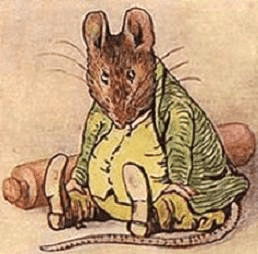

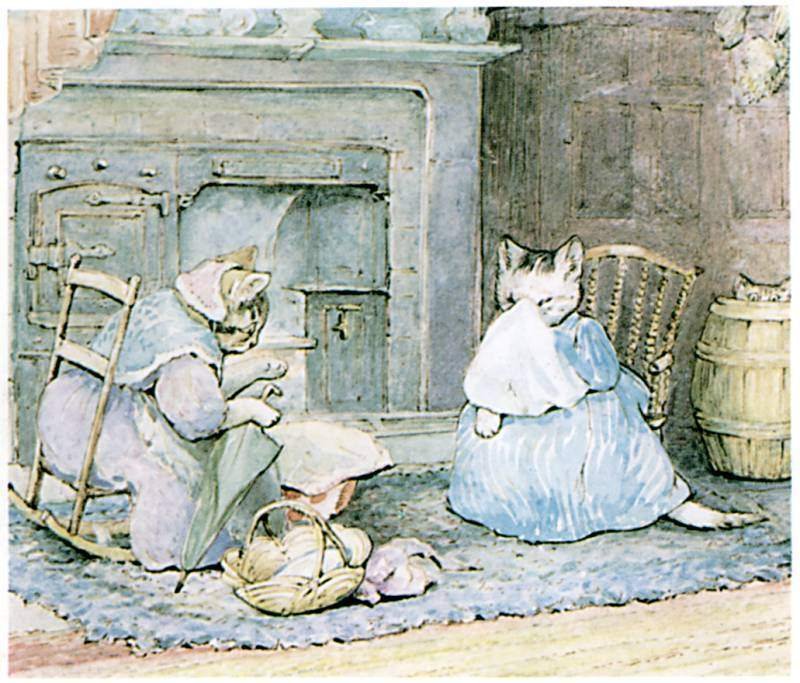

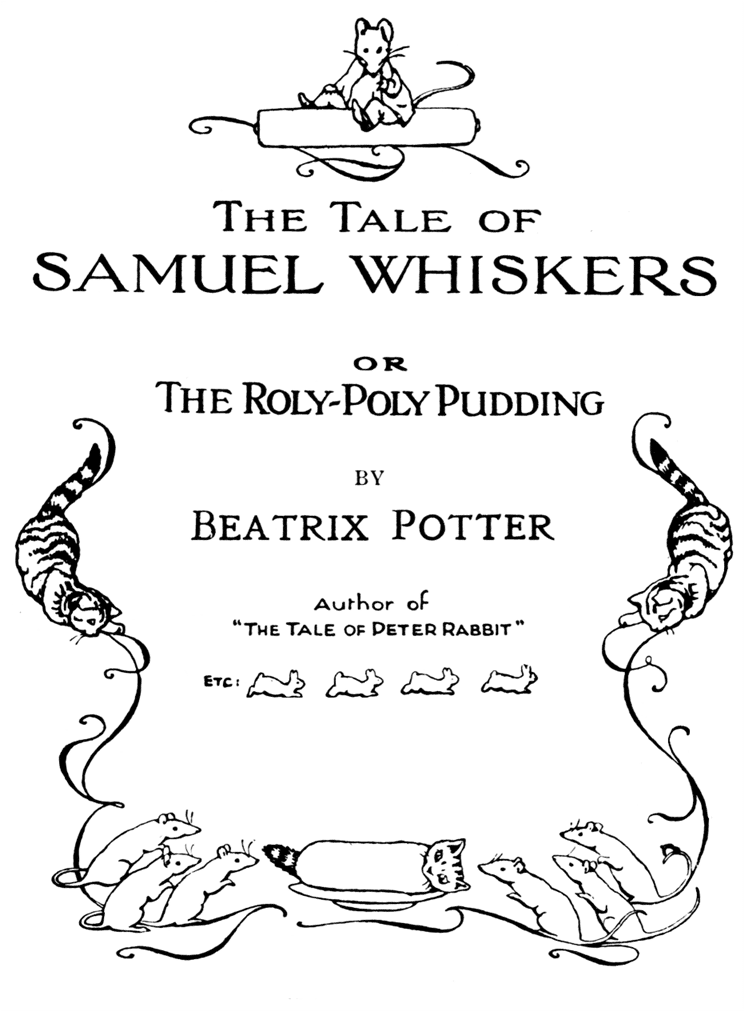
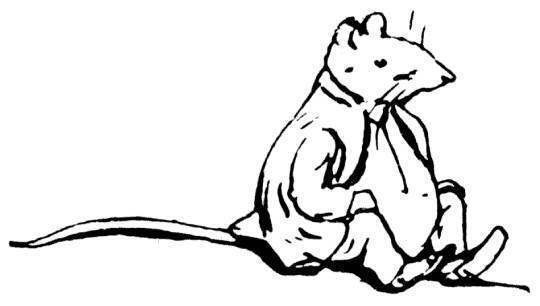
In Remembrance of
"SAMMY,"
The intelligent pink-eyed Representative
of
a Persecuted (but Irrepressible) Race
An affectionate little Friend,
and most accomplished
thief
しいたげられ(ながらも)
手におえない この生きものでも
ひときわ かしこげな 赤い目が めだつ
かわいい ちっちゃな お友だちで
たくみな ぬすっとでもある
〈サミー〉を
しのんで
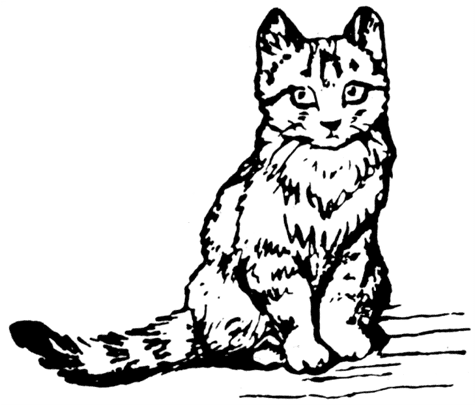
【13ページ】
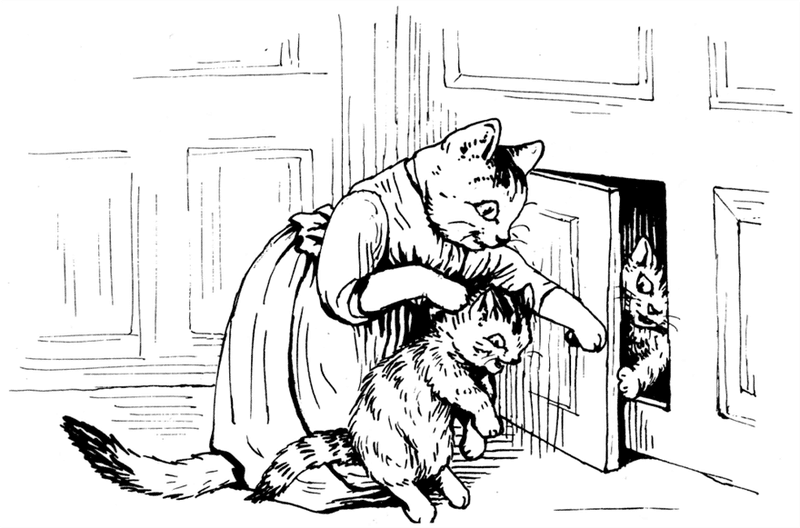
Once upon a time there was an old cat, called Mrs. Tabitha Twitchit, who was an anxious parent. She used to lose her kittens continually, and whenever they were lost they were always in mischief!
baking day she determined to shut them up in a cupboard.
She caught Moppet and Mittens, but she could not find Tom.
むかしむかしあるところに ぐいぐいタビサさんという はらはらしっぱなしの おかあさんネコがおりました。いつも子ネコたちが いなくなってしまって、そのたび かならず いたずらを おこされてしまうのです!パン作りの日には、 みんなおし入れにとじこめてしまうのがお決まりでした。
モペットとミトンズは つかまりましたが、タムがまだ見つかりません。
【14-15ページ】
Mrs. Tabitha went up and down all over the house, mewing for Tom Kitten. She looked in the pantry under the staircase, and she searched the best spare bedroom that was all covered up with dust sheets. She went right upstairs and looked into the attics, but she could not find him anywhere.
おかあさんのタビサは 家じゅうを上に下にと みゃあみゃあ タムによびかけながら回りました。かいだん下のなん戸をのぞいたり、ちょうど 空き部屋になっていたほこりまみれのねどこもさがしてみたり。まっすぐ上がって 屋根うらも見たけれど、どこにも見当たりません。
It was an old, old house, full of cupboards and passages. Some of the walls were four feet thick, and there used to be queer noises inside them, as if there might be a little secret staircase. Certainly there were odd little jagged doorways in the wainscot, and things disappeared at night—especially cheese and bacon.
Mrs. Tabitha became more and more distracted, and mewed dreadfully.
古いむかしからのおうちで、おし入れやかくし通路がいっぱいあるのです。 あつみ1メートルくらいのかべもあって、なかでは いつも ごとごとへんな物音、まるでちいさなかくしかいだんでもあるみたい。かべ板のすきまに ぎざぎざ おかしな入り口があって、夜な夜なものがそこへ消えていくのです ―― とくにチーズとかベーコンとか。
おかあさんのタビサは だんだんそわそわしてきて とにかくみゃあみゃあ 声を上げました。
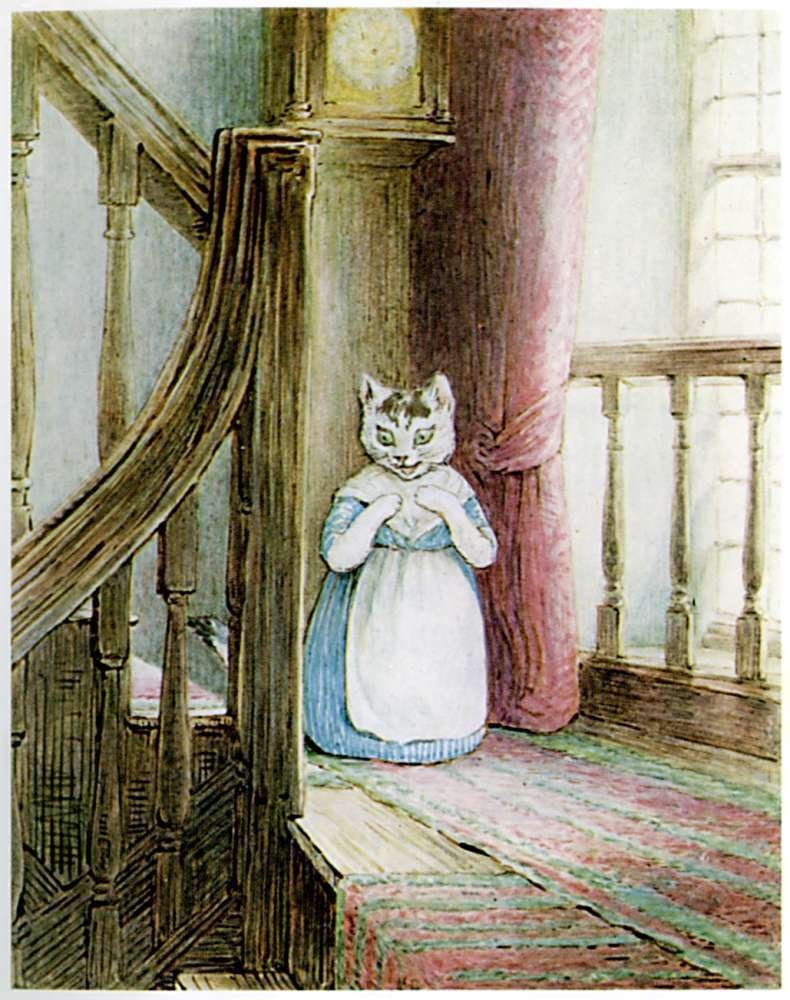
【16ページ】
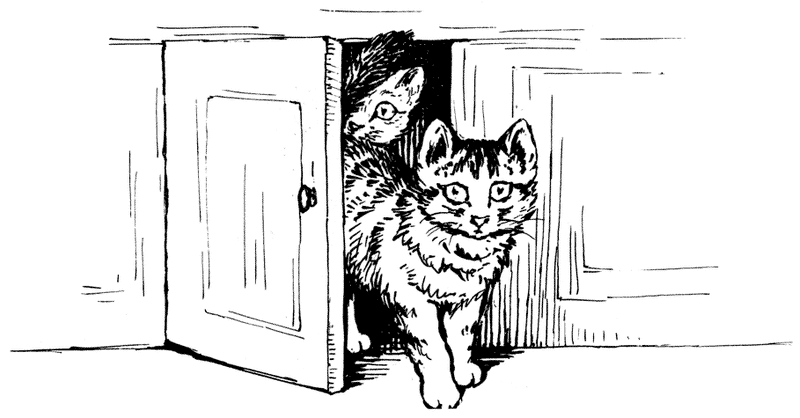
While their mother was searching the house, Moppet and Mittens had got into mischief.
The cupboard door was not locked, so they pushed it open and came out.
こうして 母ネコが家じゅうさがし回っているうちに、モペットとミトンズが いたずらに乗り出します。
おし入れの戸にはカギがないので おしあけて出て行きました。
【17ページ】

They went straight to the dough which was set to rise in a pan before the fire.
They patted it with their little soft paws—"Shall we make dear little muffins?" said Mittens to Moppet.
ふたりが まっすぐ向かうのは かまど前のうつわで、ふくらみ待ちのパンだねのところ。
ふたりは ちいさな肉球でぽんぽん――「あたしたちでかわいいマフィンでも作ろっか。」と ミトンズがモペットをさそいます。

【18ページ】
But just at that moment somebody knocked at the front door, and Moppet jumped into the flour barrel in a fright.
ところが ちょうどそのとき 戸口をたたく音がして、びくっとしたモペットは 小麦粉のたるへ飛び込んでしまいました。
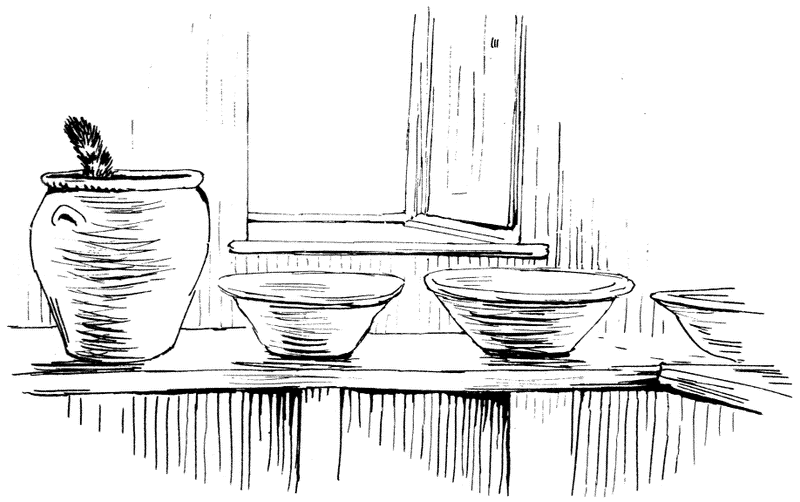
【19ページ】
Mittens ran away to the dairy, and hid in an empty jar on the stone shelf where the milk pans stand.
ミトンズも 牛乳おきばにかけこんで、ミルク入れがならんでいる 石だなにあった 空のつぼのなかにかくれます。
【21-22ページ】
The visitor was a neighbour, Mrs. Ribby; she had called to borrow some yeast.
Mrs. Tabitha came downstairs mewing dreadfully—"Come in, Cousin Ribby, come in, and sit ye down! I'm in sad trouble, Cousin Ribby," said Tabitha, shedding tears. "I've lost my dear son Thomas; I'm afraid the rats have got him." She wiped her eyes with her apron.
."He's a bad kitten, Cousin Tabitha; he made a cat's cradle of my best bonnet last time I came to tea. Where have you looked for him?"
"All over the house! The rats are too many for me. What a thing it is to have an unruly family!" said Mrs. Tabitha Twitchit.
お客さんは おとなりさんでしんせきのリービさんで、イーストをかりに 立ちよったのでした。
そのいとこのタビサは そわそわみゃあみゃあと かいだんを下りてきて ――「お入りください。 あらリービじゃない! おかけなさいな。ちょっと今よわったことになっててね、リービ。」と なみだをこぼすタビサ。「むすこのねこぬこタムが見当たらないの。 ネズミにつかまったのかもしれなくて。」と エプロンで目もとをぬぐいます。
「あいかわらずのわるガキなのね。前 お茶に来たとき あの子 お気に入りのよそいきのぼうしを ネコのゆりかごにしたのよ。とりあえず どこを さがしたの?」
「うちじゅうよ!イエネズミがやたらめったら。わたしにはむり。 もう、 聞き分けない子どもたちなんだから。」とぼやくぐいぐいタビサさん。
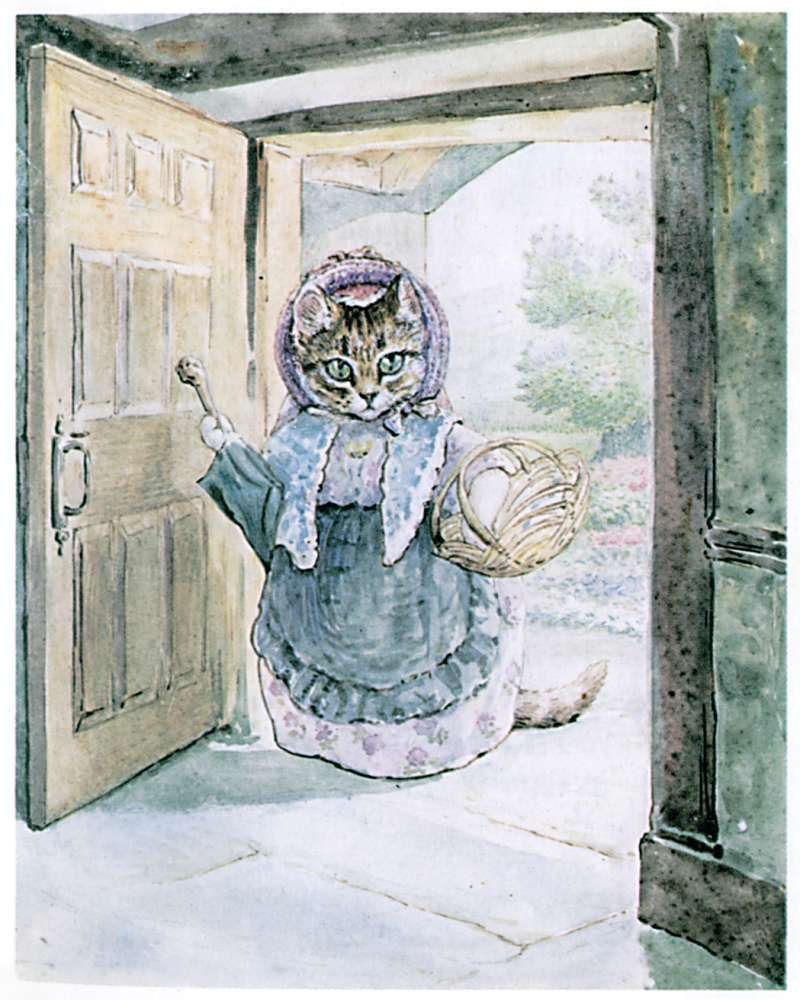
【22ページ】
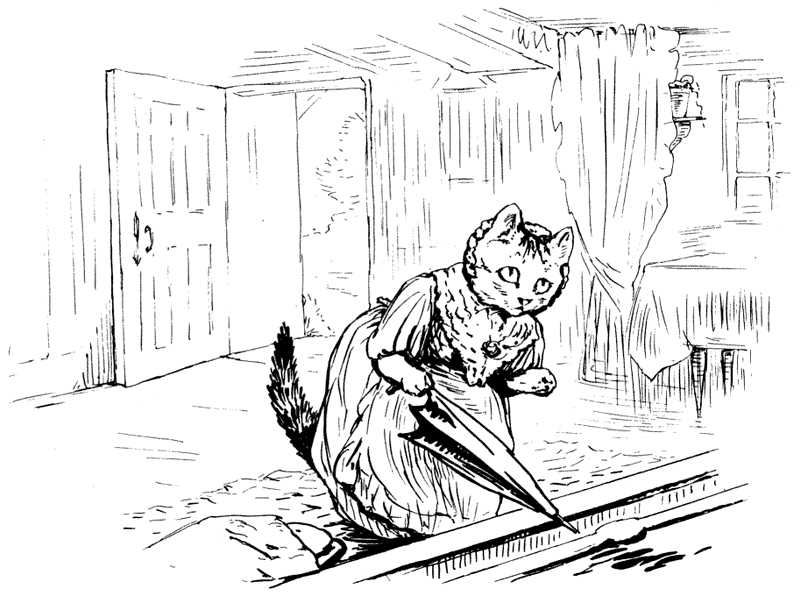
"I'm not afraid of rats; I will help you to find him; and whip him too! What is all that soot in the fender?"
「わたしならネズミも平気、あの子をさがしてあげる、ひっぱたいてやるんだから!まあ このかまどのかこいこんなにススだらけ。」
【23ページ】
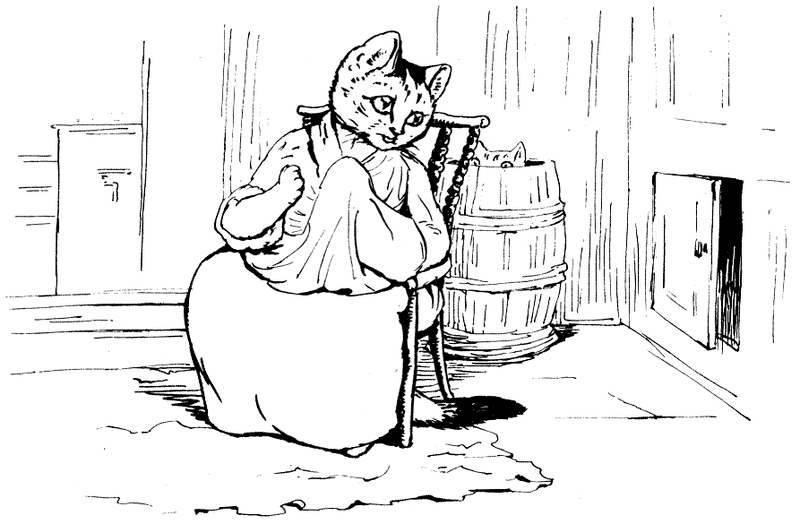
"The chimney wants sweeping—Oh, dear me, Cousin Ribby—now Moppet and Mittens are gone!"
"They have both got out of the cupboard!"
「えんとつ そうじしなくちゃね ―― ああ、ねえリービ――モペットと ミトンズもいなくなってるわ!」
「ふたりとも、おし入れから出たのね!」
【24-25ページ】
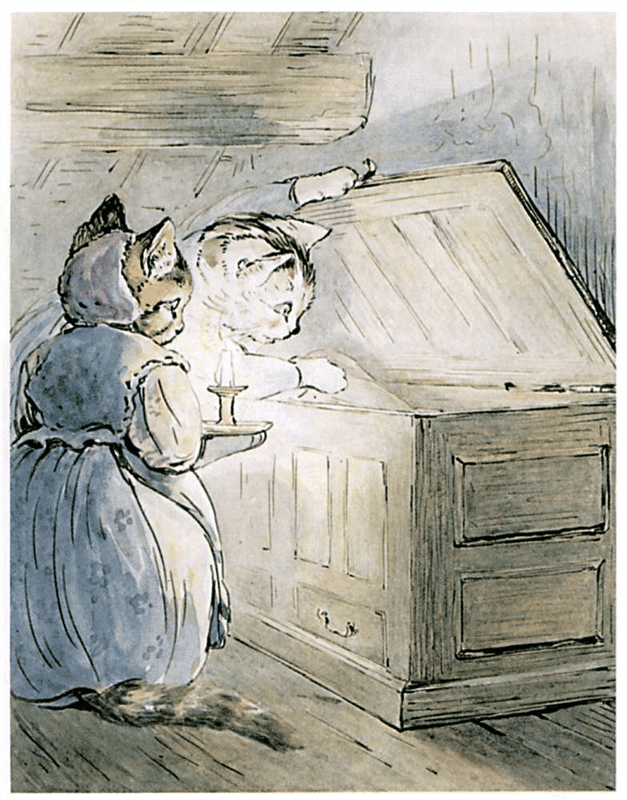
Ribby and Tabitha set to work to search the house thoroughly again. They poked under the beds with Ribby's umbrella, and they rummaged in cupboards. They even fetched a candle, and looked inside a clothes chest in one of the attics. They could not find anything, but once they heard a door bang and somebody scuttered downstairs.
"Yes, it is infested with rats," said Tabitha tearfully. "I caught seven young ones out of one hole in the back kitchen, and we had them for dinner last Saturday. And once I saw the old father rat—an enormous old rat, Cousin Ribby. I was just going to jump upon him, when he showed his yellow teeth at me and whisked down the hole."
"The rats get upon my nerves, Cousin Ribby," said Tabitha.
いとこ同士のリービとタビサは ふたたび おうちをしらみつぶしにさがしはじめて。リービのかさで ベッドの下をつついたり、おし入れを くまなく ぐったり。はてにはロウソクを手に 屋根うらにまで入っていしょう箱のなかまでのぞいたり。何にも見つからないのに 戸のばたんという 物音 それから だれかの かいだんをかけ下りる音がひとたび聞こえてくるのです。
「ほら、イエネズミだらけ。」とおろおろするタビサ。「台所の穴から7ひき ちっちゃいのをつかまえて、この間の土曜にごちそうにしたの。あと1度 見たのよ、 おじさんネズミを ―― ぶくぶくした おじさんネズミなの、 リービ。 わたし、飛びかかろうとしたら 向こうは黄ばんだ歯を こっちにひんむいて 穴にさっとにげこむんだから。」
「ネズミって ほんとうにかんにさわるわ、ねえリービ。」とタビサ。
【26ページ】
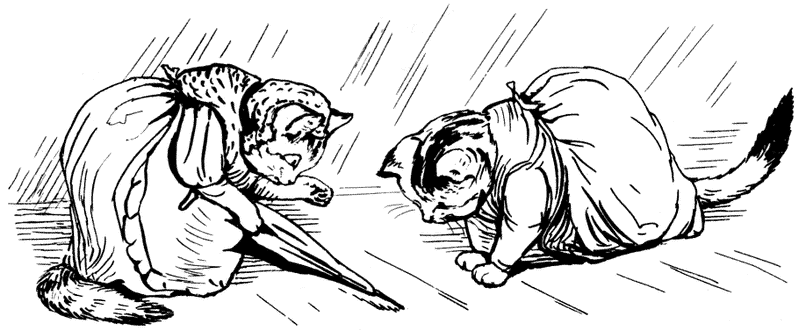
Ribby and Tabitha searched and searched. They both heard a curious roly-poly noise under the attic floor. But there was nothing to be seen.
リービとタビサは さがしにさがしました。ふたりには、屋根うらのゆか下から 何かが ろごろする音が聞こえるのですが、やっぱり 何にも見当たりません。
【27ページ】
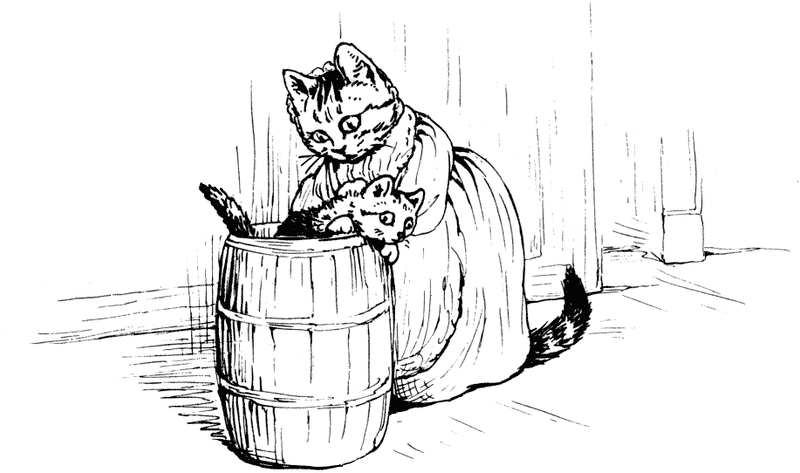
They returned to the kitchen. "Here's one of your kittens at least," said Ribby, dragging Moppet out of the flour barrel.
【28-29ページ】
They shook the flour off her and set her down on the kitchen floor. She seemed to be in a terrible fright.
"Oh! Mother, Mother," said Moppet, "there's been an old woman rat in the kitchen, and she's stolen some of the dough!"
The two cats ran to look at the dough pan. Sure enough there were marks of little scratching fingers, and a lump of dough was gone!
"Which way did she go, Moppet?"
But Moppet had been too much frightened to peep out of the barrel again.
Ribby and Tabitha took her with them to keep her safely in sight, while they went on with their search.
台所にもどるふたり。「ほおら、ここにまずはひとり。」と リービは小麦粉のたるから モペットを引きずり出します。
ふたりして 子ネコから小麦粉をはたき落とすと、台所のゆかへと下ろしました。子ネコはどうもおびえているようす。
「ねえ!おかあさん。」と モペット。「台所におばさんネズミがいてね、 パンだねをすこしぬすんでった!」
大人ふたりは あわててパンだねのうつわを見に行きました。たしかに ちいさくひっかいたあとがはっきり、ひとかたまりパンだねを持っていかれたのです!
「どっちへ行ったの、モペット?」
でも モペットはこわくてこわくて たるから1ども顔を上げられていなくて。
もう 見うしなってはいけないので リービとタビサはその子を連れたまま まいごさがしをつづけることにしました。
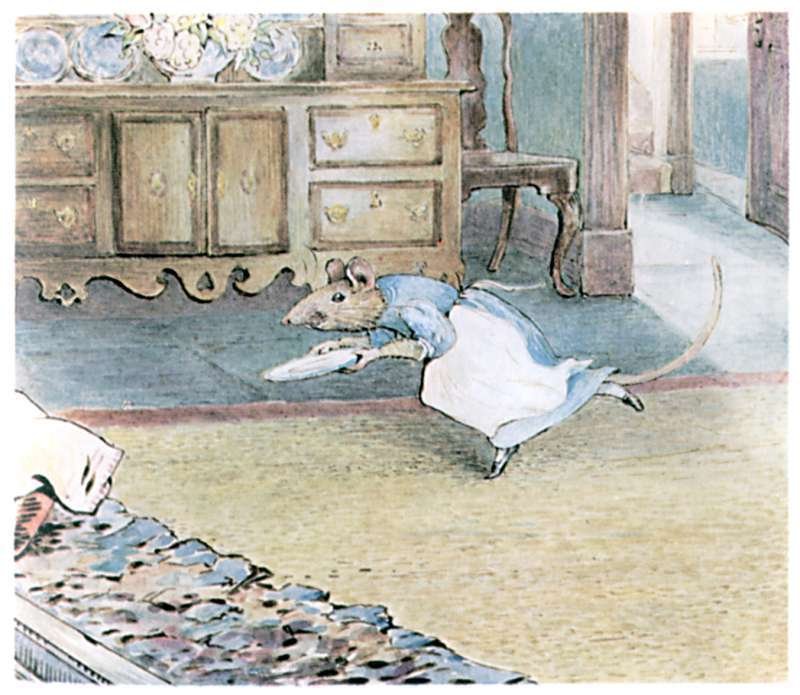
【30ページ】
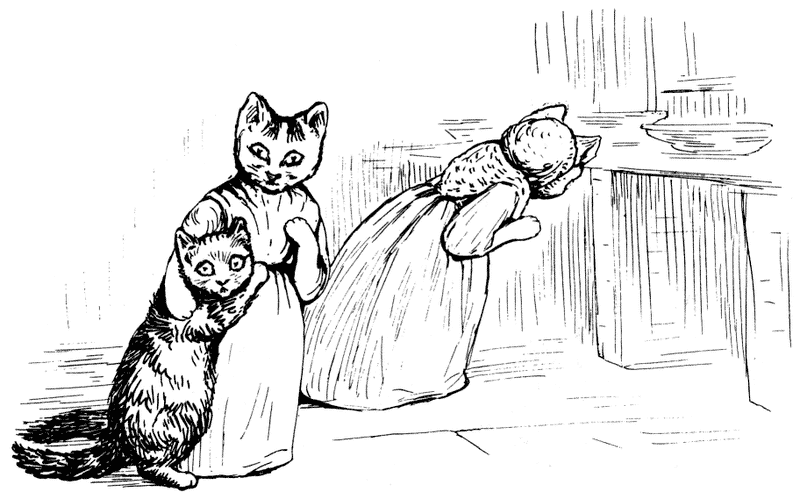
They went into the dairy.
The first thing they found was Mittens, hiding in an empty jar.
みんなで 牛乳おきばへと向かいます。
さっそく見つかったのがミトンズで、空のつぼにかくれていました。
【31ページ】

They tipped up the jar, and she scrambled out.
"Oh, Mother, Mother!" said Mittens—
つぼをかたむけると その子が転がり出てきます。
「ねえ、おかあさん!」と言い出すミトンズ――
【32-33ページ】
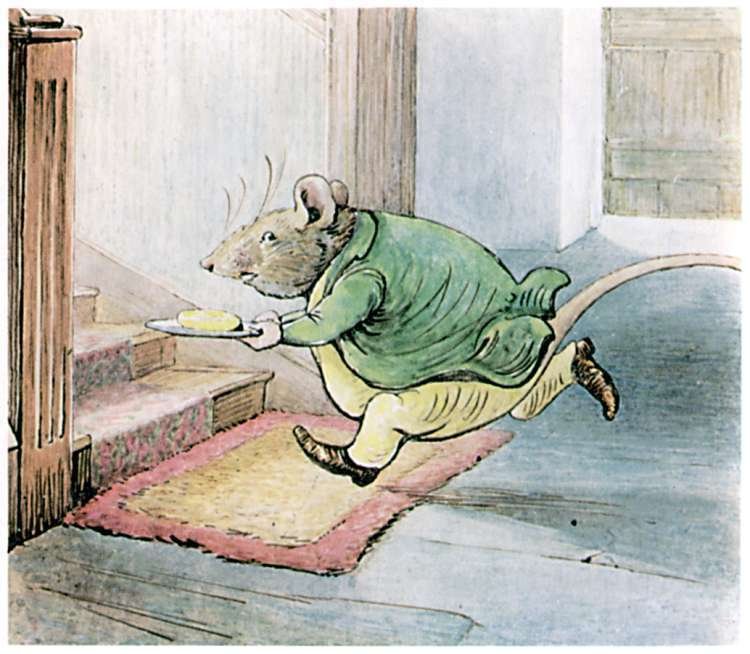
"Oh! Mother, Mother, there has been an old man rat in the dairy—a dreadful 'normous big rat, mother; and he's stolen a pat of butter and the rolling-pin."
Ribby and Tabitha looked at one another.
"A rolling-pin and butter! Oh, my poor son Thomas!" exclaimed Tabitha, wringing her paws.
"A rolling-pin?" said Ribby. "Did we not hear a roly-poly noise in the attic when we were looking into that chest?"
Ribby and Tabitha rushed upstairs again. Sure enough the roly-poly noise was still going on quite distinctly under the attic floor.
「ねえ、おかあさん、牛乳おきばにおじさんネズミが来たよ――こわいくらいにでっかいネズミでね、おかあさん、それで バターをちょびっとのしぼう(のし棒)をかっぱらってった。」
リービと タビサは たがいに 目を 合わせます。
「のしぼうとバター! ああ かわいそうなタム!」とさけびながら 手を こまねくタビサ。
「のしぼう?」とリービ。「屋根うらでごろごろまきまきしてる音聞こえなかった? あの箱さがしてるときよ!」
リービとタビサは もう1どかいだんをかけ上がります。なるほど たしかに 屋根うらのゆか下から ごろごろまきまきしている物音がはっきりと。
【34ページ】
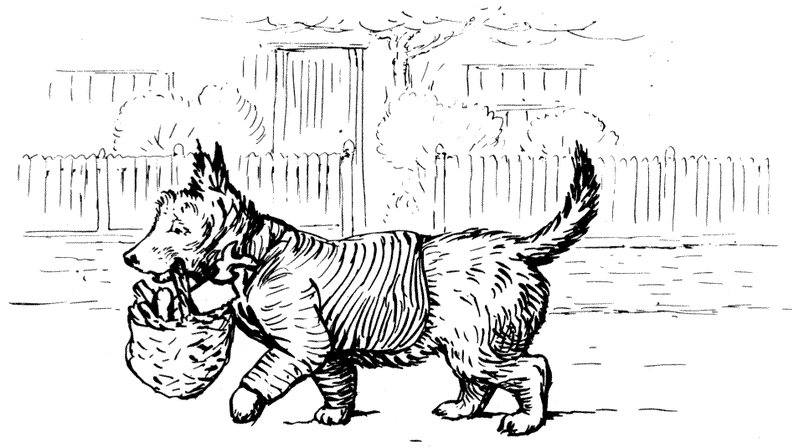
"This is serious, Cousin Tabitha," said Ribby. "We must send for John Joiner at once, with a saw."
「たいへんよ、タビサ。」とリービ。「のこぎりがいるから、すぐに たてぐやジョンをよんでこないと。」
* * * * * *
【35ページ】
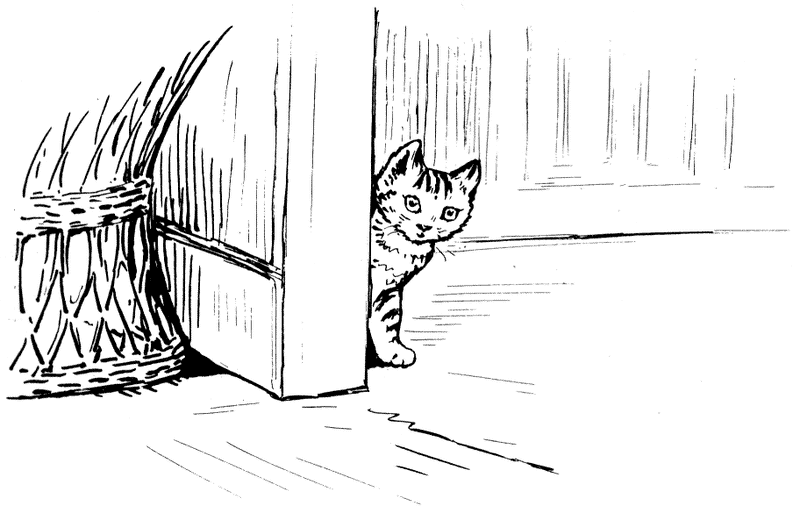
Now this is what had been happening to Tom Kitten, and it shows how very unwise it is to go up a chimney in a very old house, where a person does not know his way, and where there are enormous rats.
さて ここからは ねこぬこタムにおきたできごと。いいですか、古いおうちのえんとつに上るのは たいへんばかげたことなのです、すぐにまいごに なるしでっかいネズミがいるのですから。
【36-37ページ】
Tom Kitten did not want to be shut up in a cupboard. When he saw that his mother was going to bake, he determined to hide.
He looked about for a nice convenient place, and he fixed upon the chimney.
The fire had only just been lighted, and it was not hot; but there was a white choky smoke from the green sticks. Tom Kitten got upon the fender and looked up. It was a big old-fashioned fire-place.
The chimney itself was wide enough inside for a man to stand up and walk about. So there was plenty of room for a little Tom Cat.
ねこぬこタムは おし入れにとじこめられるのなんてごめんでした。母ネコが パンやきのしたくに入るのを見て、すがたをくらまそうと心に決めて。
つごうのいいところをと見回していると、かまどのえんとつが目に入ります。
火はついたばかりで まだあつくはないのですが、まきからむせる白いけむりが出ていました。ねこぬこタムは かこいにのぼって 上をのぞいてみます。大きな旧式のかまどでした。
えんとつそのものは ひとひとり立ってすすめるくらいの広さがあります。 だから 子ネコの タムちゃんならゆうゆうだいじょうぶ。
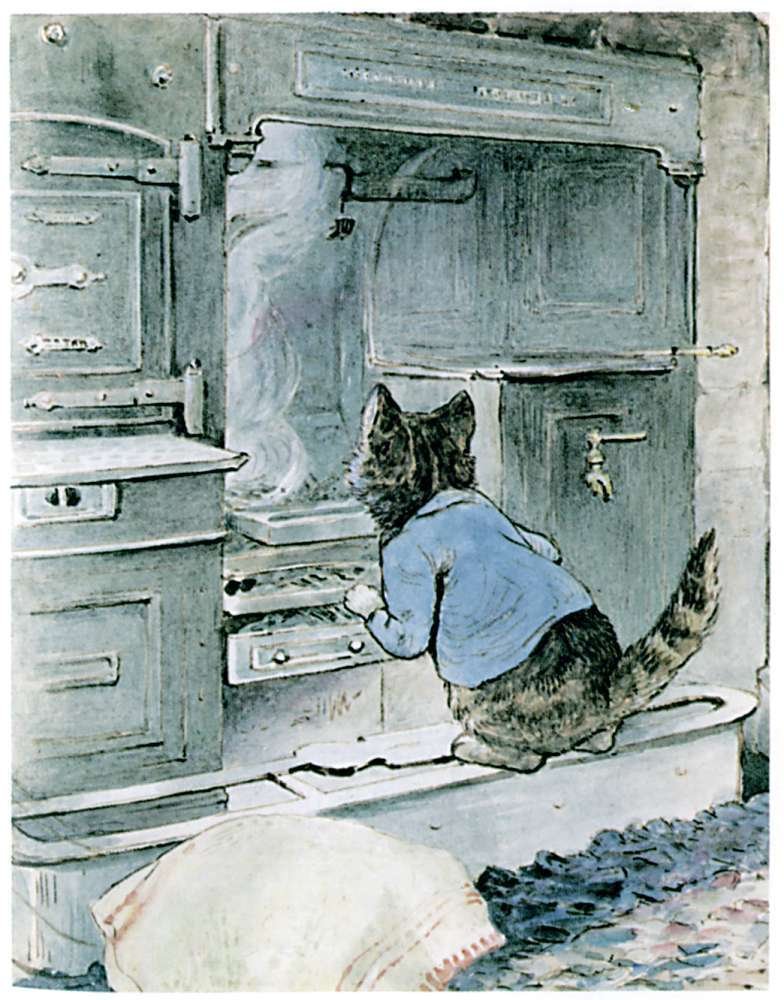
【38ページ】
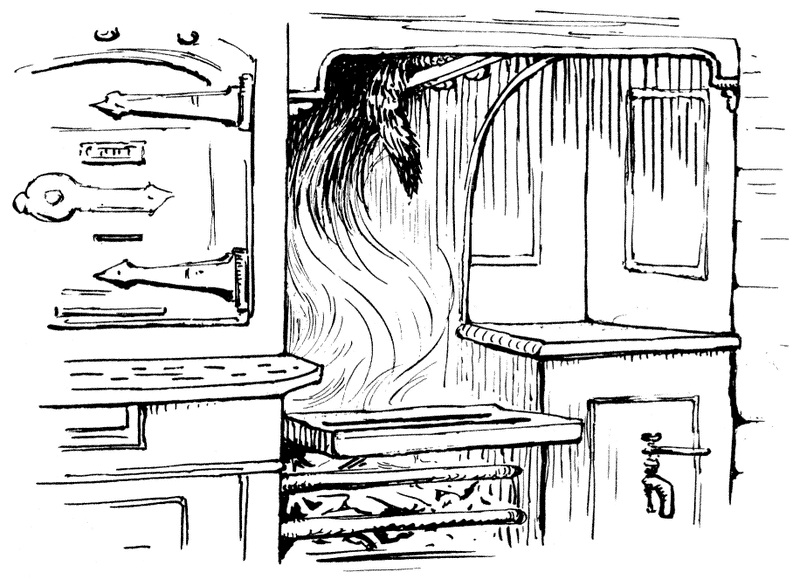
He jumped right up into the fire-place, balancing himself upon the iron bar where the kettle hangs.
まっすぐかまどへと飛び上がって、やかんかけの鉄のぼうのところに手足をかけて。
【39ページ】
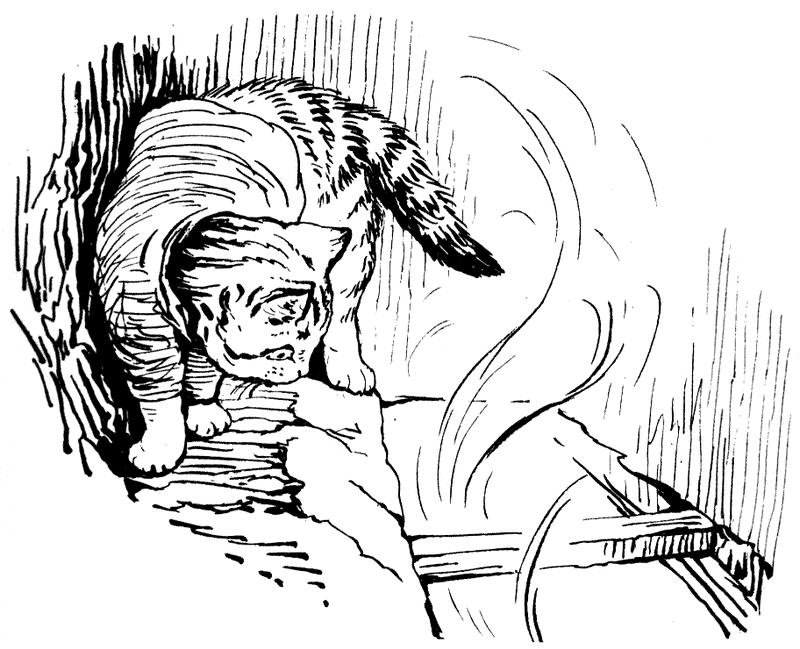
Tom Kitten took another big jump off the bar, and landed on a ledge high up inside the chimney, knocking down some soot into the fender.
ねこぬこタムは そのぼうから また 大きくぴょん、えんとつ内の 高いところにあるでっぱりへ ちゃくち、かこいにスス ちょっくら はたきおとします。
【40-41ページ】
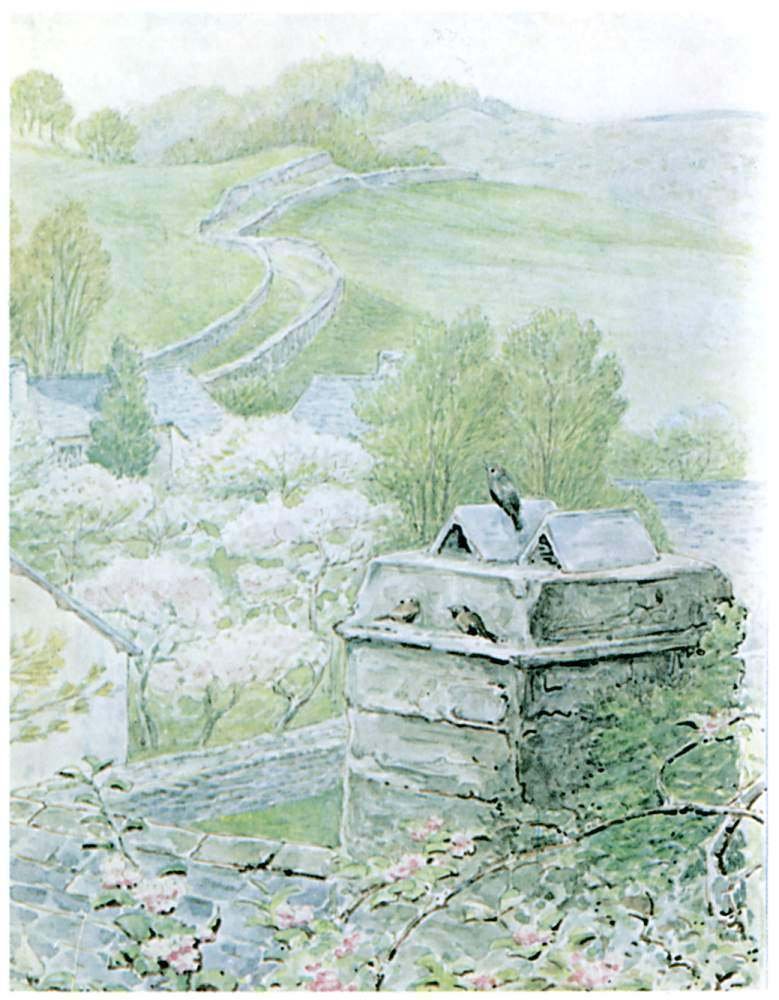
Tom Kitten coughed and choked with the smoke; and he could hear the sticks beginning to crackle and burn in the fire-place down below. He made up his mind to climb right to the top, and get out on the slates, and try to catch sparrows.
"I cannot go back. If I slipped I might fall in the fire and singe my beautiful tail and my little blue jacket."
The chimney was a very big old-fashioned one. It was built in the days when people burnt logs of wood upon the hearth.The chimney stack stood up above the roof like a little stone tower, and the daylight shone down from the top, under the slanting slates that kept out the rain.
けむりにけほけほせきこむ ねこぬこタム。なんと 下のかまどのまきが ぱちぱち、もえだしたのが聞こえてきます。かくごを決めて まっすぐ てっぺんまで上っておおいの外へ出て スズメをつかまえようと考えました。
「ひきかえすのはむり。すべったらかまどにおっこちて、ぼくのきれいな しっぽとこの青いうわぎがこげちゃうよ。」
えんとつはとても大きくて、むかしながらのものでした。だんろに太いまきをくべていた時代に作られたしろものです。
えんとつのくだは 屋根の上に石のタワーよろしくつきでていて、日ざしが 上から下へときらきらてりかえし、雨をふせぐ 山がたのおおいのなかに さしこんでいて。
【42ページ】
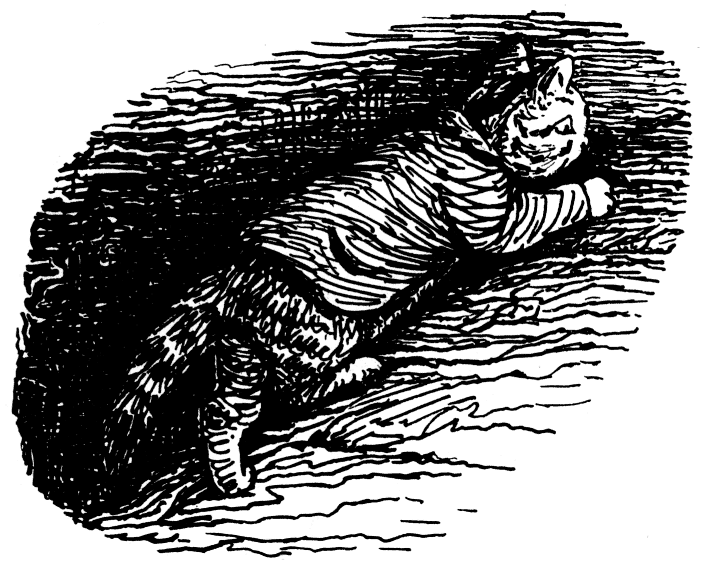
Tom Kitten was getting very frightened! He climbed up, and up, and up.
おっかな びっくりの ねこぬこタム! のぼって、 どんどん どんどん 上へ。
【43ページ】
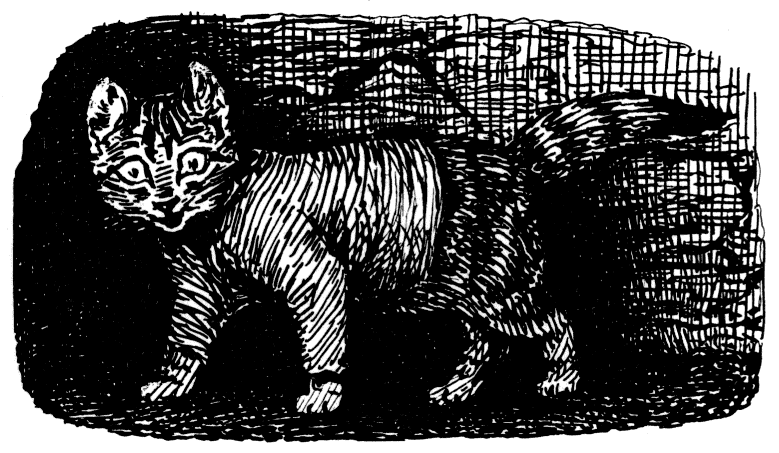
Then he waded sideways through inches of soot. He was like a little sweep himself.
さらに ススまみれになりながら なんとか横道をすすみます。まるで 自分がちいさなほうきにでもなったみたい。
【44-45ページ】
It was most confusing in the dark. One flue seemed to lead into another.
There was less smoke, but Tom Kitten felt quite lost.
He scrambled up and up; but before he reached the chimney top he came to a place where somebody had loosened a stone in the wall. There were some mutton bones lying about—
"This seems funny," said Tom Kitten. "Who has been gnawing bones up here in the chimney? I wish I had never come! And what a funny smell? It is something like mouse; only dreadfully strong. It makes me sneeze," said Tom Kitten.
まっくらで 何がなんだかわかりません。くだからくだへと 次々とつながっているらしく。
けむりは少なくなりましたが 自分がどこにいるのか わからなくなるねこぬこタム。
上へ上へとよじのぼったものの、えんとつのてっぺんにたどりつくでもなく 岩かべのいきどまり。 ところが 何ものかに少しずらされていて、その前にはひつじの肉のほねがちらばっていて ――
「おかしいな。」と ねこぬこタム。「だれが こんなえんとつのなかで 骨をしゃぶるんだろ? 来るんじゃなかった! ん、すごく おかしなにおいが!ネズミみたいな――ひどくきついっ。くしゃみ出そう。」と ねこぬこタム。
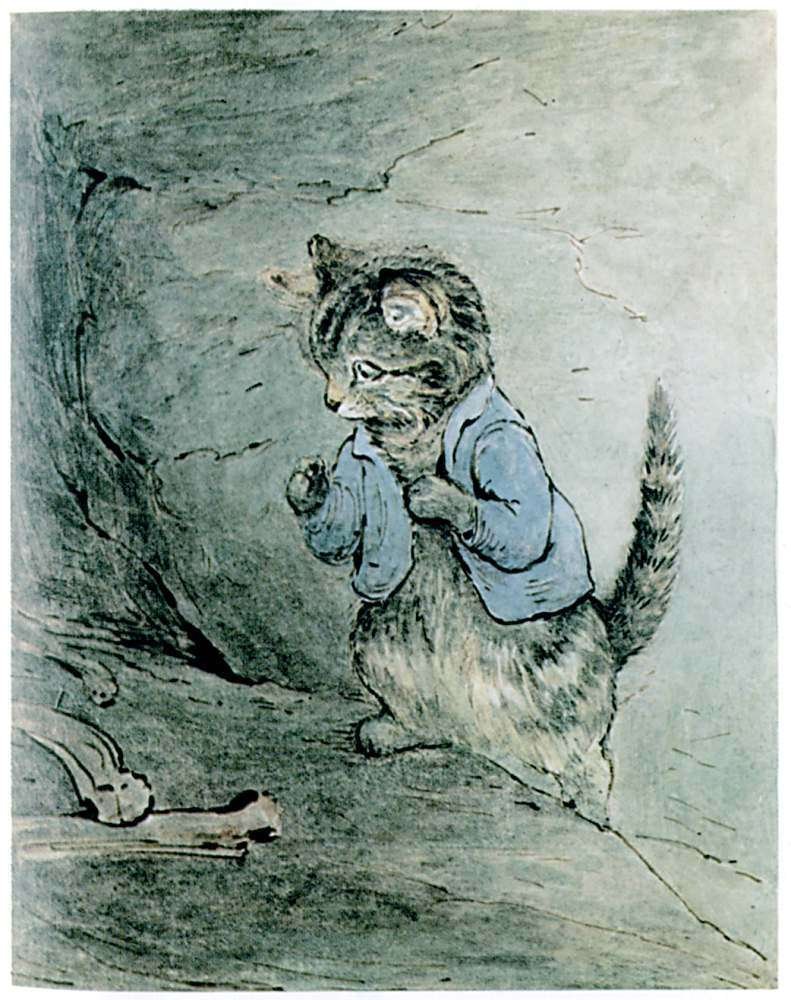
【46ページ】

He squeezed through the hole in the wall, and dragged himself along a most uncomfortably tight passage where there was scarcely any light.
石かべのすきまにからだをむりくりおしこんで、きゅうくつでせまいのに ろくに明かりもないようなすじをもぞもぞすすんでいきます。
【47ページ】

He groped his way carefully for several yards; he was at the back of the skirting-board in the attic, where there is a little mark * in the picture.
数メ.ートルほど気をつけてさぐりさぐり先を行くのですが、このときいたのはじつは屋根うら部屋のすそ板のうらがわあたり。(絵の*じるしのところ。)
【48-49ページ】
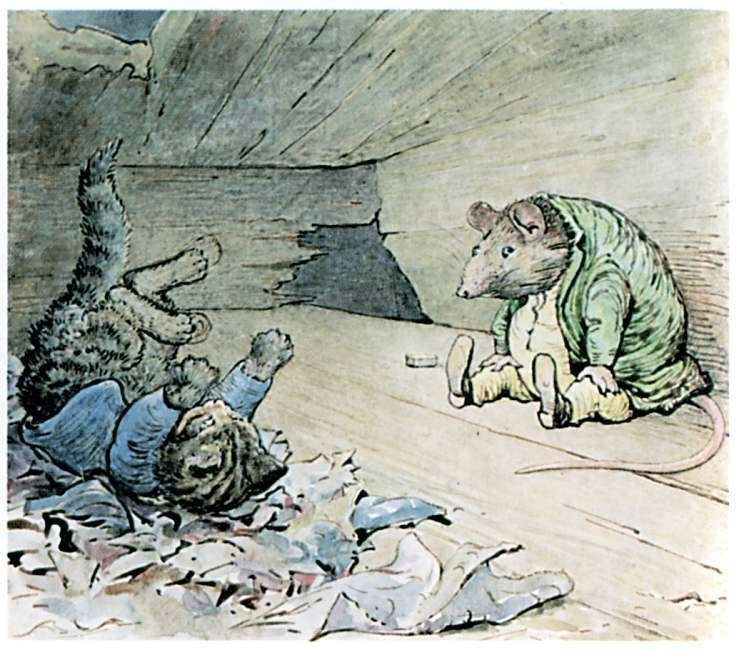
All at once he fell head over heels in the dark, down a hole, and landed on a heap of very dirty rags.
He groped his way carefully for several yards; he was at the back of the skirting-board in the attic, where there is a little mark* in the picture.
When Tom Kitten picked himself up and looked about him—he found himself in a place that he had never seen before, although he had lived all his life in the house.It was a very small stuffy fusty room, with boards, and rafters, and cobwebs, and lath and plaster.Opposite to him—as far away as he could sit—was an enormous rat.
"What do you mean by tumbling into my bed all covered with smuts?" said the rat, chattering his teeth.
すると まっくらがりでいきなり っさかさまに穴へおっこちて、ばっちい ぬのきれの山へどすん。
おき上がったねこぬこタムがあたりを見回すと――気づけばいたのは見たこともないところ、ずっと このおうちでくらしてきたというのに。そこは せまくるしくかびくさく いきづまる部屋で、板やたる木がむきだし クモのすしっくいなんかがあちこちに。そして まっ正面に――むこうのすみに――いたのが大きなイエネズミ。
「どういうつもりだ、おれのねどこに ススまみれでおっこちてきやがって。」と 歯をかちかちいわせるイエネズミ。
【50ページ】
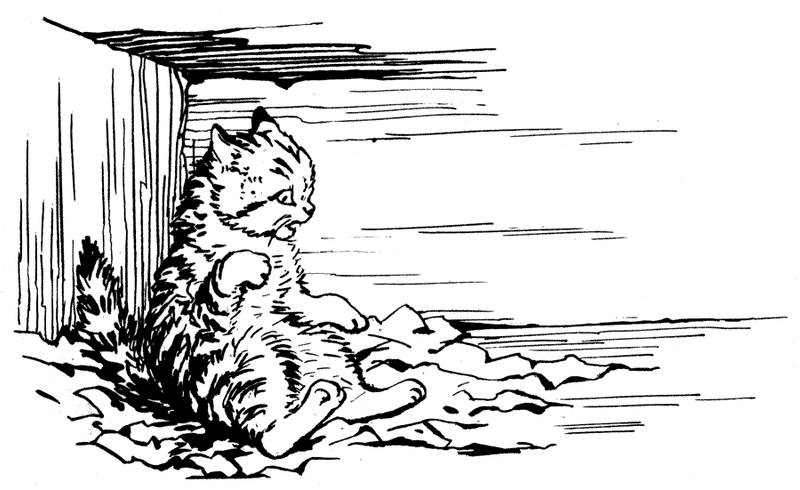
"Please sir, the chimney wants sweeping," said poor Tom Kitten.
「その、えんとつのお手入れがされてなくて。」と言いわけするかわいそうなねこぬこタム。
【51ページ】
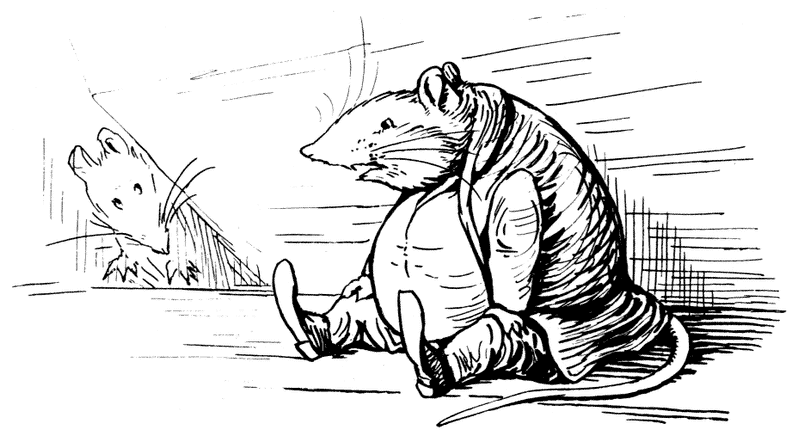
"Anna Maria! Anna Maria!" squeaked the rat. There was a pattering noise and an old woman rat poked her head round a rafter.
「アナ=マライア! アナ=マライア!」と ちゅうちゅうイエネズミ。 ぱたぱた 足音のあとおばさんネズミがたる木のすきまから顔をつきだしてきます。
【52-53ページ】
All in a minute she rushed upon Tom Kitten, and before he knew what was happening—
His coat was pulled off, and he was rolled up in a bundle, and tied with string in very hard knots.
Anna Maria did the tying. The old rat watched her and took snuff. When she had finished, they both sat staring at him with their mouths open.
"Anna Maria," said the old man rat (whose name was Samuel Whiskers),—"Anna Maria, make me a kitten dumpling roly-poly pudding for my dinner."
"It requires dough and a pat of butter, and a rolling-pin," said Anna Maria, considering Tom Kitten with her head on one side.
さささっと ねこぬこタムにかけよって 何が何だかわからないうちに ――
みぐるみはがされまるめられて、ひもでぎゅうぎゅう ぐるぐるまきにしばられて。
しばっているのがアナ=マライア。おじさんネズミは たばこをかぎながら それを見まもっているだけ。しばりおわると 2ひきはすわって口を大きく あけながら じっとにらんでくるのです。
「アナ=マライア、」と 声をかける おじさんネズミ(お名前は ちょびひげサミュエル)――「アナ=マライア、ごちそうとしてネコをまるごと ねりこんだまきまきパンを作っておくれ。」
「パンだねと ター少々それにのしぼうがいるさね。」と 首をかしげながら アナ=マライアはねこぬこタムをどうしてやろうかとひとしあん。
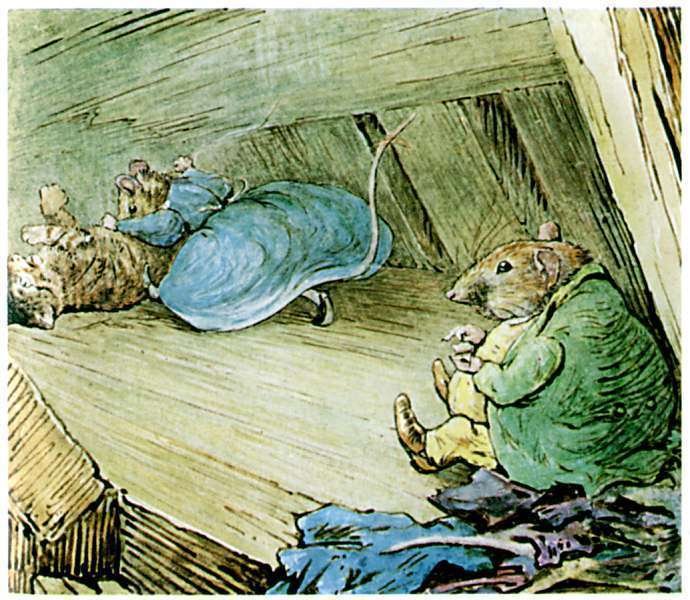
【54ページ】

"No," said Samuel Whiskers, "make it properly, Anna Maria, with breadcrumbs."
「うんにゃ。」と ちょびひげサミュエル、「ちゃんと作るにゃ パン粉もな。」
【55ページ】
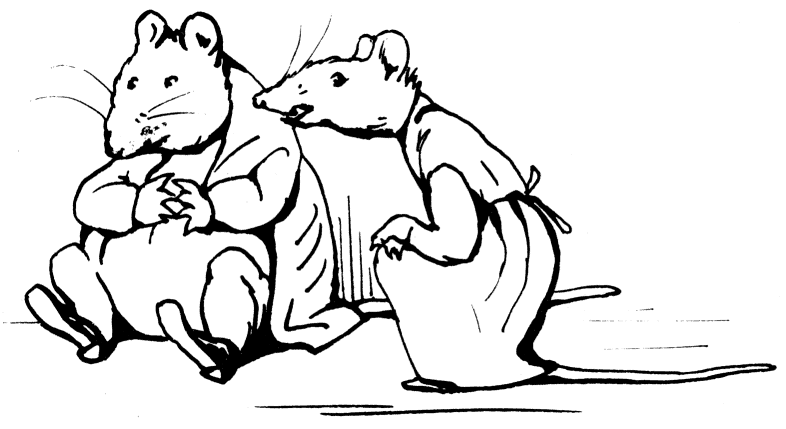
"Nonsense! Butter and dough," replied Anna Maria.
「バカらし!バターとパンだねでじゅうぶん。」と かえすアナ=マライ。
【56-57ページ】
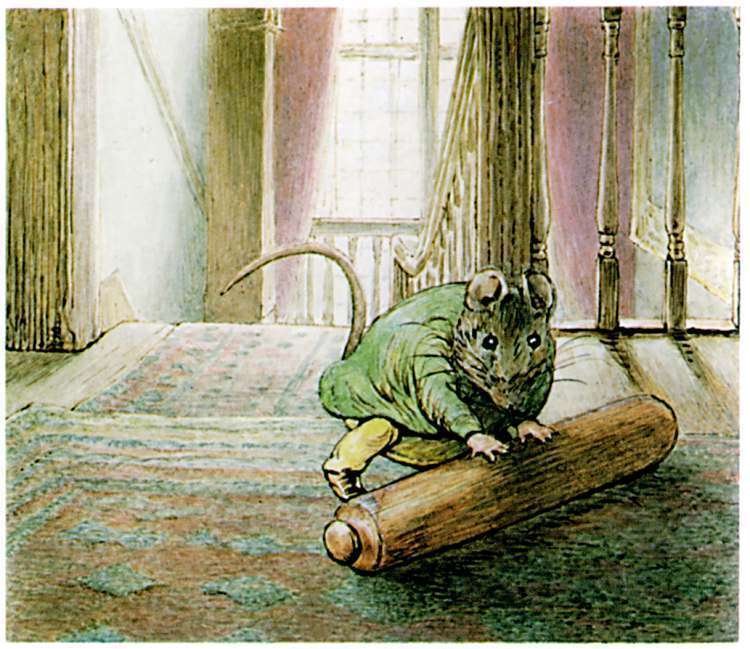
The two rats consulted together for a few minutes and then went away.
Samuel Whiskers got through a hole in the wainscot, and went boldly down the front staircase to the dairy to get the butter. He did not meet anybody.
He made a second journey for the rolling-pin. He pushed it in front of him with his paws, like a brewer's man trundling a barrel.He could hear Ribby and Tabitha talking, but they were busy lighting the candle to look into the chest.
They did not see him.
2ひきのネズミは 数分間話し合いをしてから 動き出しました。
ちょびひげサミュエルは かべ板のすきまをぬけて、あろうことか正面かいだんを下りて 牛乳おきばまでバターを取ってきます。だれにも合わずに。
そして のしぼうを取りにもう1ど。手で 前へごろごろと、ビールしょく人がたるをころがすように運ぶのです。
このネズミにも リービやタビサのおしゃべりが 耳に入りましたが、ふたりはロウソク片手にいしょう箱 見るので いっぱいいっぱい。
はち合わせもなし。
【58ページ】
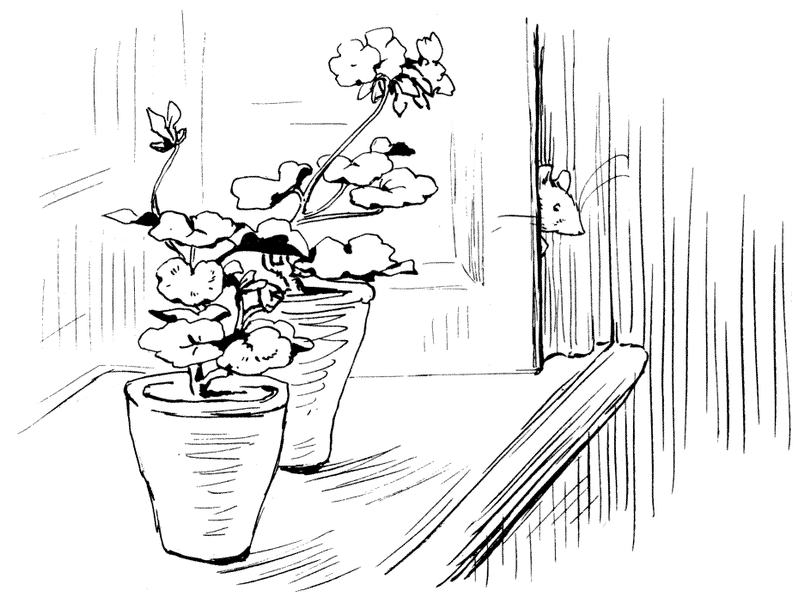
Anna Maria went down by way of the skirting-board and a window shutter to the kitchen to steal the dough.
すそ板やよろい戸を通って下へおりたアナ=マライアは パンだねをくすねます。
【59ページ】
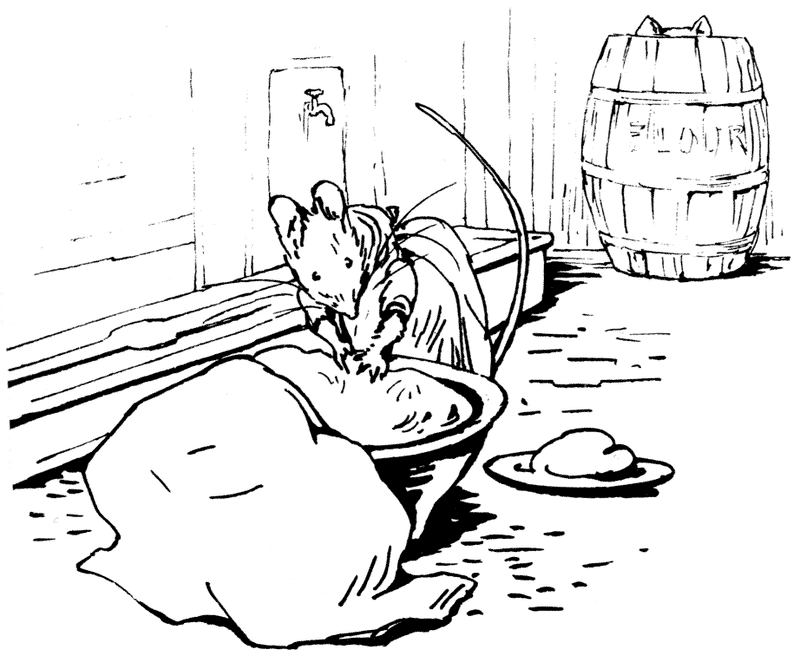
She borrowed a small saucer, and scooped up the dough with her paws.
She did not observe Moppet.
小皿をはいしゃくして ちいさな手でパンだねをすくいました。
モペットのことには気づかずに。
【60-61ページ】
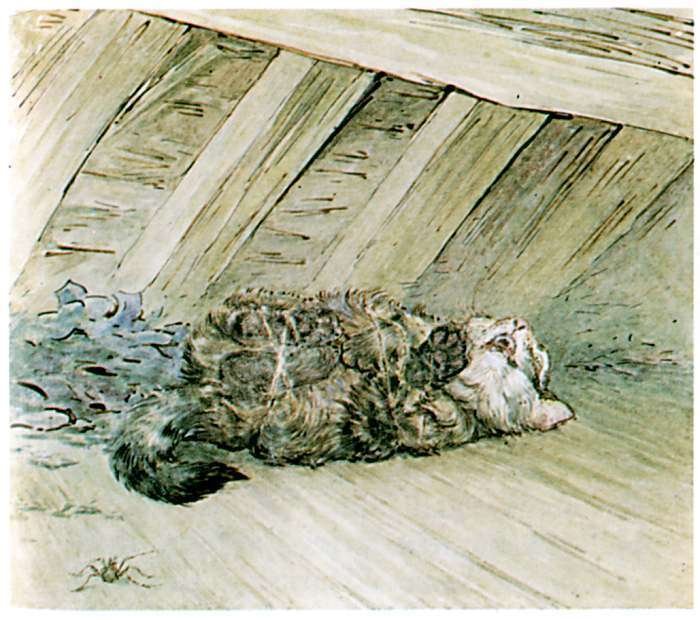
While Tom Kitten was left alone under the floor of the attic, he wriggled about and tried to mew for help.
But his mouth was full of soot and cobwebs, and he was tied up in such very tight knots, he could not make anybody hear him.
Except a spider, which came out of a crack in the ceiling and examined the knots critically, from a safe distance.
It was a judge of knots because it had a habit of tying up unfortunate blue-bottles. It did not offer to assist him.
Tom Kitten wriggled and squirmed until he was quite exhausted.
屋根うら部屋のゆか下に転がされたままの ねこぬこタムはのたうちながら みゃあみゃあ助けをよぼうとしました。
けれども 口はススとクモのすにまみれて、きつくしばられてもいるので、 だれにも声はとどきません。
と思いきや クモが天井のさけめから出てきて高見の見物、むすび目をねぶみするようにたしかめます。
そのクモも あわれアオバエを日々しばってましたから かなりもつれからんでいるとわかりました。助けの手をさしだすことはありません。
ねこぬこタムは みをよじってなきわめいたものの、とうとうくたびれはててしまいます。
【62ページ】
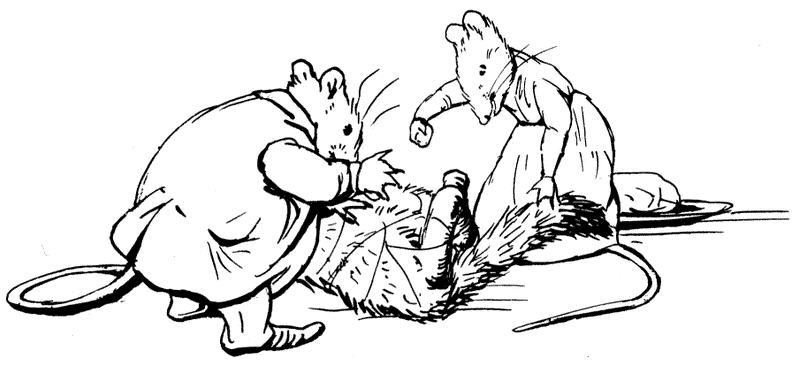
Presently the rats came back and set to work to make him into a dumpling. First they smeared him with butter, and then they rolled him in the dough.
"Will not the string be very indigestible, Anna Maria?" inquired Samuel Whiskers.
まもなくひきかえしてくるネズミたち、ネコをねりこみにかかりました。 まずバターをぬりつけ、それからパンだねをまきつけます。
「ひもはおなかでこなれんのじゃないか、アナ=マライア?」とたずねる ちょびひげサミュエル。
【63ページ】
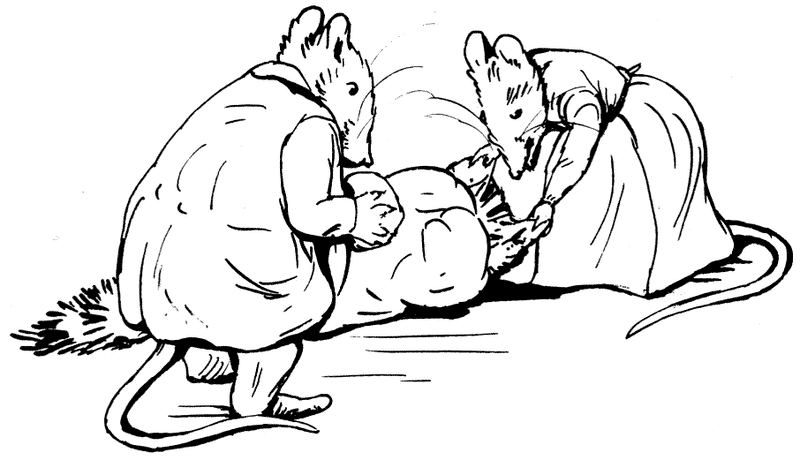
Anna Maria said she thought that it was of no consequence; but she wished that Tom Kitten would hold his head still, as it disarranged the pastry. She laid hold of his ears.
アナ=マライアは そんなの大したことないとあしらって 生地がくずれてはこまると ねこぬこタムの頭をおさえにかかりました。両耳をひっつかみます。
【64-65ページ】
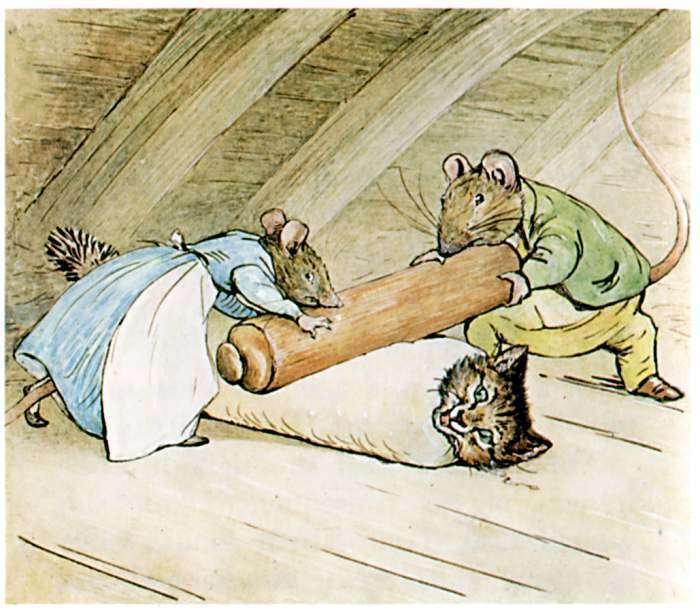
Tom Kitten bit and spat, and mewed and wriggled; and the rolling-pin went roly-poly, roly; roly, poly, roly. The rats each held an end.
"His tail is sticking out! You did not fetch enough dough, Anna Maria."
"I fetched as much as I could carry," replied Anna Maria.
"I do not think"—said Samuel Whiskers, pausing to take a look at Tom Kitten—"I do not think it will be a good pudding. It smells sooty."
Anna Maria was about to argue the point, when all at once there began to be other sounds up above—the rasping noise of a saw; and the noise of a little dog, scratching and yelping!
ねこぬこタムはかみつき、つばをはき、わめいてもがきました。そこへ のしぼうでまきまきねこまきねこねりまき。ネズミたちは それぞれ両はしをつかみつつ。
「しっぽがはみ出とるな!これじゃパンだねが足りんぞ、アナ=マライ。」
「持てるだけ取ってきたのよ。」とかえすアナ=マライア。
「これじゃあ、」――じっとねこぬこタムを見すえる ちょびひげサミュエル――「おいしいパンはできんぞ。ススくさくてたまらん。」
その言いぐさに アナ=マライアがくいかかろうとしたそのとき、だしぬけに 頭上からべつの物音が聞こえてきます――のこぎりの りごりという音で それからひっかきながらわんわんほえる子犬の声も!
【66ページ】
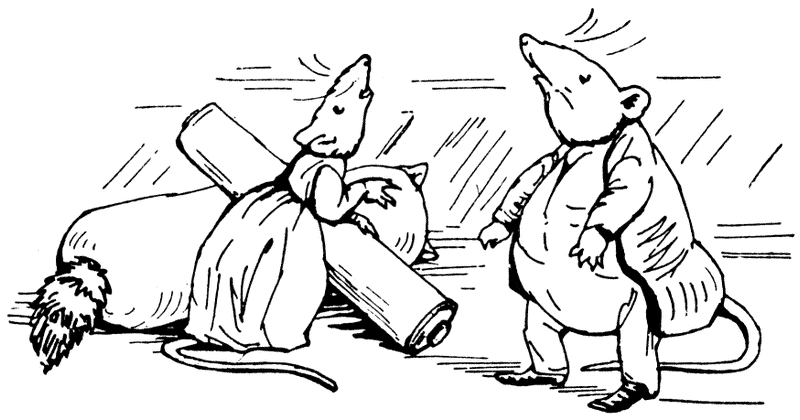
The rats dropped the rolling-pin, and listened attentively.
"We are discovered and interrupted, Anna Maria; let us collect our property—and other people's,—and depart at once."
"I fear that we shall be obliged to leave this pudding."
ネズミたちは のしぼうをとりおとして耳をそばだてます。
「見つかったんじゃあ、こっちへ来るぞ、アナ=マライア。うちらのにもつをまとめて ――よそのものもだ―― そんで すぐに出て行くんじゃ。」
「それじゃ このパンおきっぱなしになっちゃうじゃない。」
【67ページ】

"But I am persuaded that the knots would have proved indigestible, whatever you may urge to the contrary."
"Come away at once and help me to tie up some mutton bones in a counterpane," said Anna Maria. "I have got half a smoked ham hidden in the chimney."
「だが ひもでおなかこわすのは めんじゃからな、おしきろうとしてもむだじゃあ。」
「とっとと来てかけぶとんの上の羊のほねまとめるの 手をかしなさいnな。」とアナ=マライア。「えんとつにかくしてた くんせいハム半分も 取ってこないと。」
【68ページ】
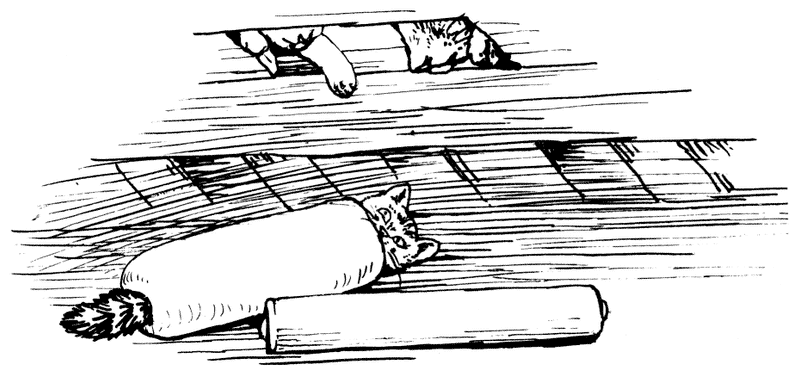
So it happened that by the time John Joiner had got the plank up—there was nobody under the floor except the rolling-pin and Tom Kitten in a very dirty dumpling!
こういうわけで たてぐやジョンが板を外したときには あいにく――ゆか下はもぬけのから、ただ のしぼうとまきまきされてススだらけのねこぬこタムだけがあったというしだい。
【69ページ】
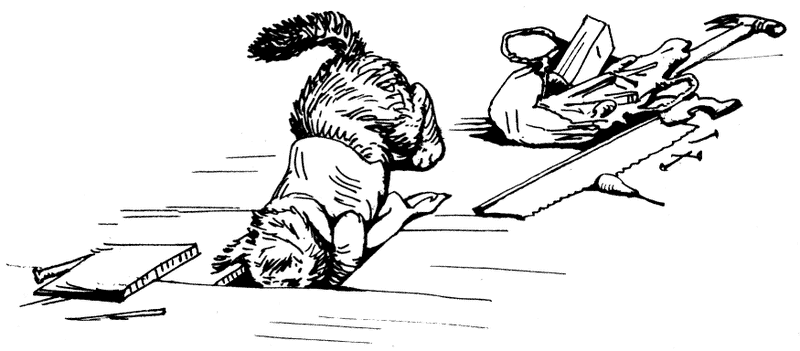
But there was a strong smell of rats; and John Joiner spent the rest of the morning sniffing and whining, and wagging his tail, and going round and round with his head in the hole like a gimlet.
とはいえ ネズミののこりがもきつくて、たてぐやジョンは午前のうちずっとくんくんわんわんしっぱなし、しっぽをふりふりねじきりのように 頭を 中心にぐるぐる。
【70-71ページ】

Then he nailed the plank down again and put his tools in his bag, and came downstairs.
The cat family had quite recovered. They invited him to stay to dinner.
The dumpling had been peeled off Tom Kitten, and made separately into a bag pudding, with currants in it to hide the smuts.
They had been obliged to put Tom Kitten into a hot bath to get the butter off.
John Joiner smelt the pudding; but he regretted that he had not time to stay to dinner, because he had just finished making a wheel-barrow for Miss Potter, and she had ordered two hen-coops.
そのあと ふたたび板を打ち直して、道具をかばんにつめこみ、かいだんを 下りてきました。
ネコの家族も まったくもとどおり。 みんなして犬さんをごちそうにおさそいします。
まかれた生地を ねこぬこタムからひっぺがして、小分けしてかしパンにしてあったのですが、ススよごれをごまかすためのほしブドウ入りでした。
さらには ねこぬこタムをおふろに入れて バターをぬぐわないといけなくて。
パンのにおいにたてぐやジョンのおはなもひくひくしましたが、ざんねんながら ごちそうをおよばれするひまがなくって。というのも ポッターさんのにぐるまを作りおえたばかりなのに、さらに鳥かご2つを注文されてしまったのです。
【72-73ページ】
And when I was going to the post late in the afternoon—I looked up the lane from the corner, and I saw Mr. Samuel Whiskers and his wife on the run, with big bundles on a little wheel-barrow, which looked very like mine.
They were just turning in at the gate to the barn of Farmer Potatoes.
Samuel Whiskers was puffing and out of breath. Anna Maria was still arguing in shrill tones.
She seemed to know her way, and she seemed to have a quantity of luggage.
I am sure I never gave her leave to borrow my wheel-barrow!
さあて わたしが午後おそく ポストのところへ出かけたおりのこと――角から小道をのぞきこむと、ちょびひげサミュエルとおくさんが かけてゆくのが目に入りましてね、ちいさなにぐるまにめいっぱいにもつをつんでいたのですけれども、あのにぐるま もしかしてわたしのじゃないかしら。
ちょびひげサミュエルは ぜえはあいきぎれ、アナ=マライアはずっときいきいわめいていました。
どうもおくさんに土地かんがあるらしく、にもつもたっぷりあるようです。
わたしのにぐるまをかりてもいいなんて言ったおぼえはちっともないんですけど!

【74ページ】
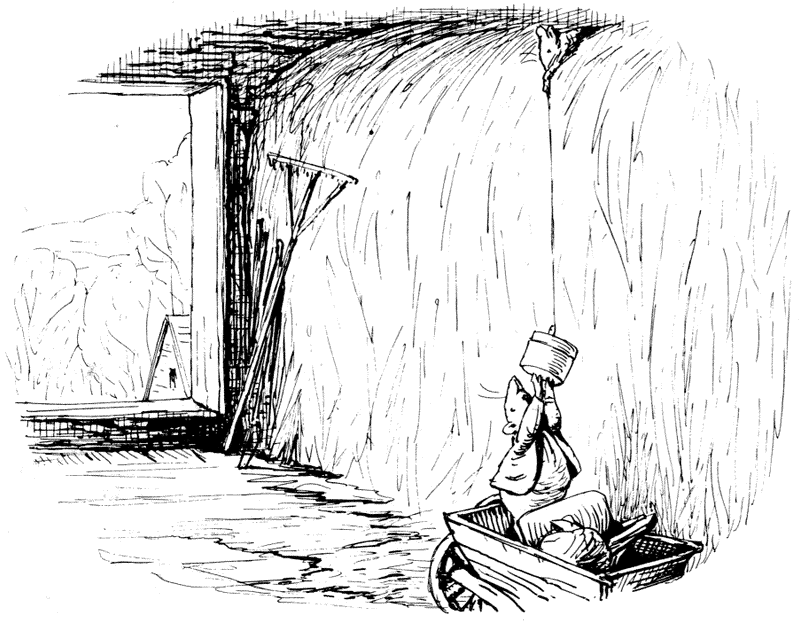
They went into the barn, and hauled their parcels with a bit of string to the top of the hay mow.
2ひきは なやに入るとつなを使ってにもつをほし草の山の上へと引き上げました。
【75ページ】

After that, there were no more rats for a long time at Tabitha Twitchit's.
そのあと ぐいぐいタビサのところへは しばらく ネズミはあらわれないのでした。
【76-77ページ】
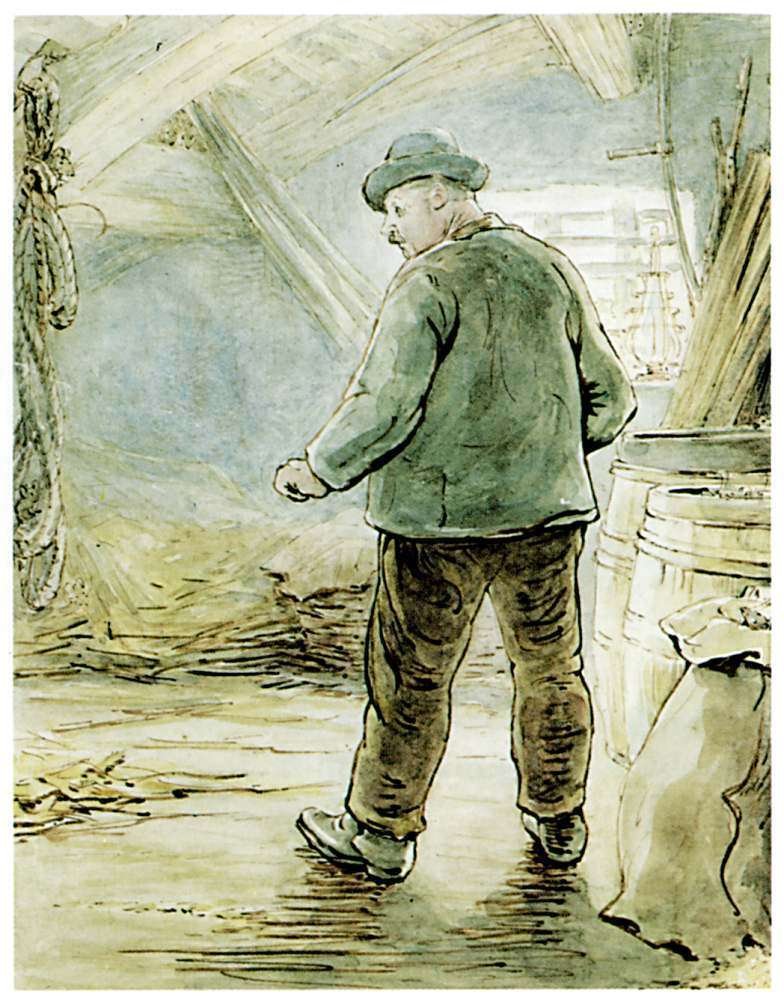
As for Farmer Potatoes, he has been driven nearly distracted. There are rats, and rats, and rats in his barn! They eat up the chicken food, and steal the oats and bran, and make holes in the meal bags.
And they are all descended from Mr. and Mrs. Samuel Whiskers—children and grand-children and great great grand-children.
There is no end to them!
かわりに住みつかれたのらっこポテトーズさんのほうは、もうおかしくなりそうで。なやにはネズミ、ネズミ、ここにも大きなイエネズミ!ニワトリのえさを食いつくすわ、カラスムギやふすまをくすねるわ、エサぶくろに穴をあけまくるわで。
それに こいつらみんなちょびひげサミュエルのししそんそん――子どもに まごにひまごまで。
もう きりがありません!
【78-79ページ】
Moppet and Mittens have grown up into very good rat-catchers.
They go out rat-catching in the village, and they find plenty of employment. They charge so much a dozen, and earn their living very comfortably.
大人になったモペットとミトンズは ネズミとりのたくみとなりました。
村を回って ネズミとりをすると言えば引き合いがたくさん見つかりまして。けっこうたくさんうけおいますからゆうゆうくらせるくらいにはかぜげました。
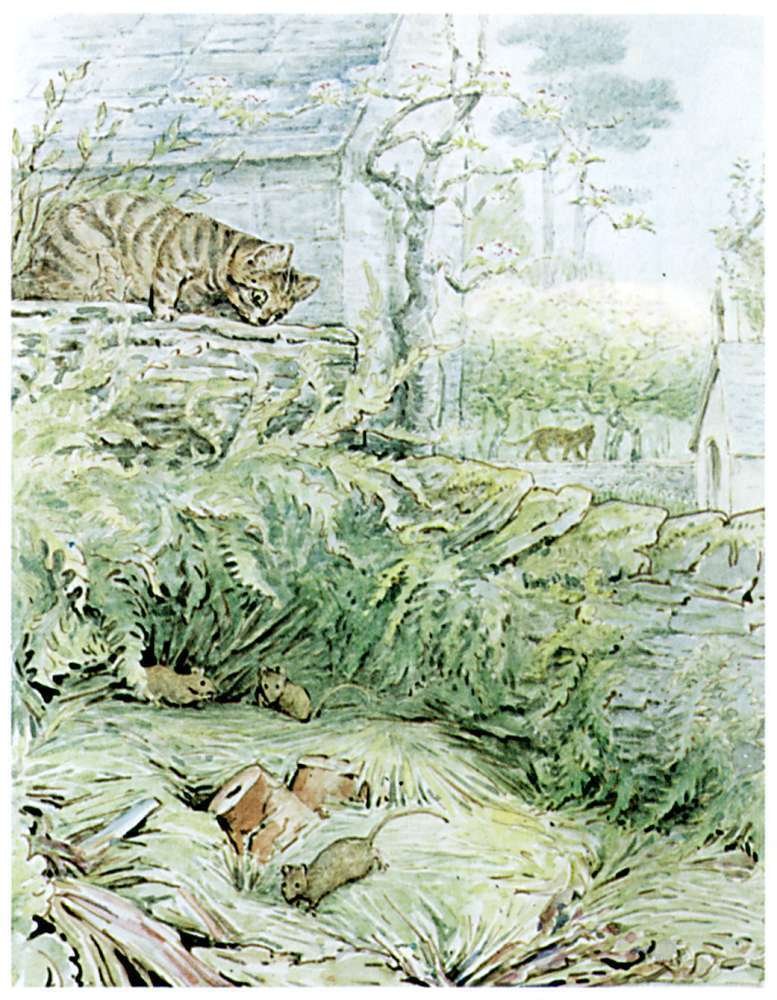
【80ページ】
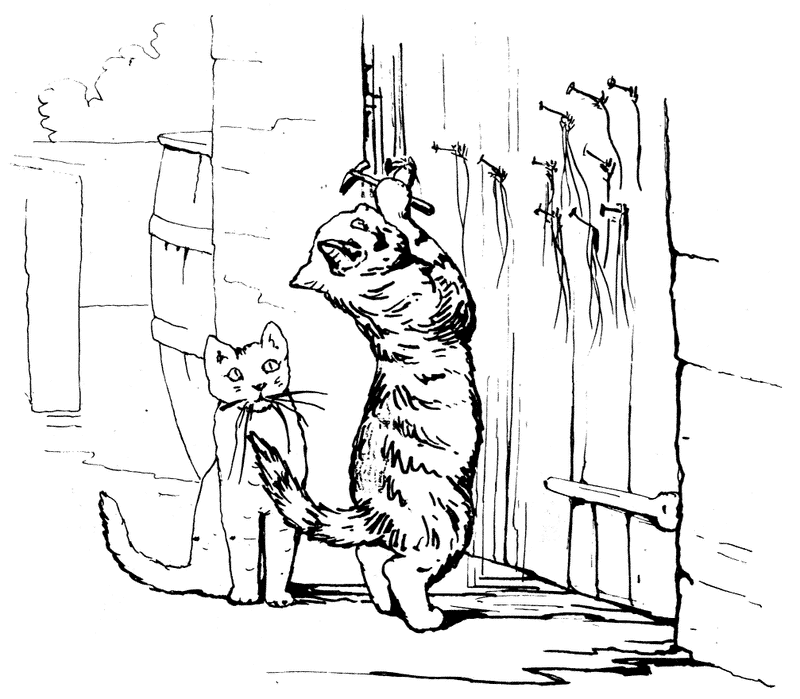
They hang up the rats' tails in a row on the barn door, to show how many they have caught—dozens and dozens of them.
なやの戸に ずらりとネズミのしっぽをつりさげて つまかえた数を示します――それこそ何十何十と。
【81ページ】
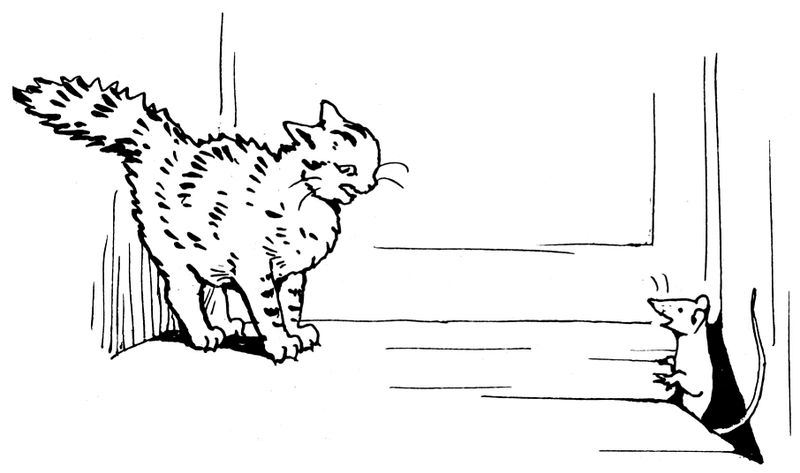
But Tom Kitten has always been afraid of a rat; he never durst face anything that is bigger than—
でも ねこぬこタムはいつまでたってもイエネズミにびっくびく、自分から 顔を合わせるとしても ずいぶんちいさな――
【82ページ】
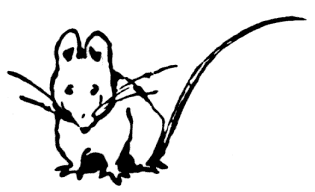
A ;Mouse.
ハツカネズミだけでした。
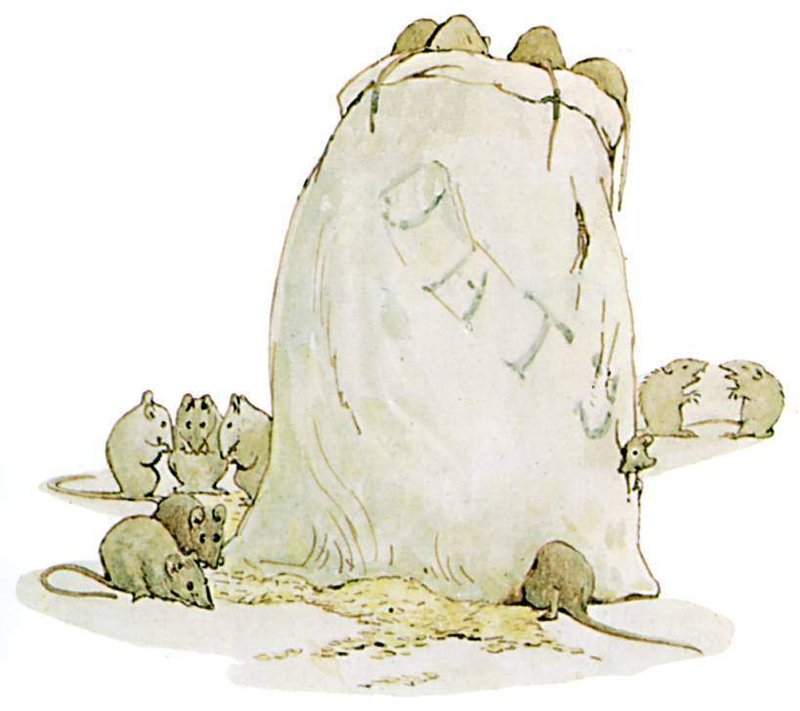
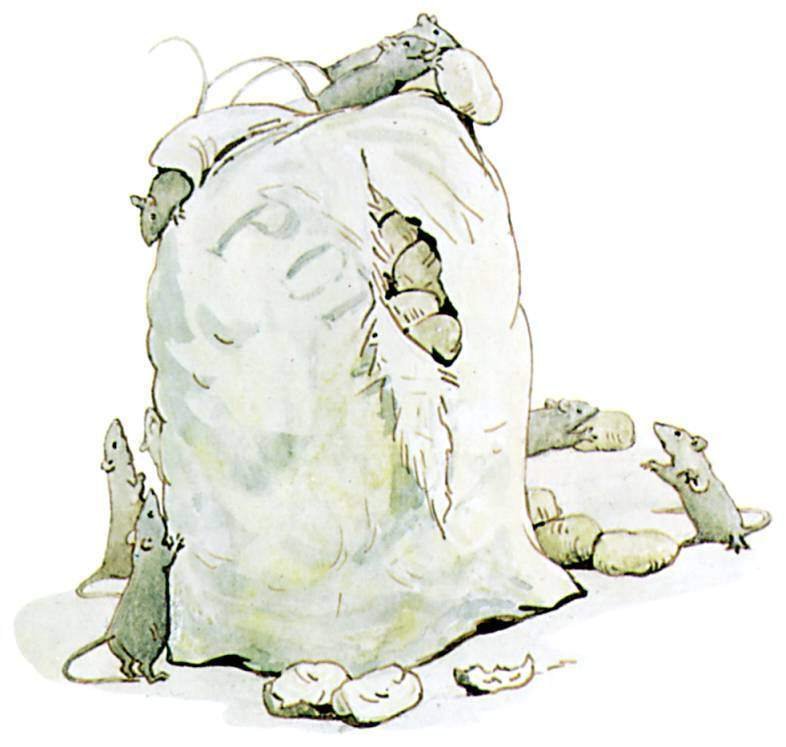
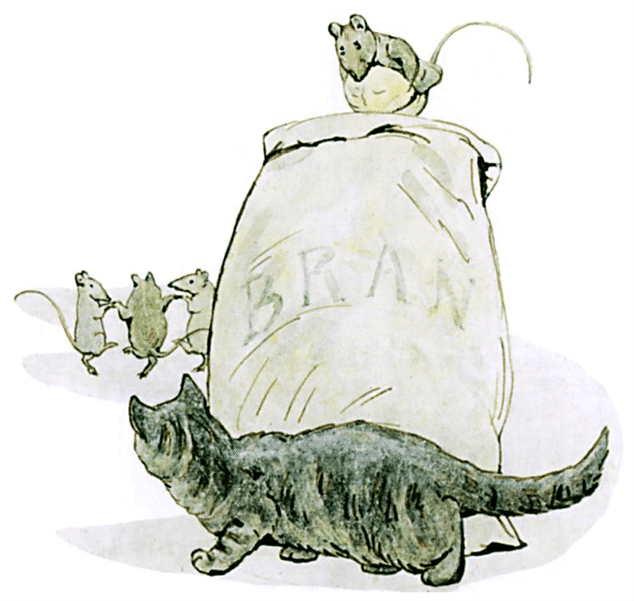
(おしまい)
解説
この話の副題であり、当初の題名であったThe Roly-Poly Puddingというと、英国ではジャムをいれたロールケーキ(ジャム・ローリー・ポーリー)が思い浮かぶとのこと。学校給食で人気のデザートだったそうです。小麦粉とスーイットと呼ばれる牛脂、佐藤、牛乳で生地を作り、それを平たく伸ばして全体にジャムを塗り、くるくると巻いてクッキングシートでくるみ、さらにアルミフォイルで包んで蒸しあげるものとか。
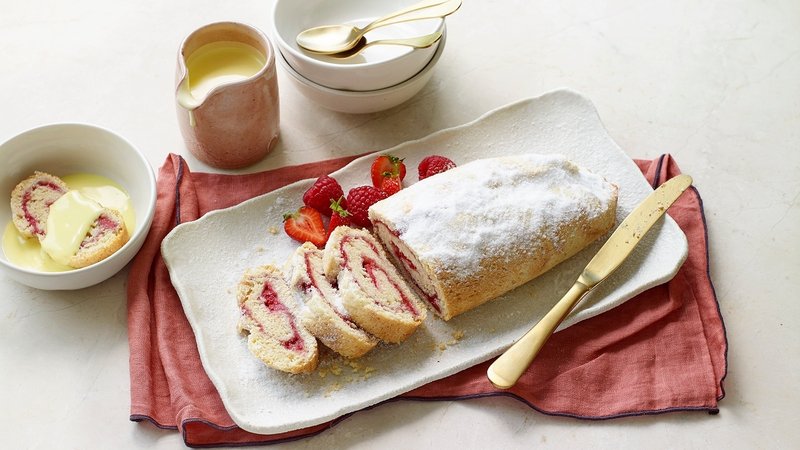
"The Tale of Samuel Whiskers by Beatrix Potter Analysis"は、この作品を以下のように解説している。
「ピーターラビット・シリーズは、野生の動物のドキュメンタリーを観ているような感覚をあたえ、ライオンを見ていればライオンを応援するだろうし、鹿を見ていれば鹿を応援し、それを殺すライオンに怒りを覚えるものである。
”The Tale of Samuel Whiskers”は、”The Tale of Jonny Town-mouse”とは逆に「ネコ」に同情を寄せるような話となっている。
この話は、狭い空間に閉じ込められる怖さを描いている。Beatrix Potterが誕生した1866年ころは、煙突掃除で小さな子供を使うことはまだ法律違反ではなかった。1875年に、12歳のGeorge Brewsterという子供が病院の煙突掃除をしていて挟まってしまい、窒息死をしたのを契機に法律が変えられた。BeatrixはこのGeorgeと同い年であった。
古い家で、厚い壁、その奥にあるかもしれない秘密の階段。チーズやベーコンが消えるなど、空間的なホラーが始まる。家そのものが怖いのではなく、空間的に謎の部分があることがホラーとなっている。そして、Tom Kittenが煙突の中で詰まってしまい、
最初に登場する、子どもたちを見つけられなくなる母親ネコ、Tabitha Twitchitは、"The Story of Miss Moppet", "The Tale of Tom Kitten"他にも登場している。
親と子供、
クラブハウスリプレイ
参考文献他
The Project Gutenbeg eBook of The Tale of Peer Rabbit, by Beatrix Potter
『あなうさピーターのはなし』、おおくぼゆう訳、青空文庫
The Project Gutenbeg eBook of The Tale of Benjamin Bunny, byBeatrix Potter
『ばにばにベンジャミンのはなし』、おおくぼゆう訳、青空文庫
『ピーターラビットの世界』、吉田新一、日本エディターズスクール出版部(1994)
『こどもに歯ごたえのある本を』、石井桃子談話集、石井桃子、河出書房新社(2015)
『ピーターラビット展ー出版120周年ー』、ビアトリクス・ポター(画)、河野芳英監修、世田谷美術館編集、朝日新聞社、東映(2022)
”The Tale of Peter Rabbit by Beatrix Potter Analysis, Slap, Happy Larry
Slap Happy Larry ”The Tle of S和えlWhiskers by Beatrix Potter Analysis
『出版120周年ピータ―ラビット展』監修河野芳英、発行朝日新聞社、東映、(2022)
(了)
この記事が気に入ったらサポートをしてみませんか?
